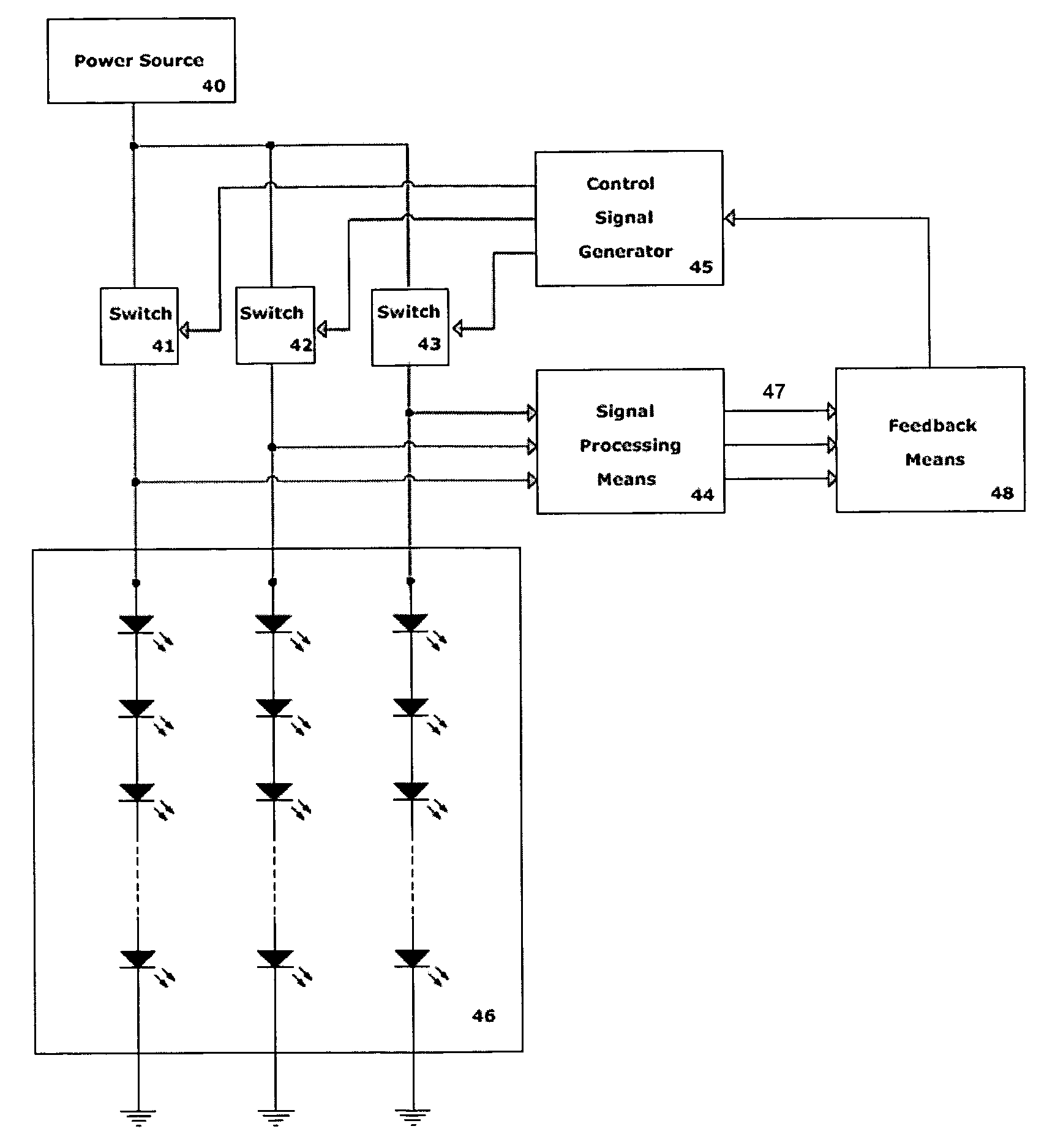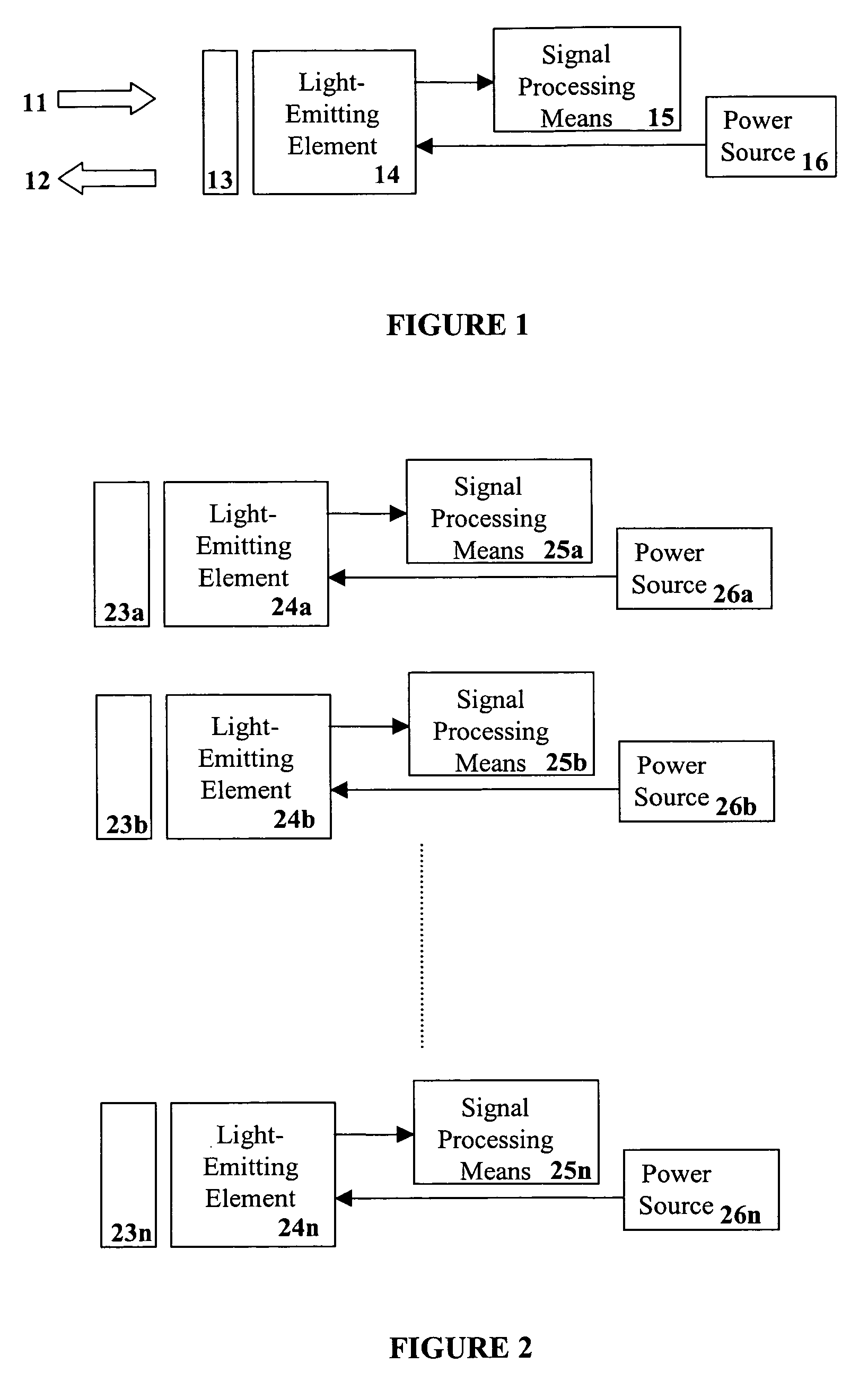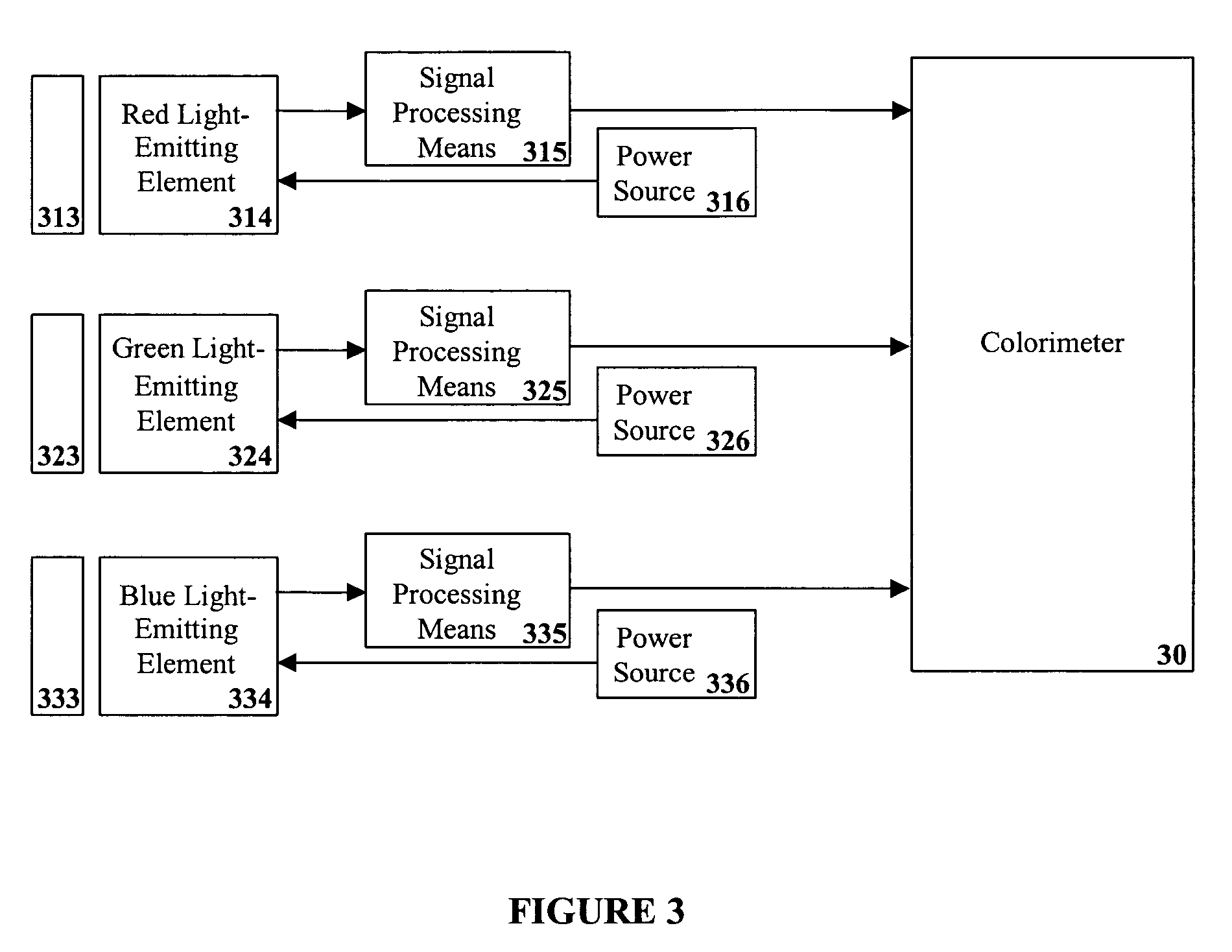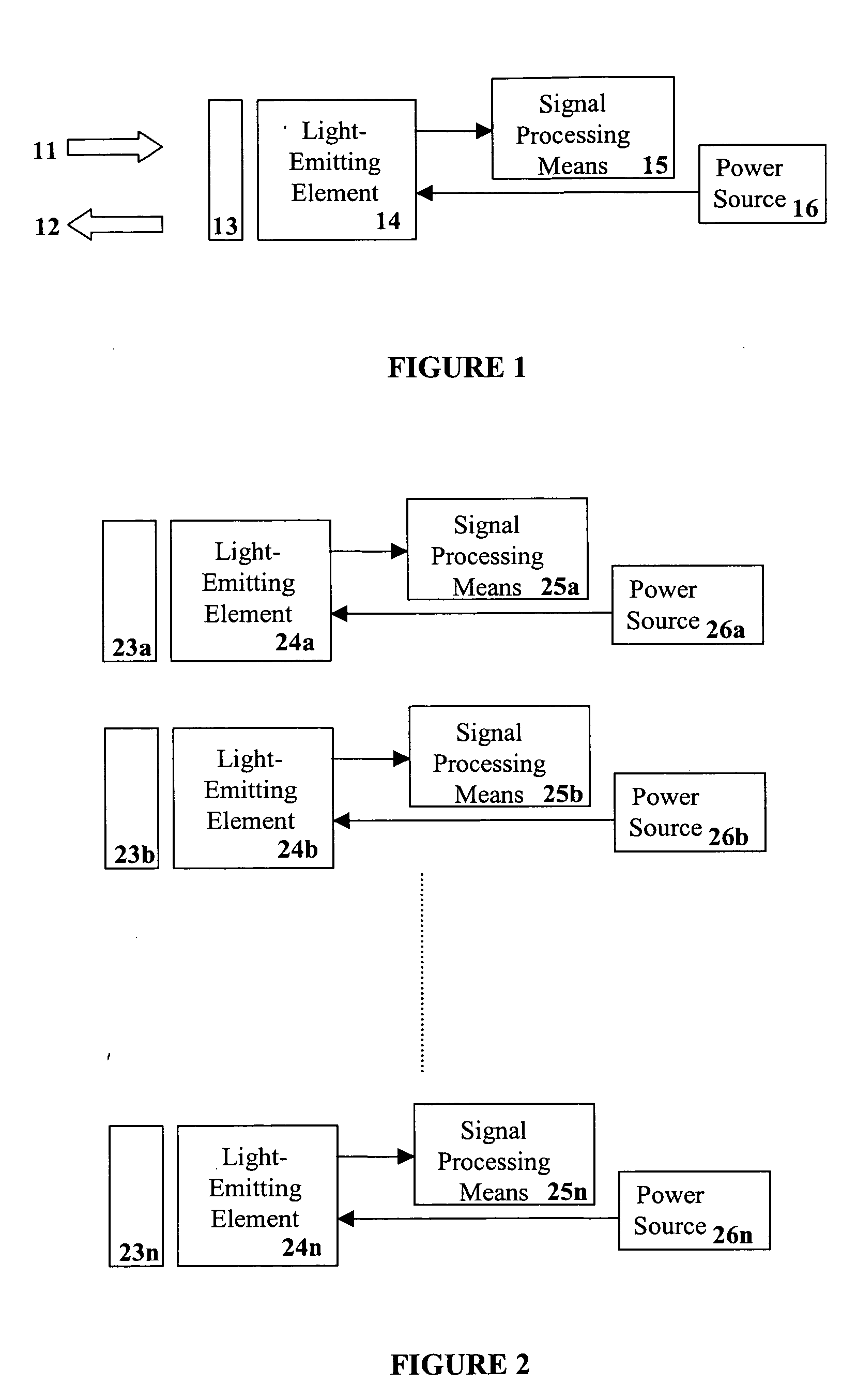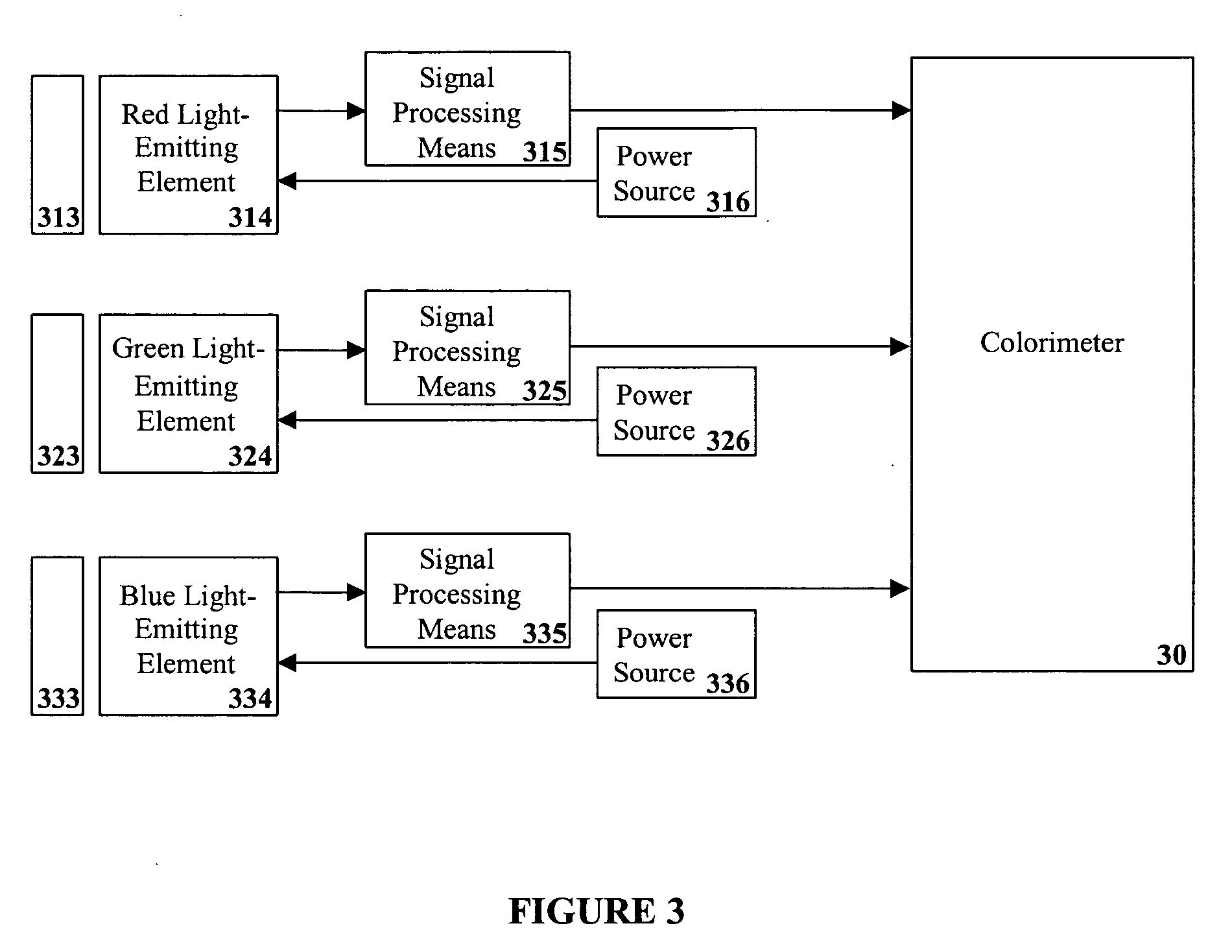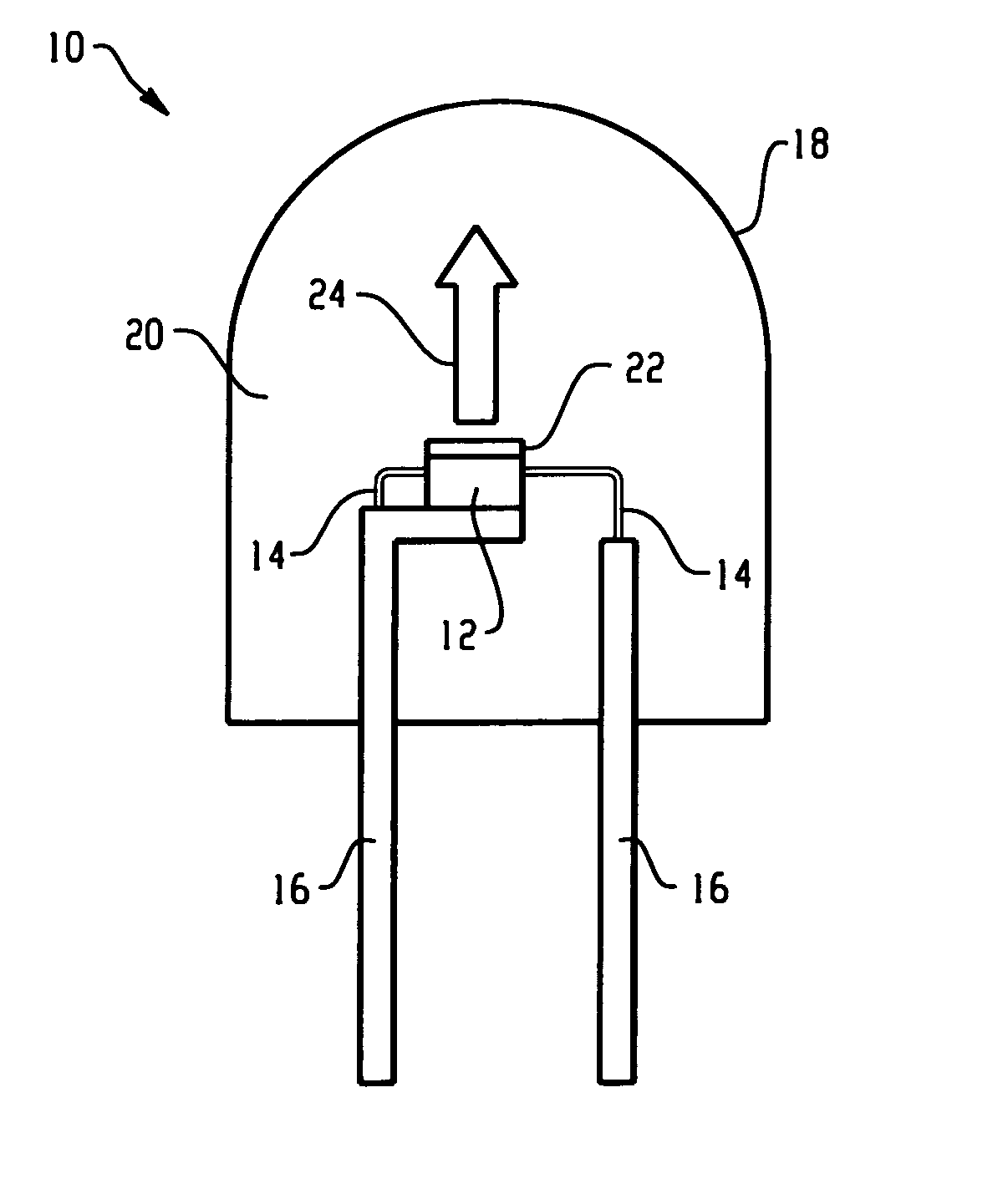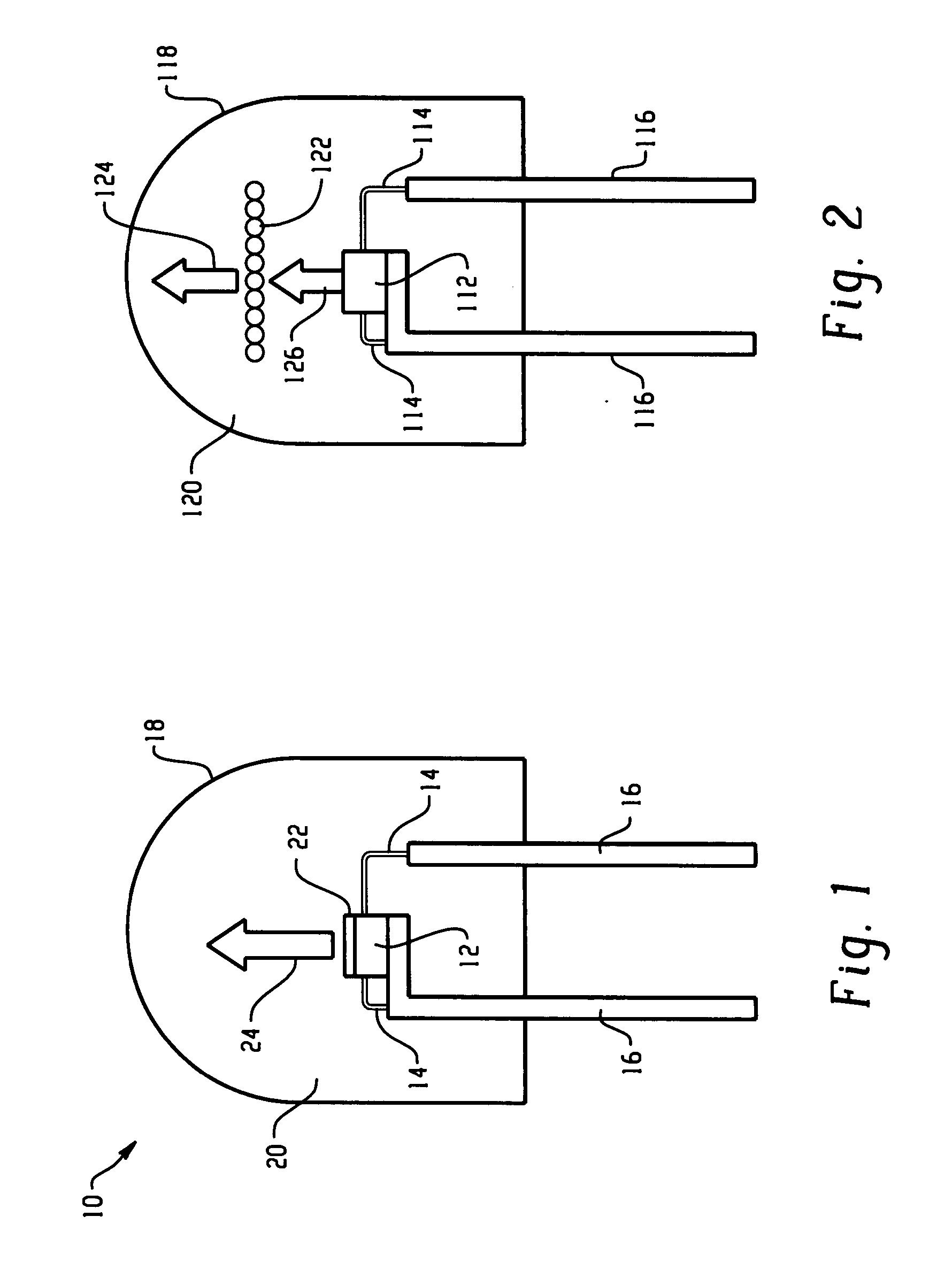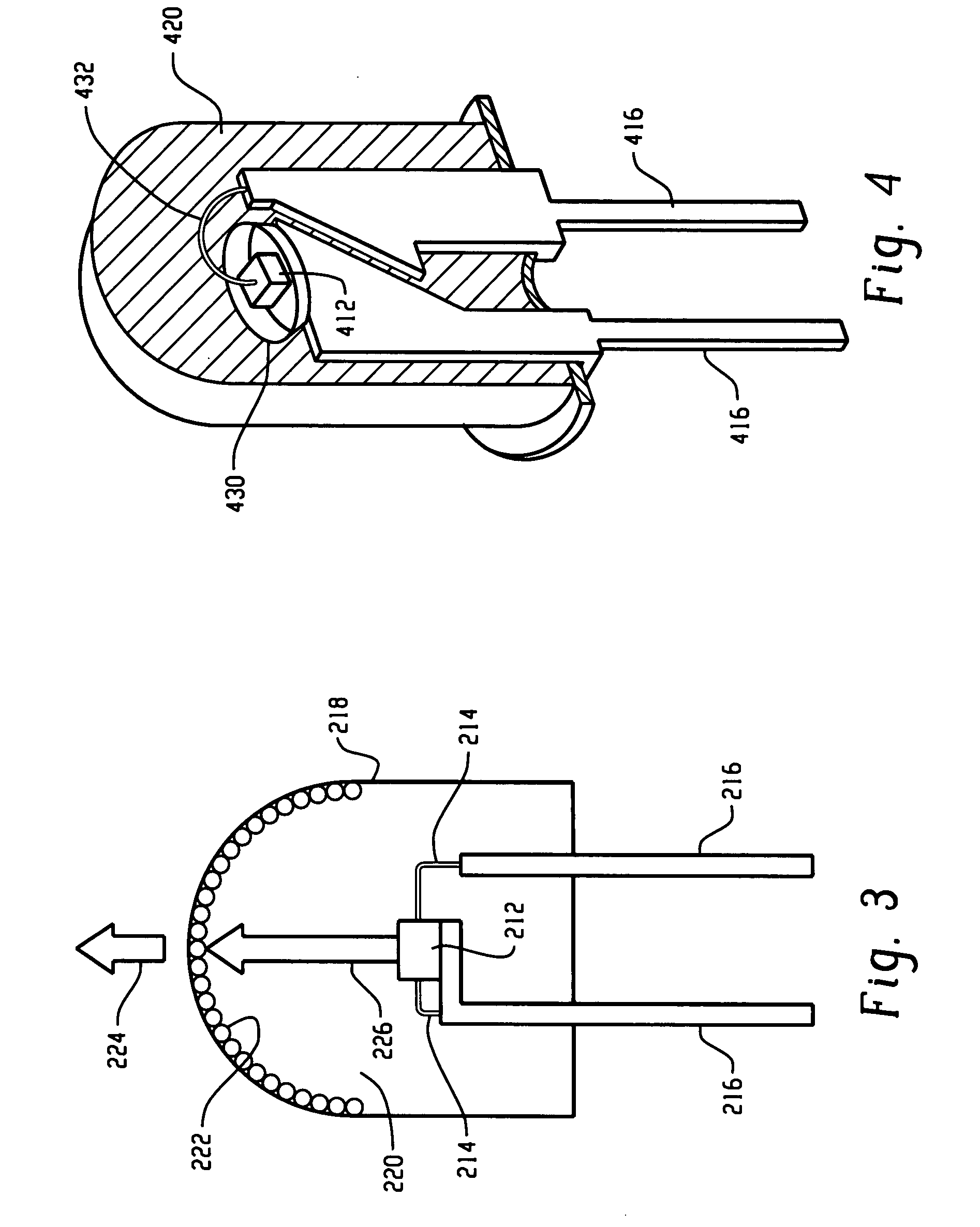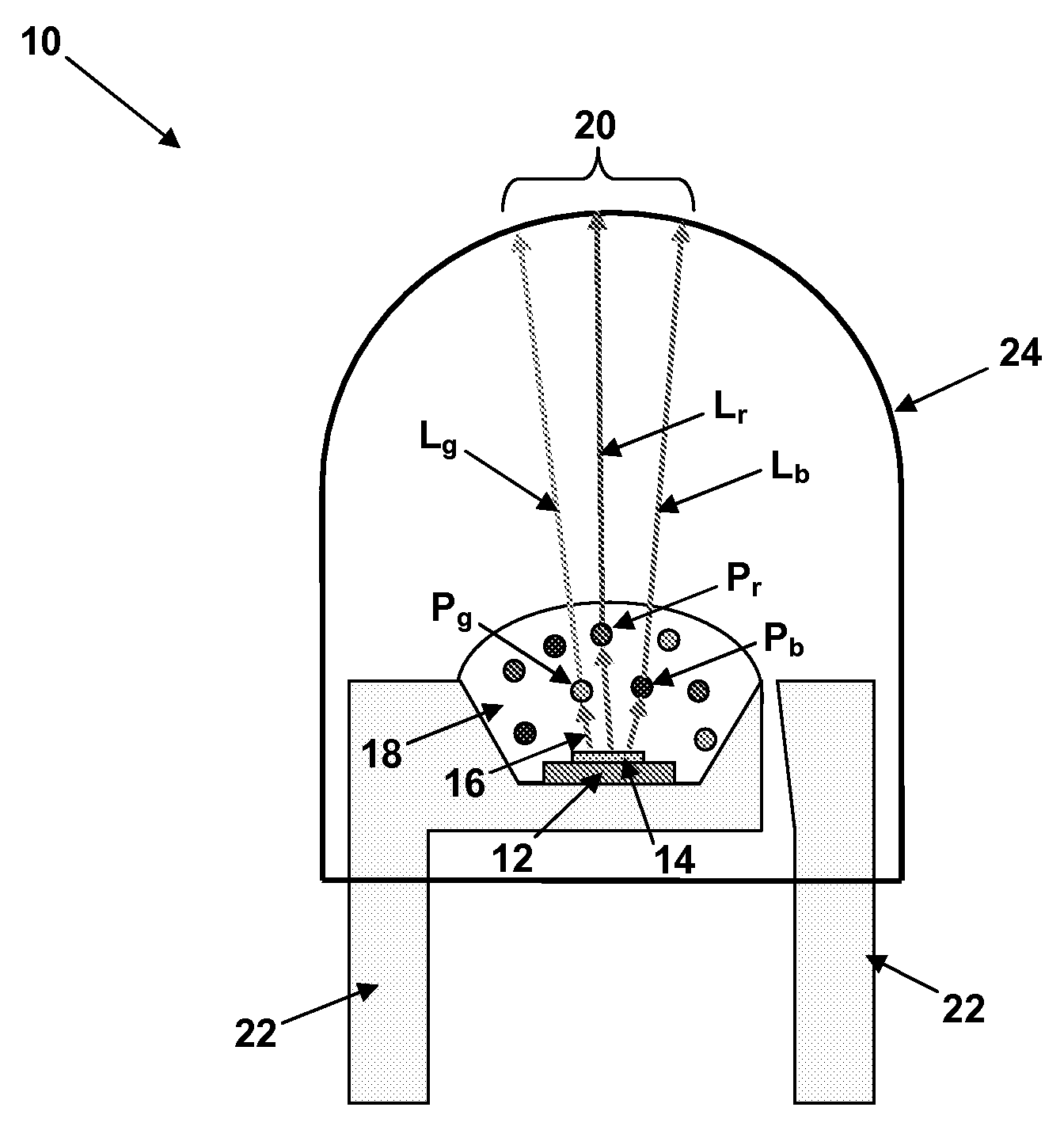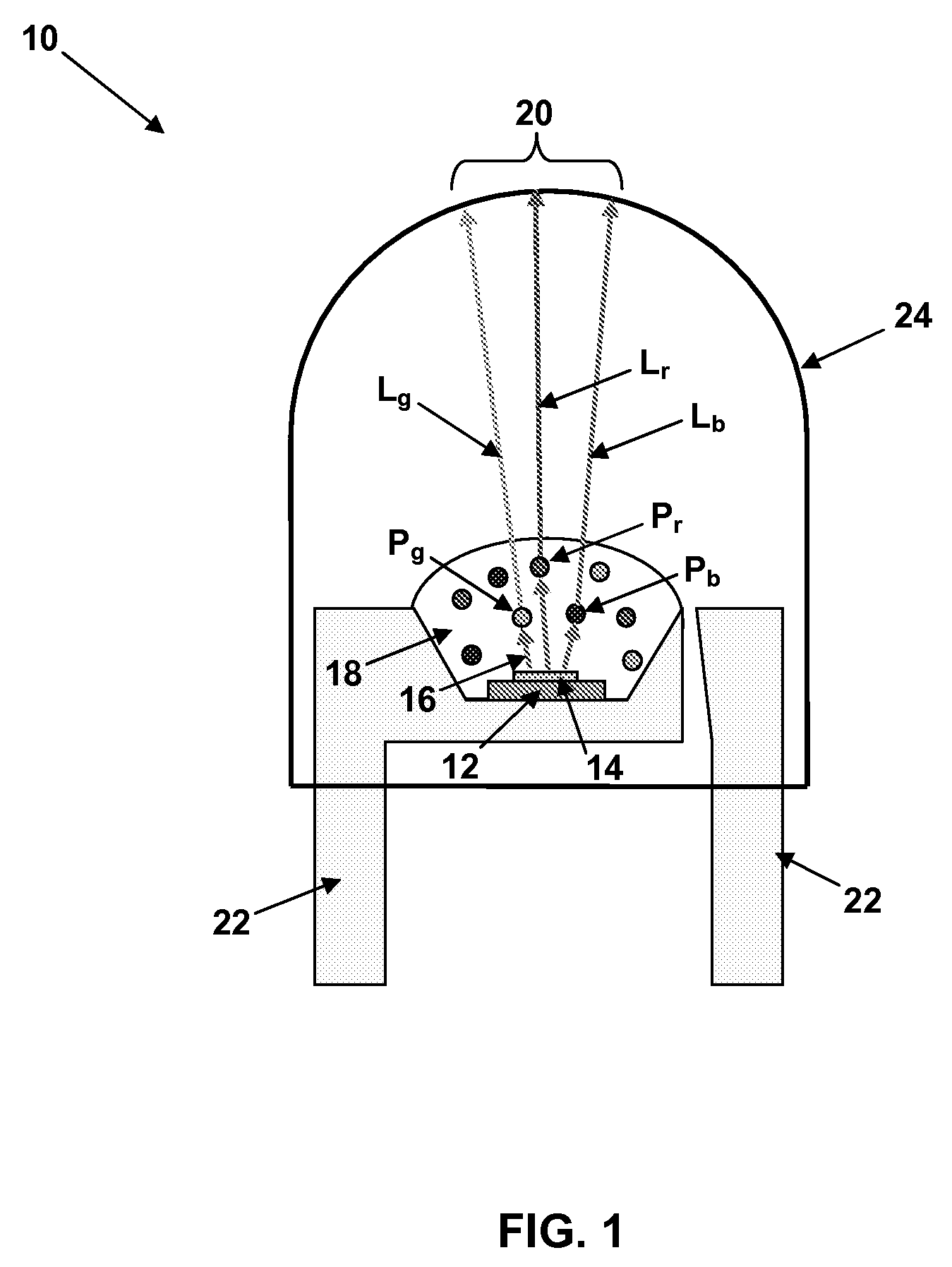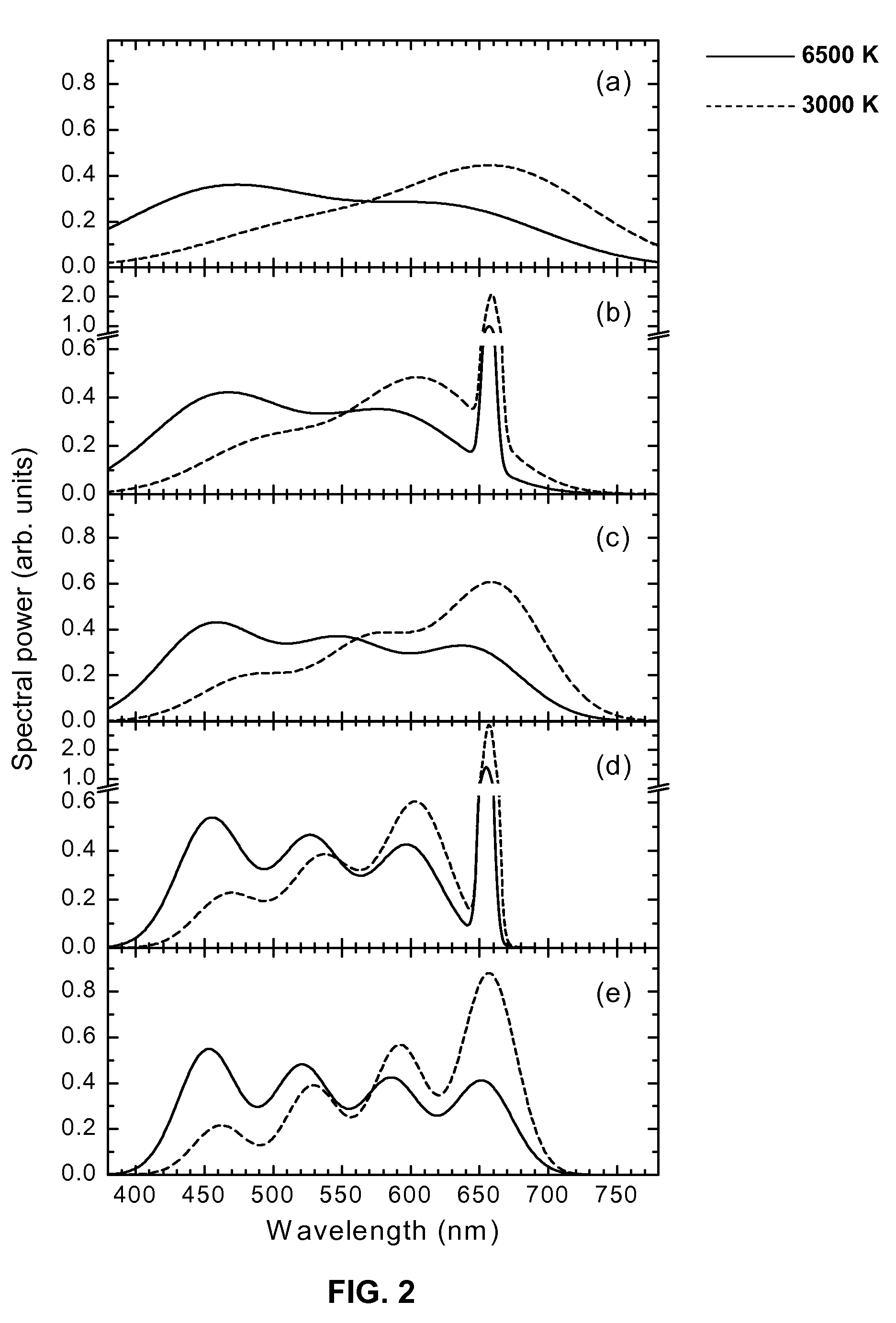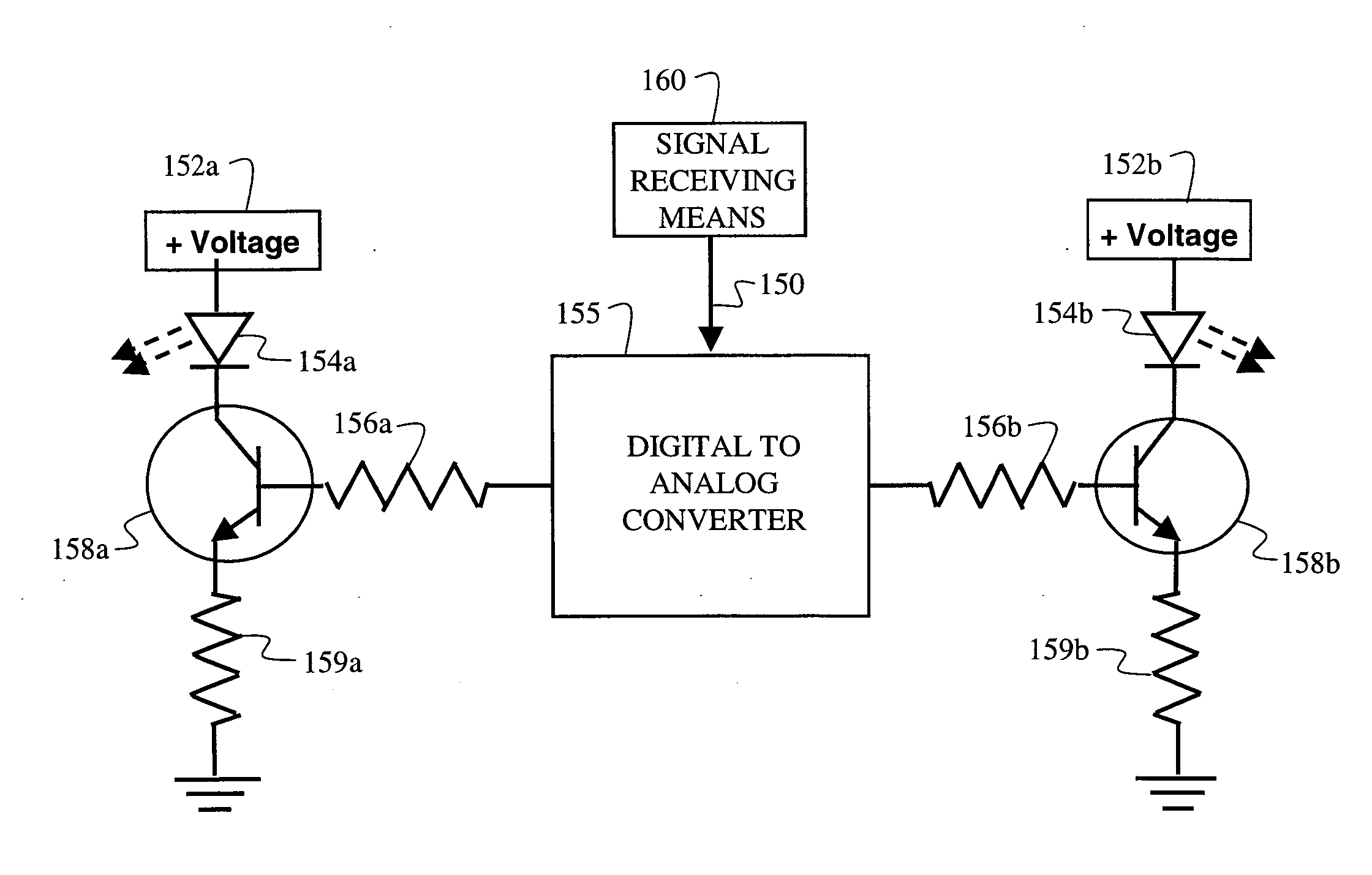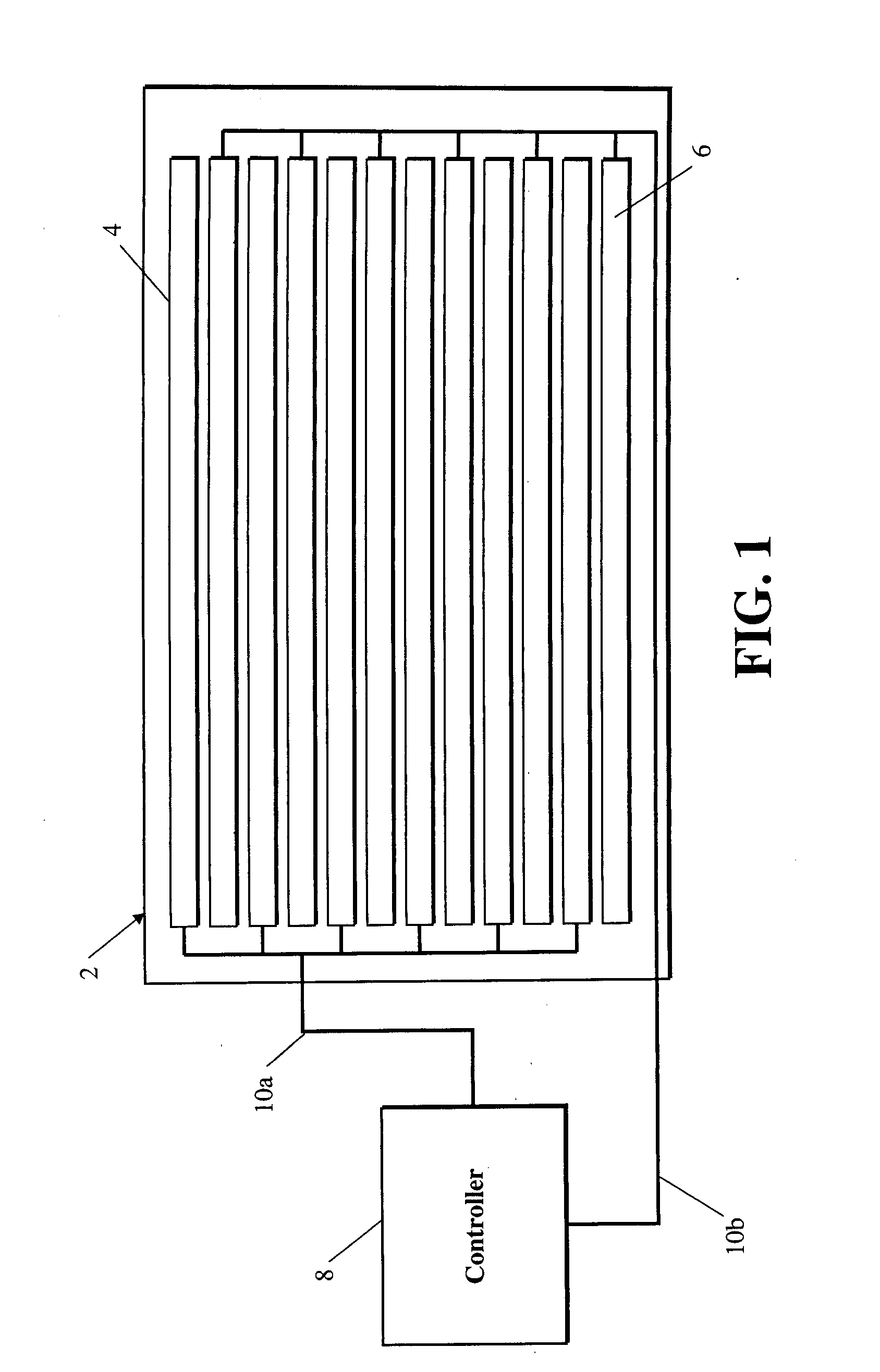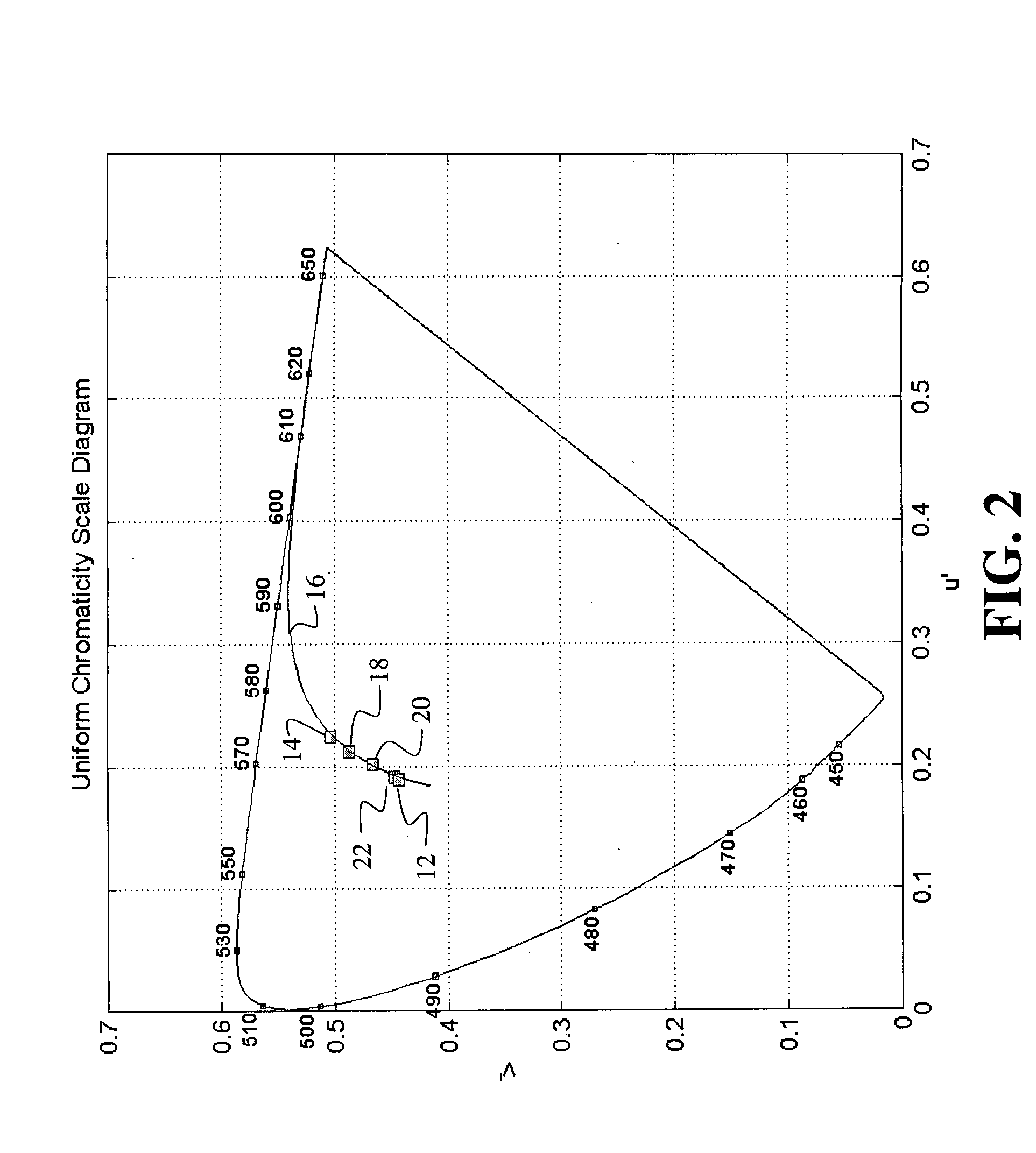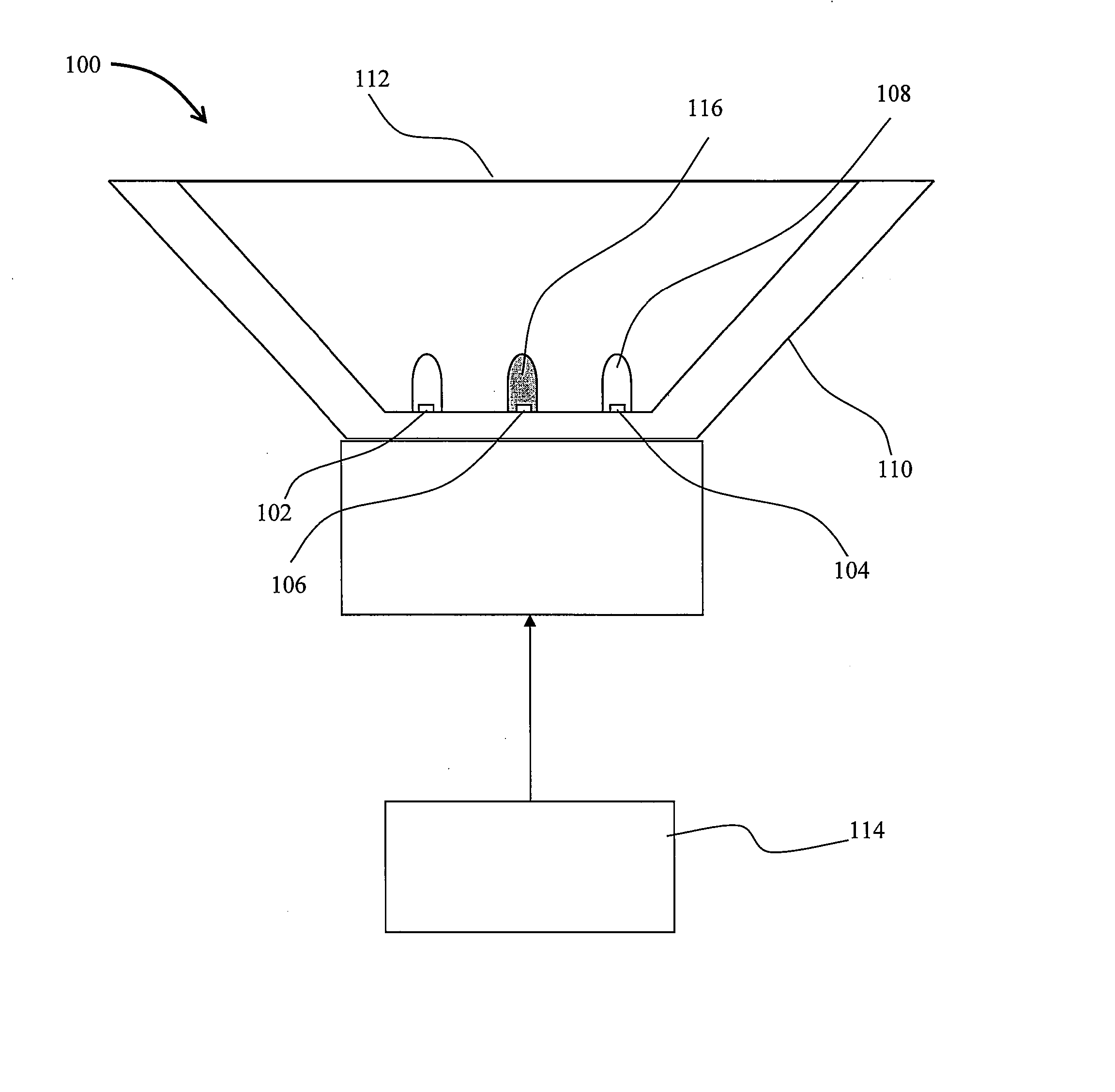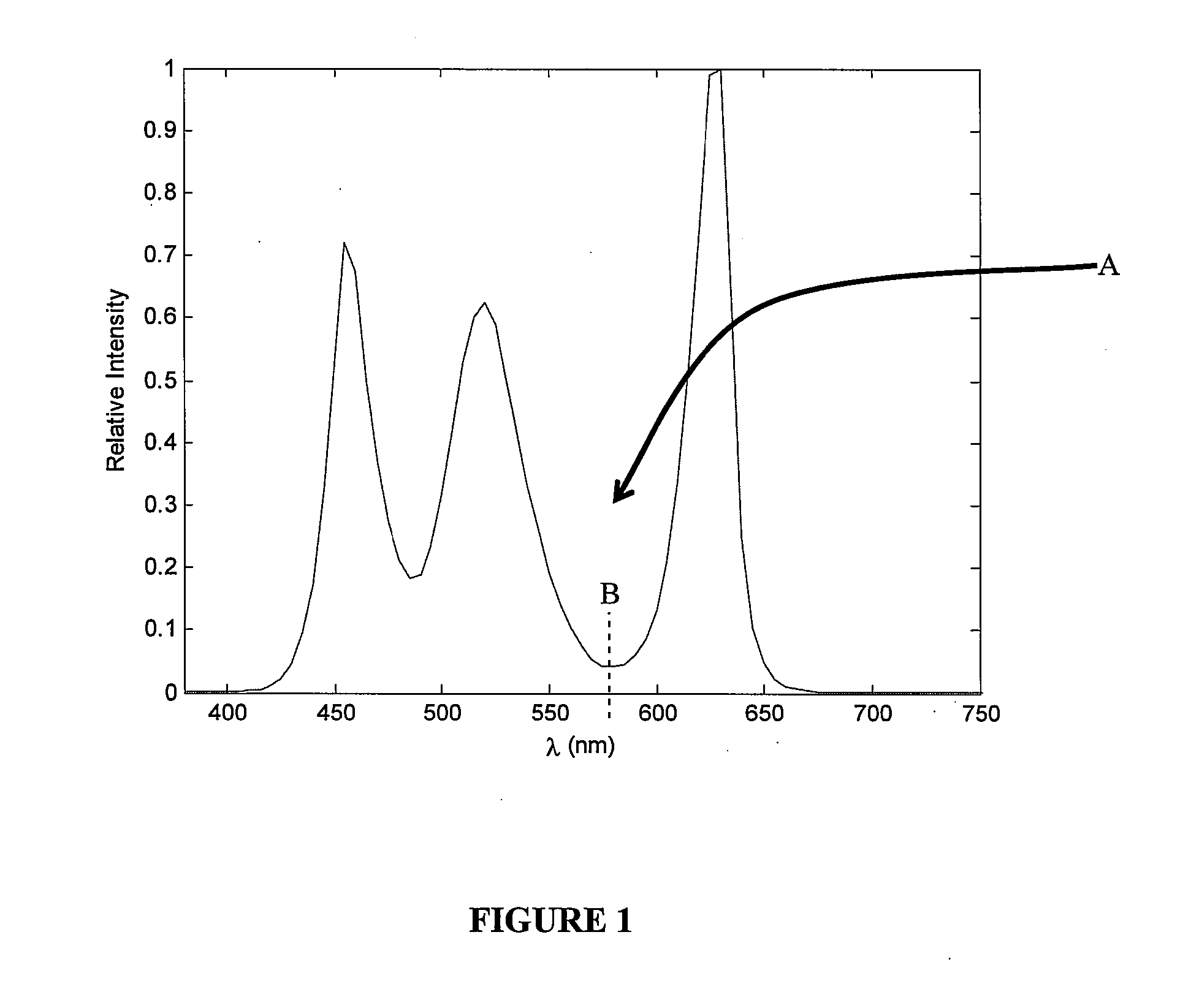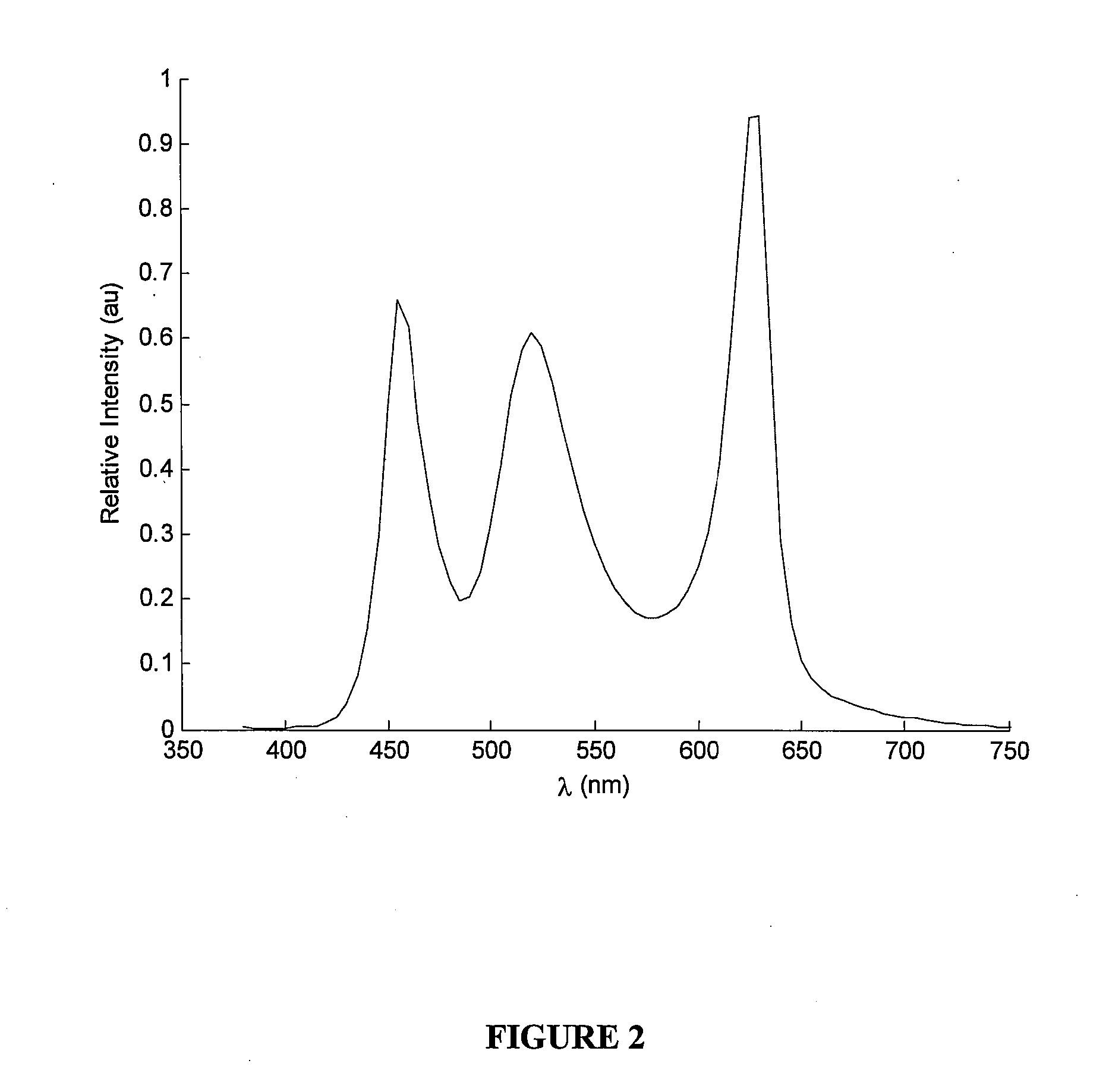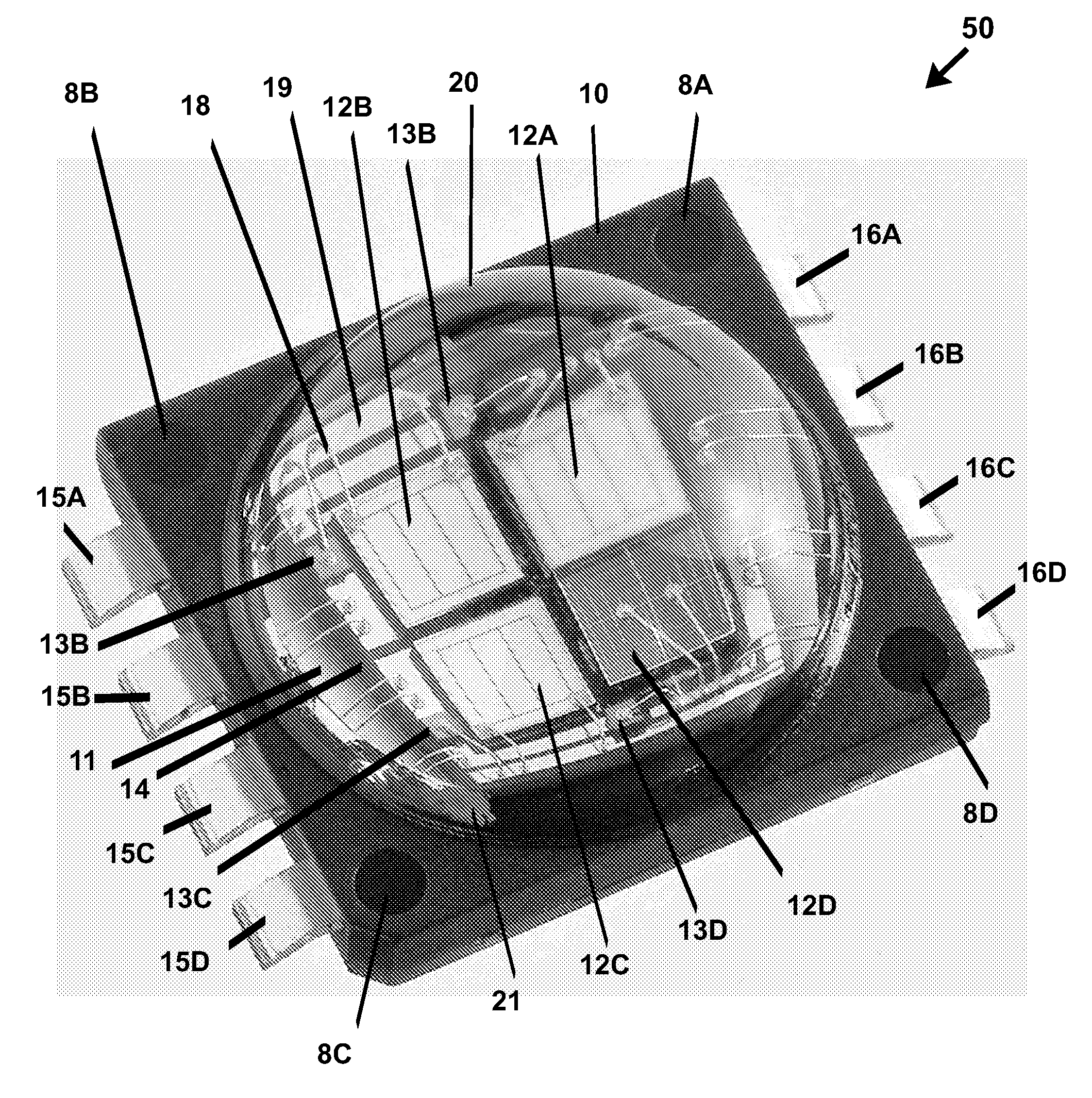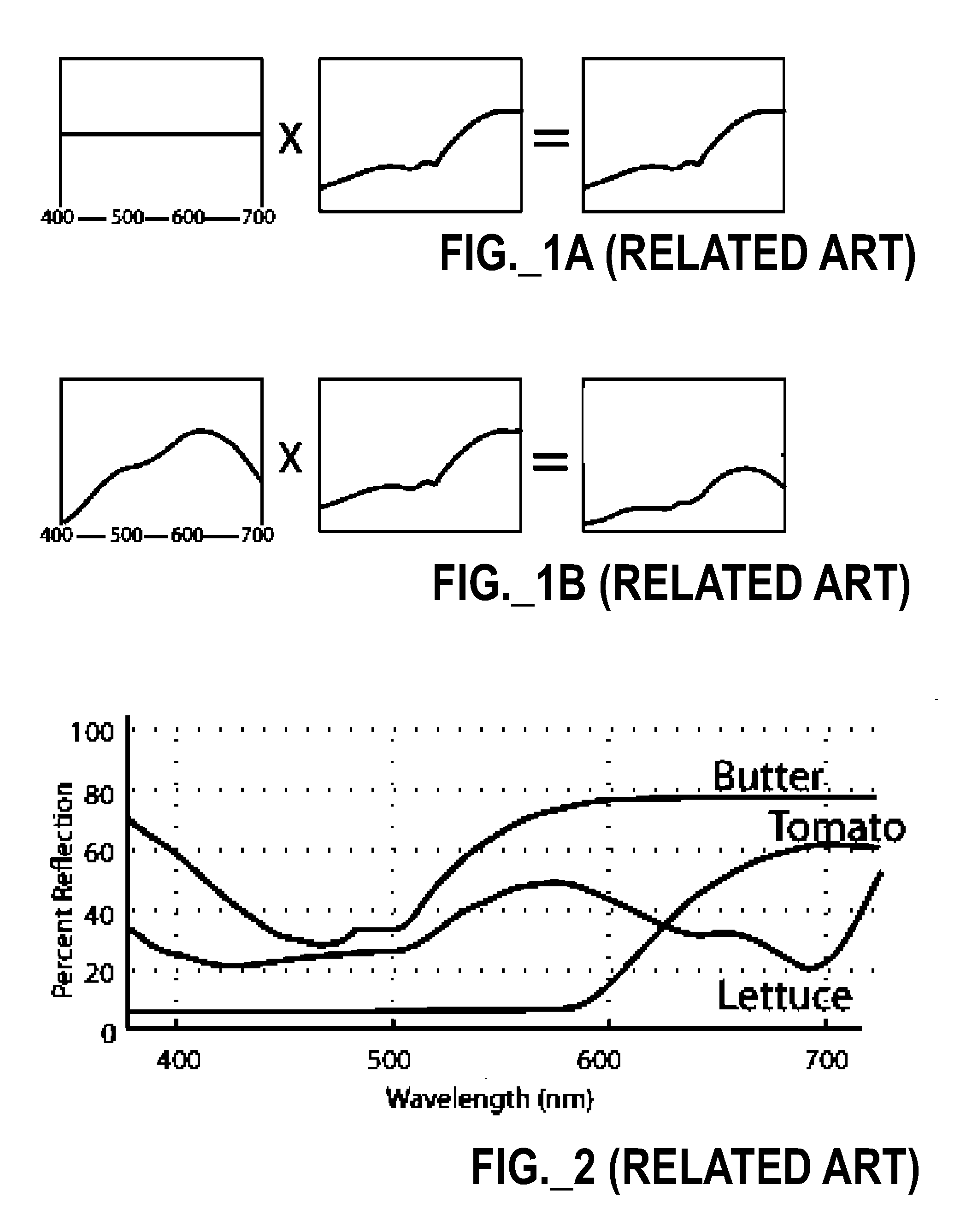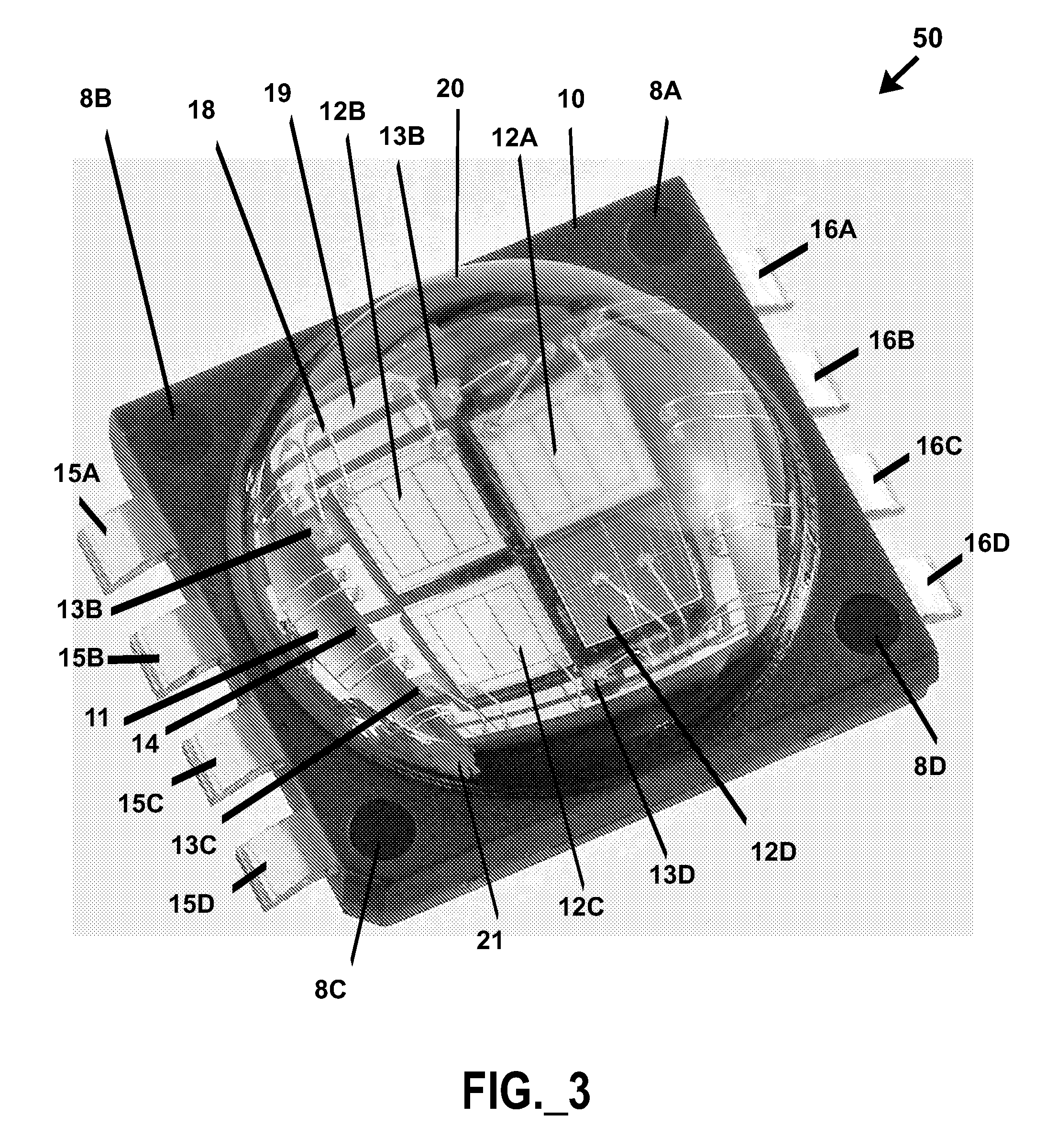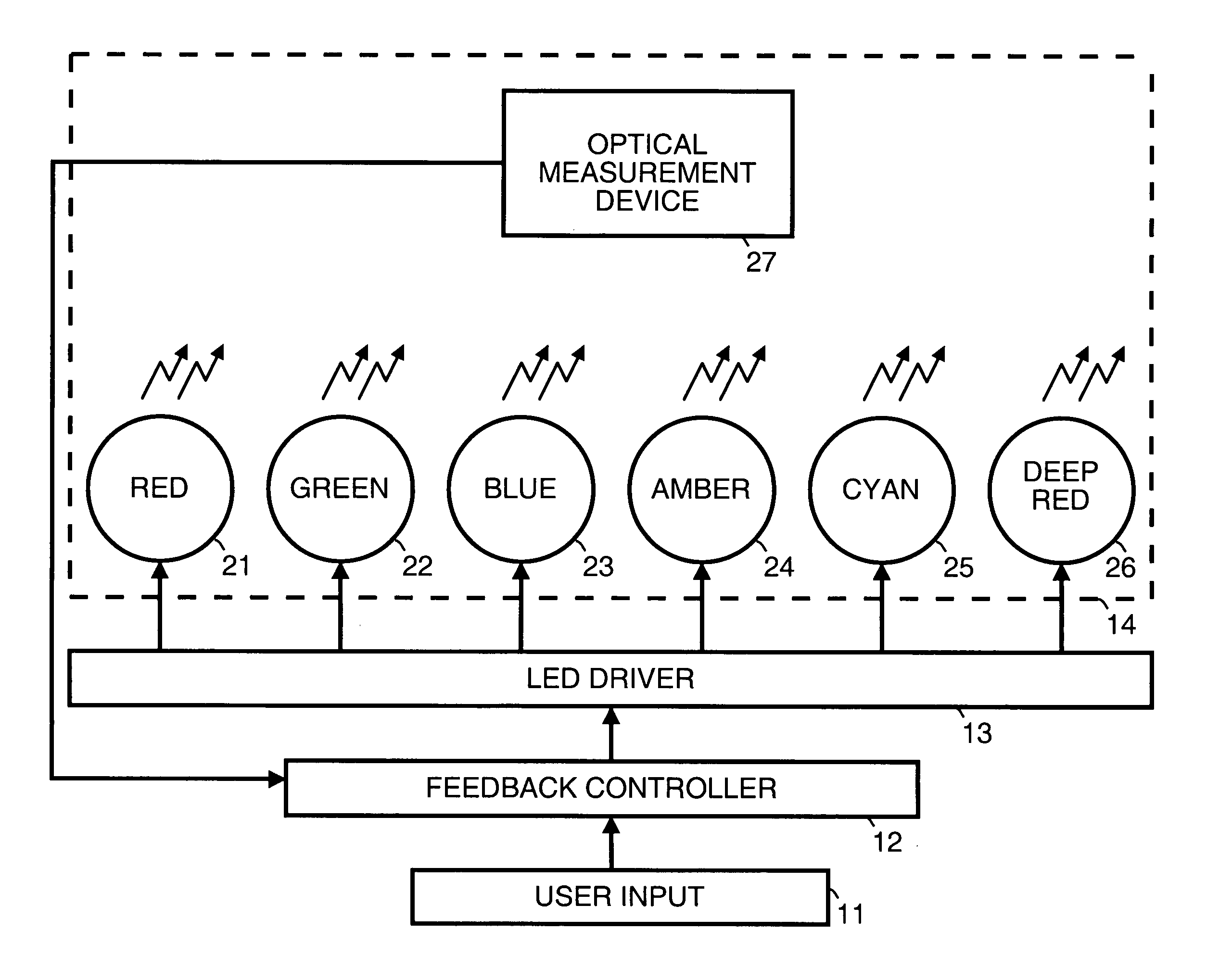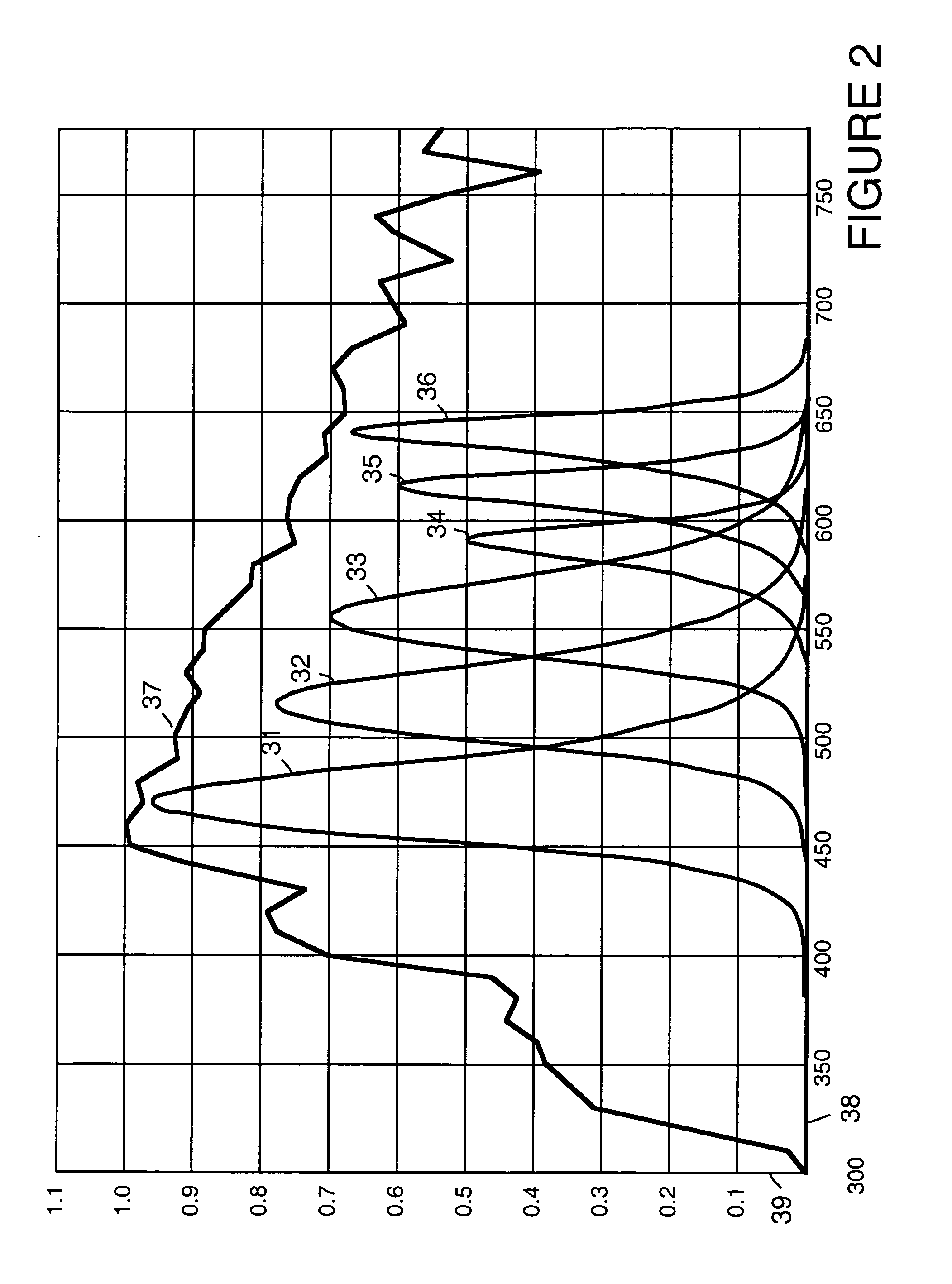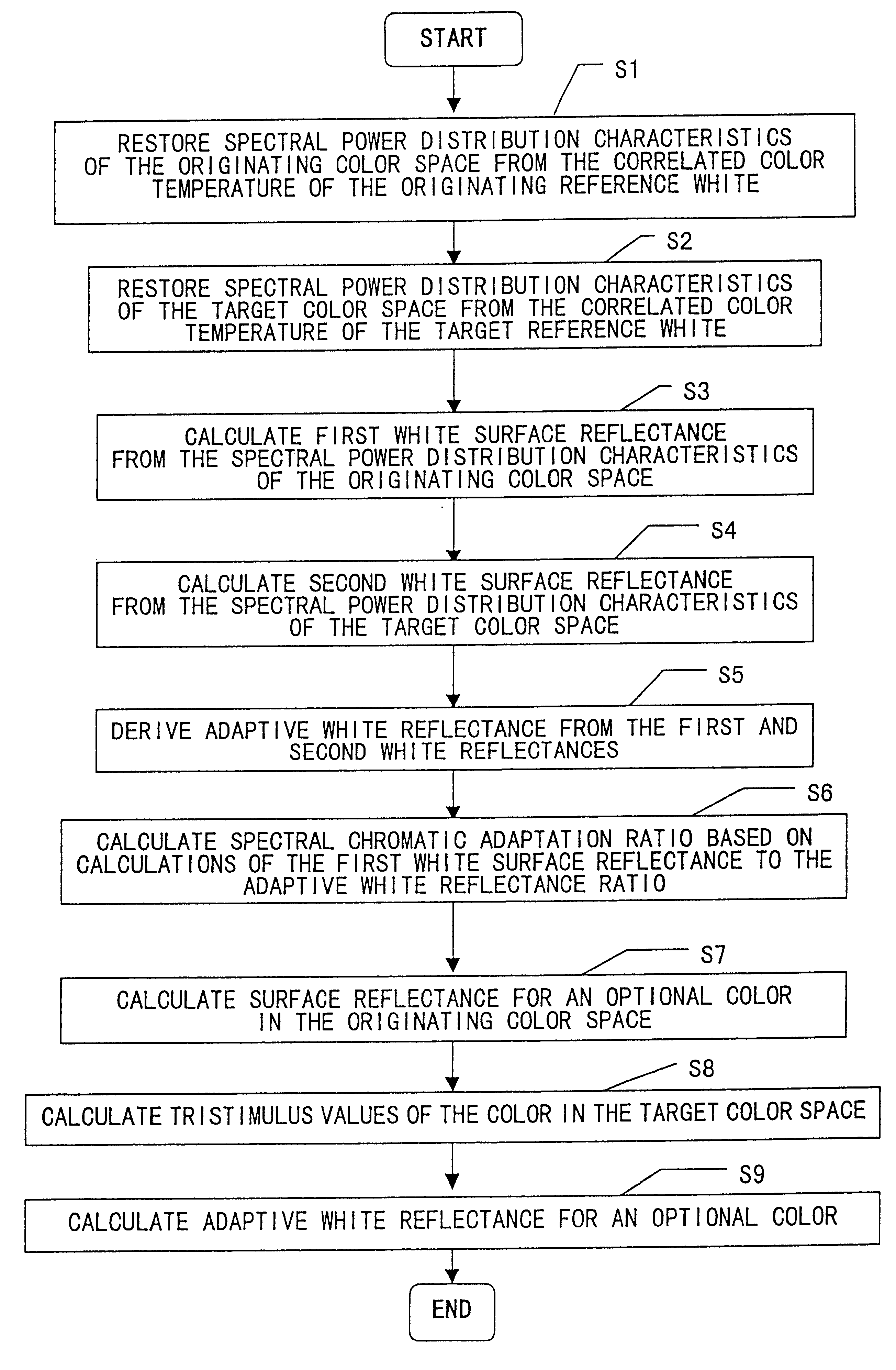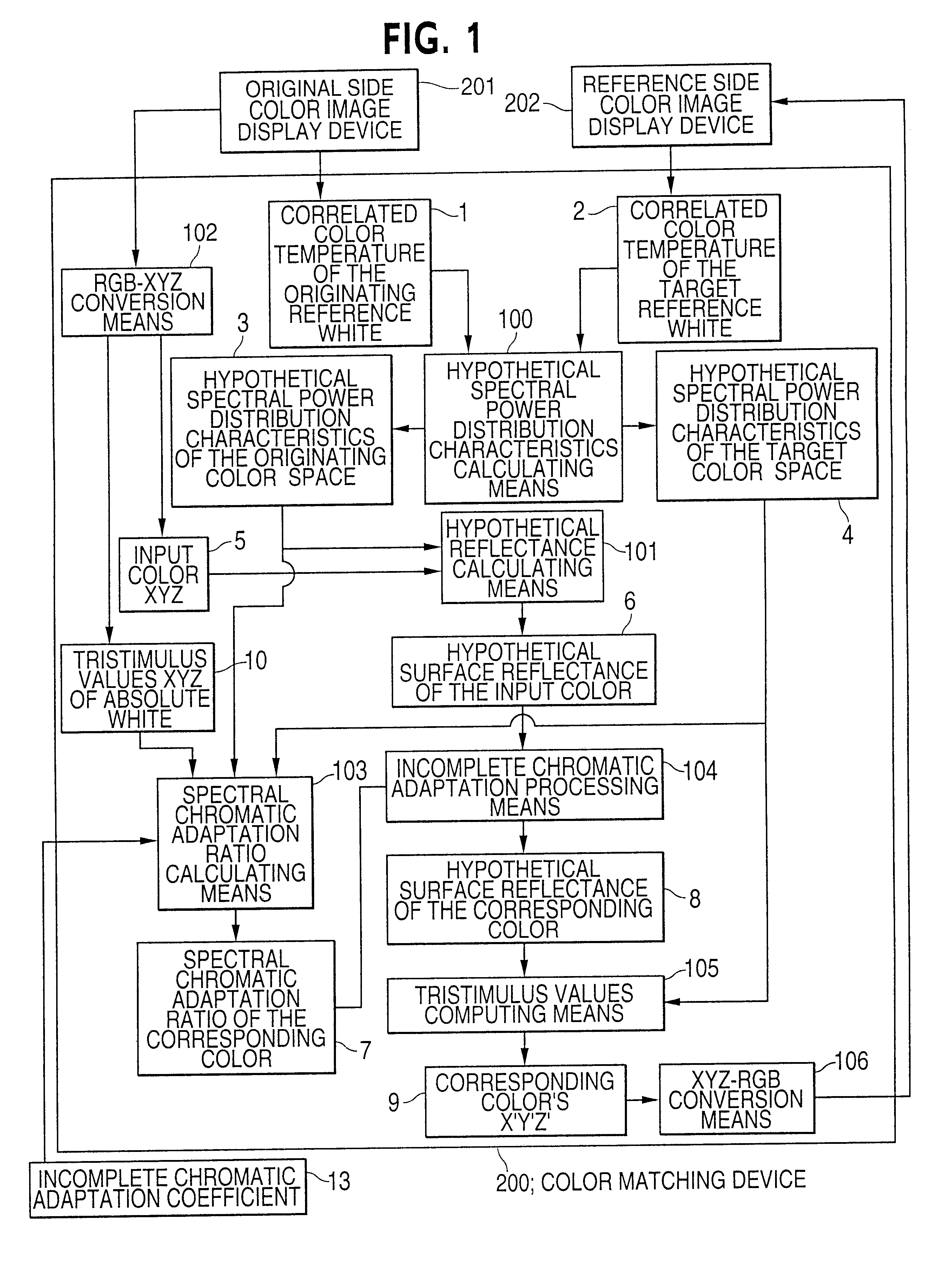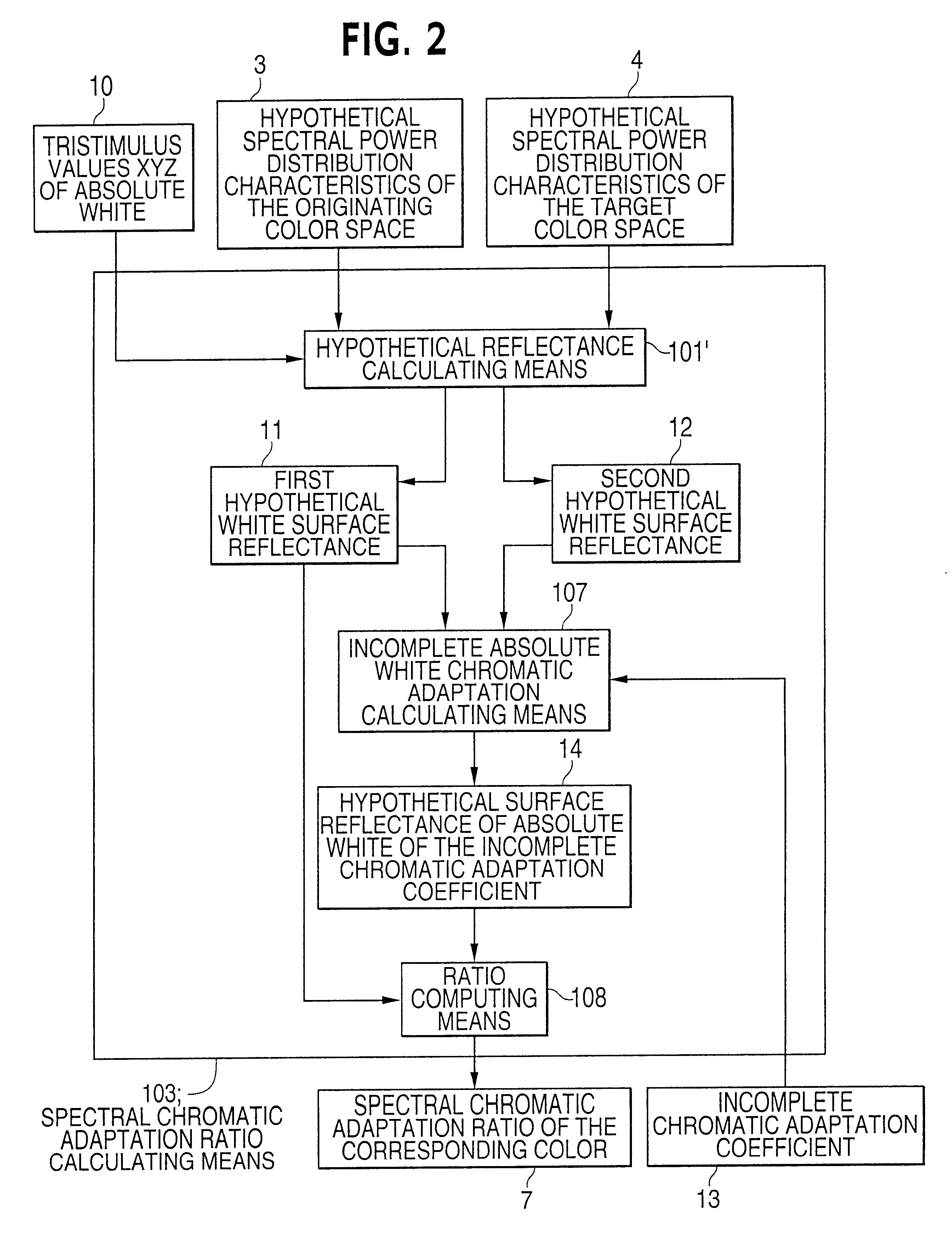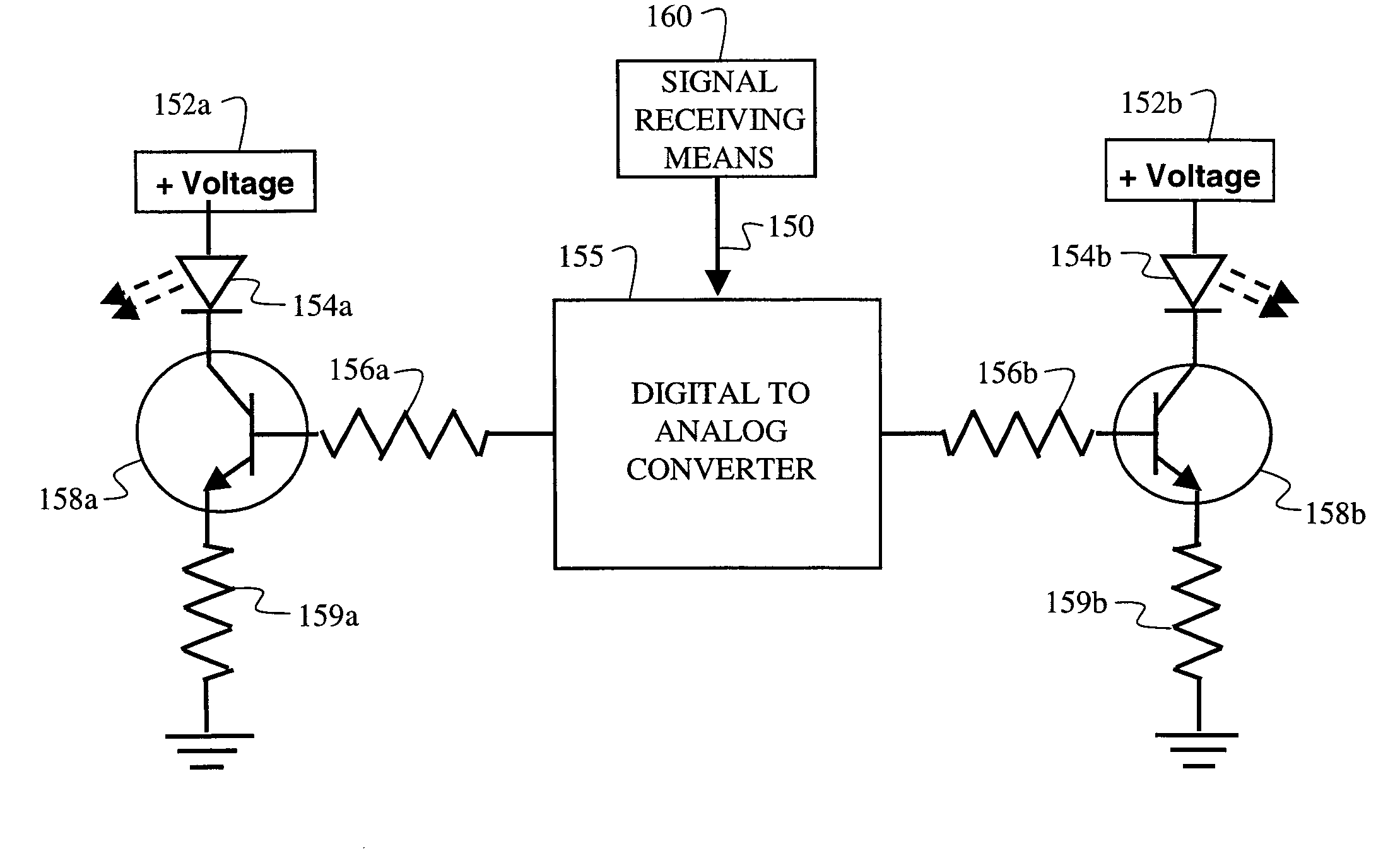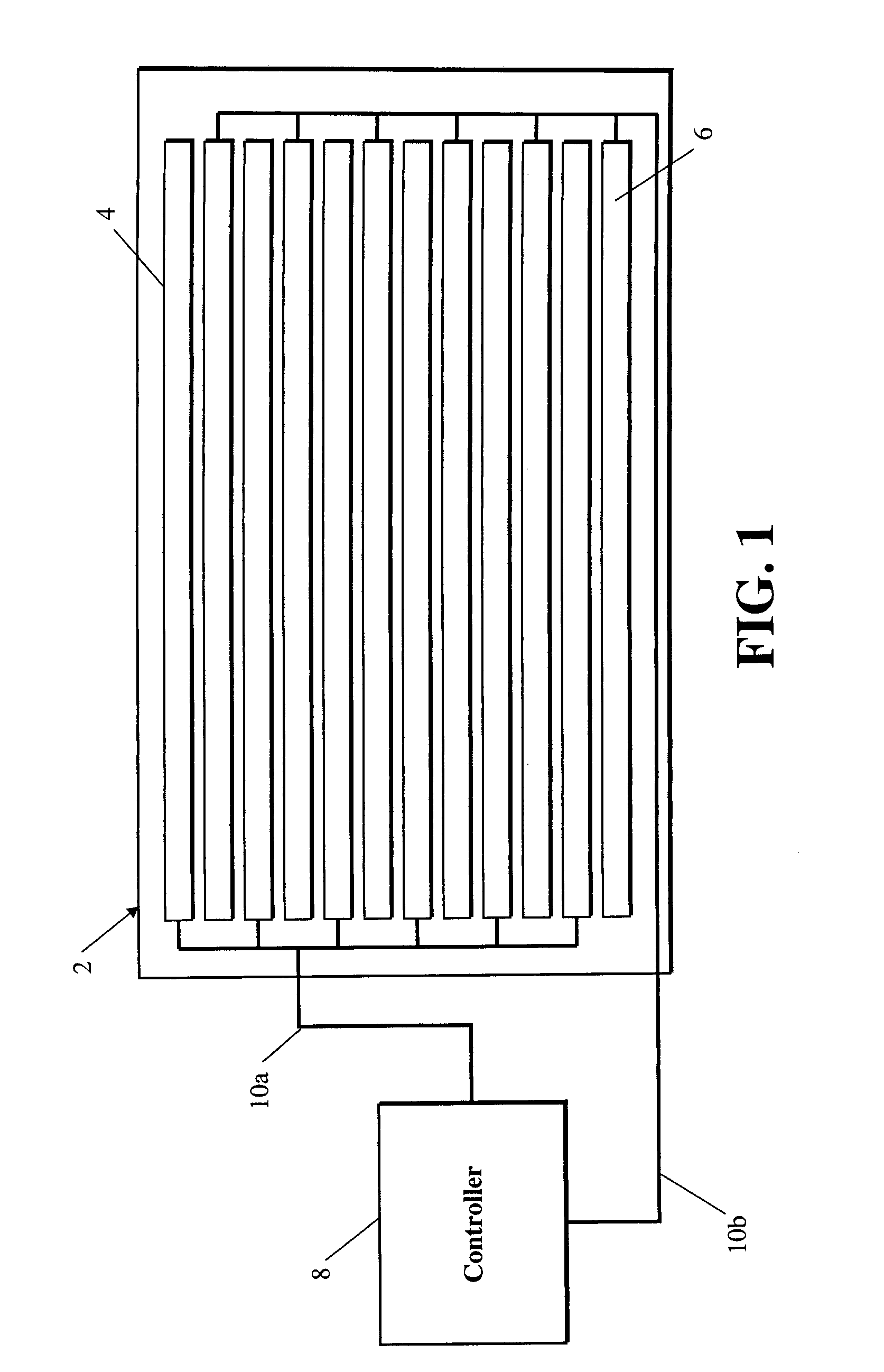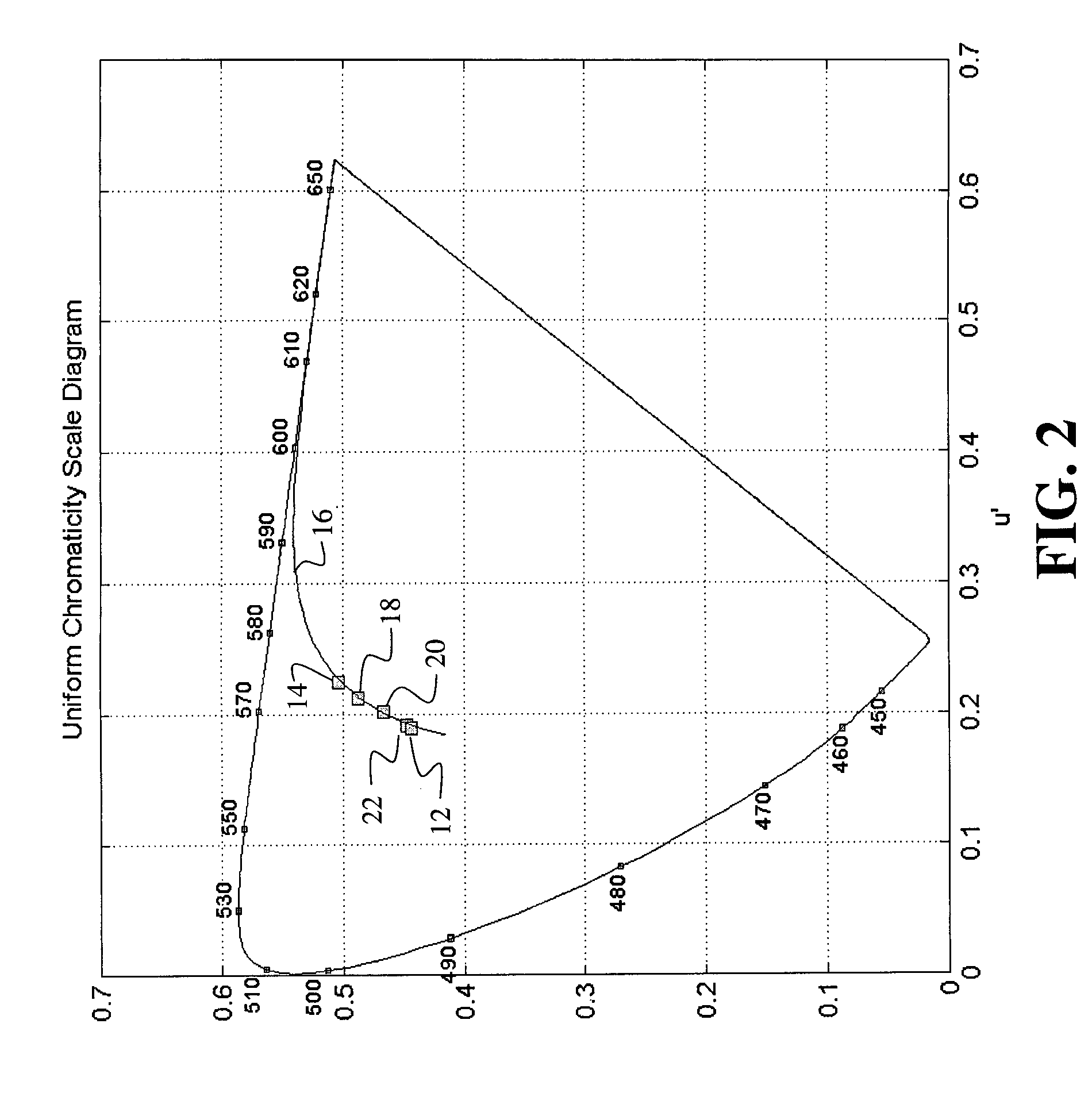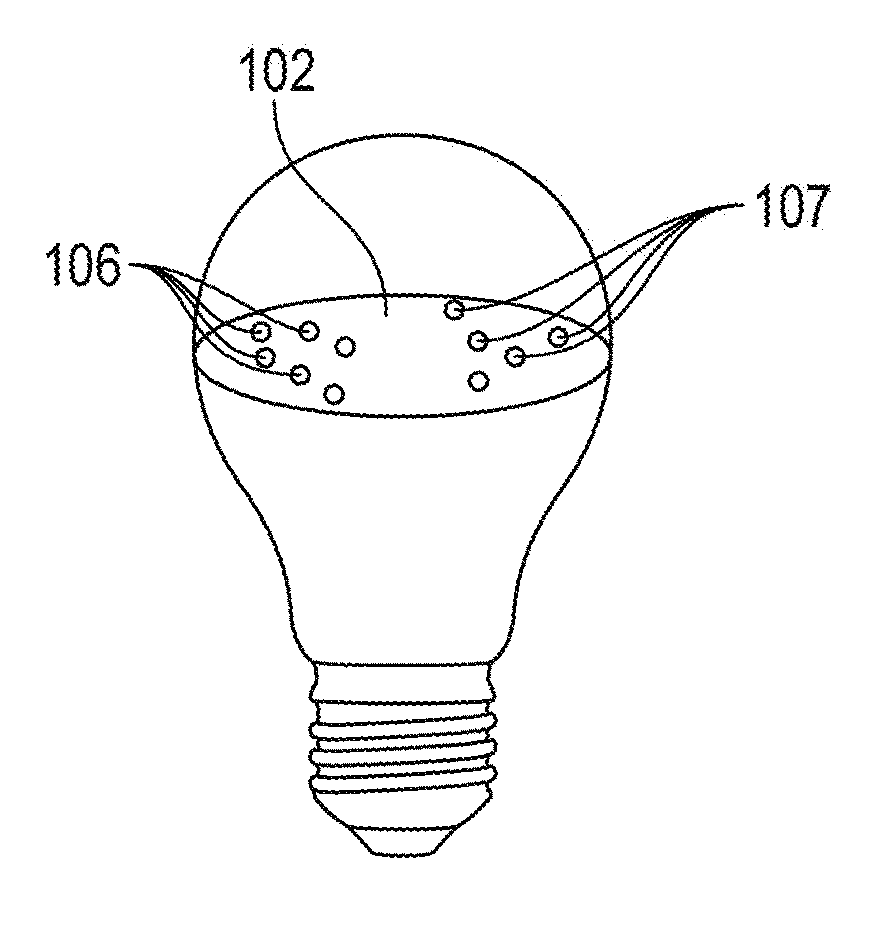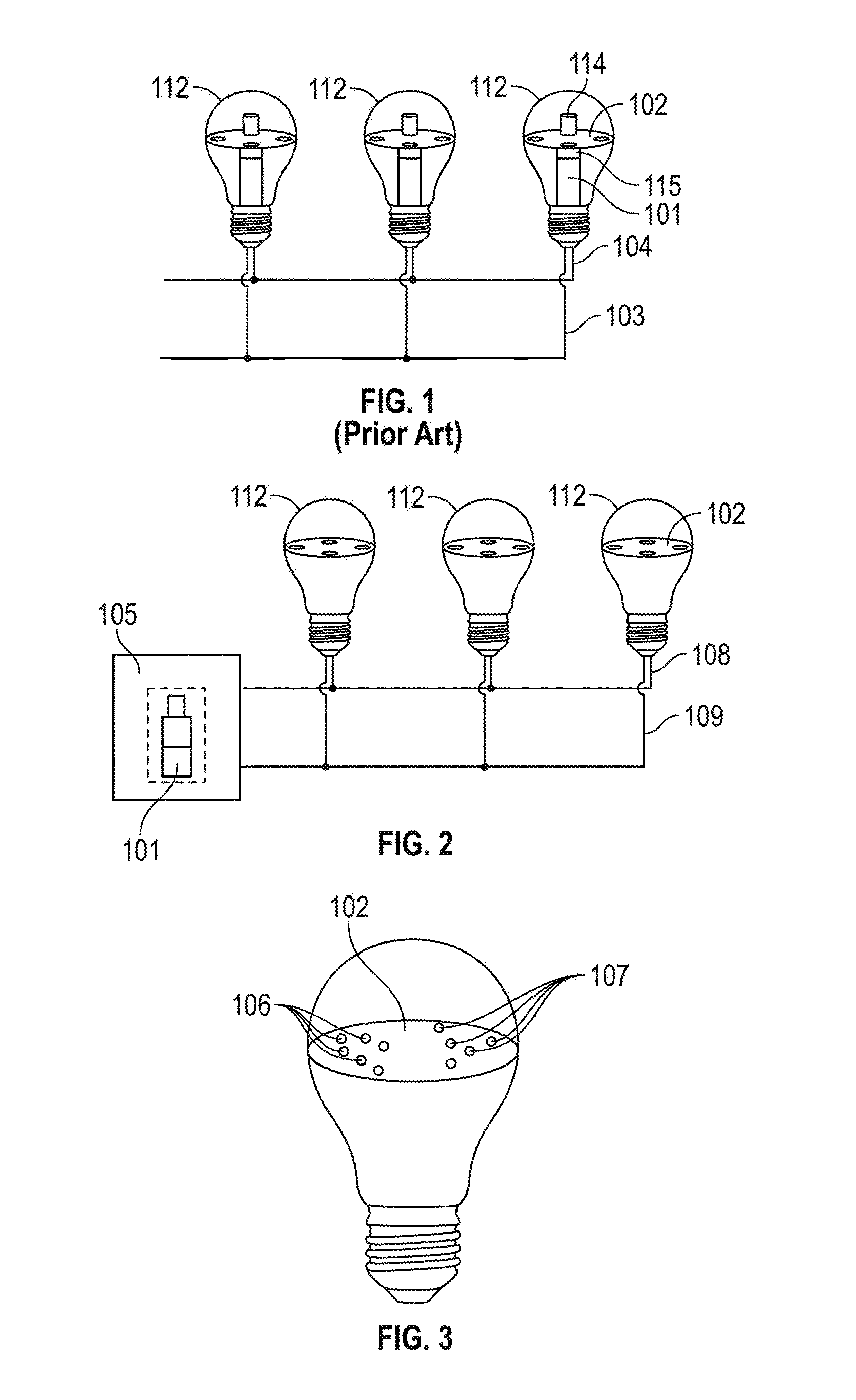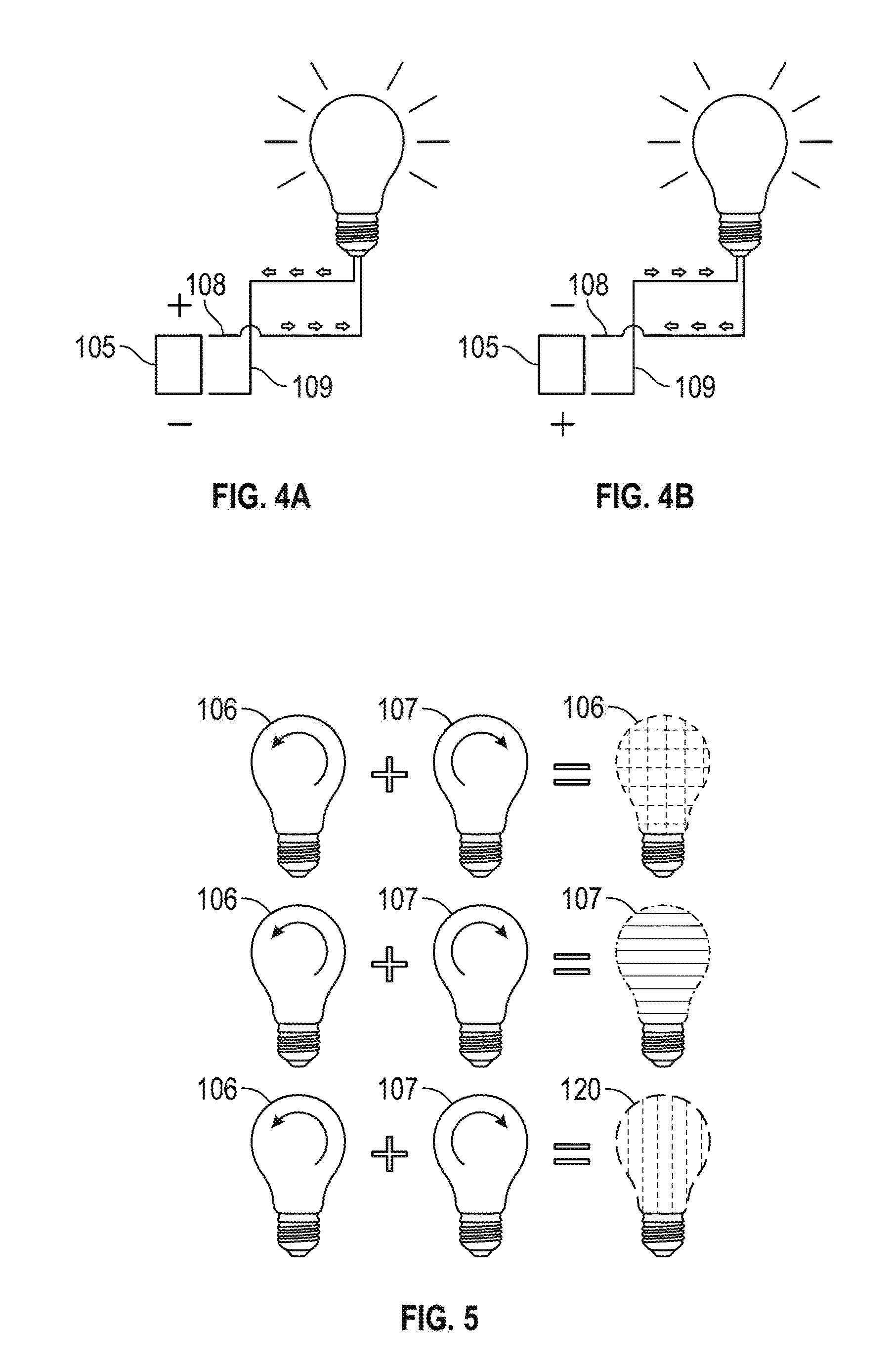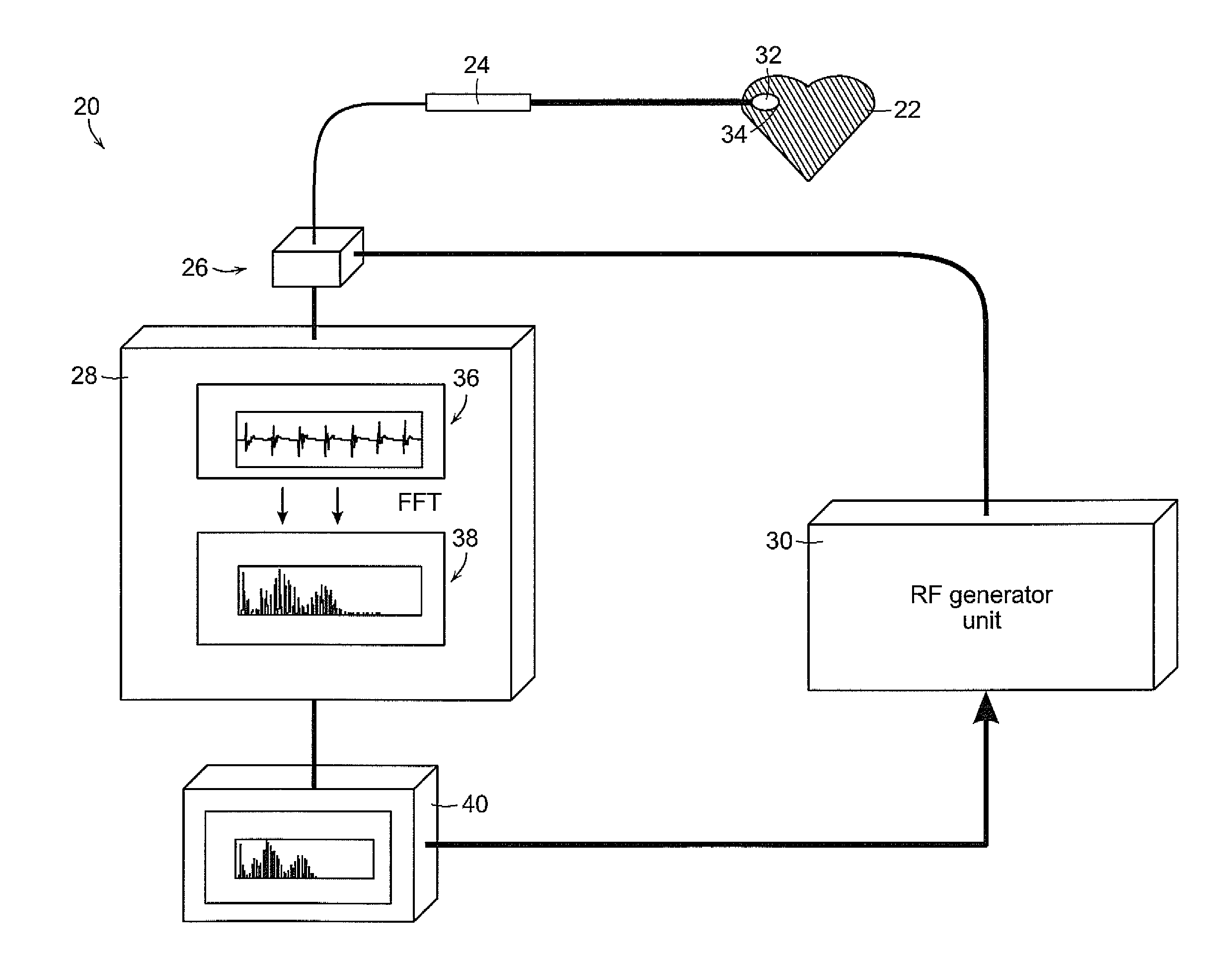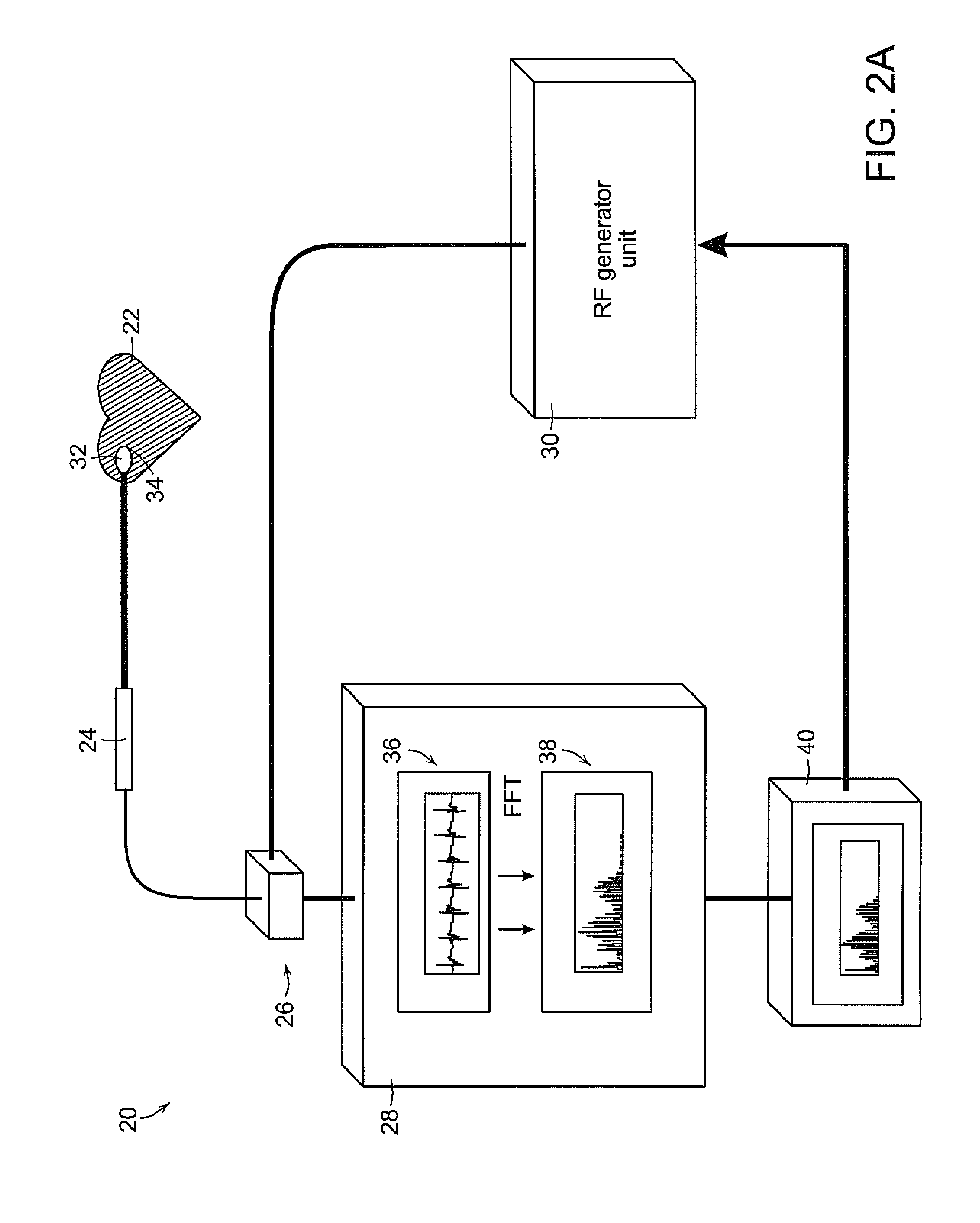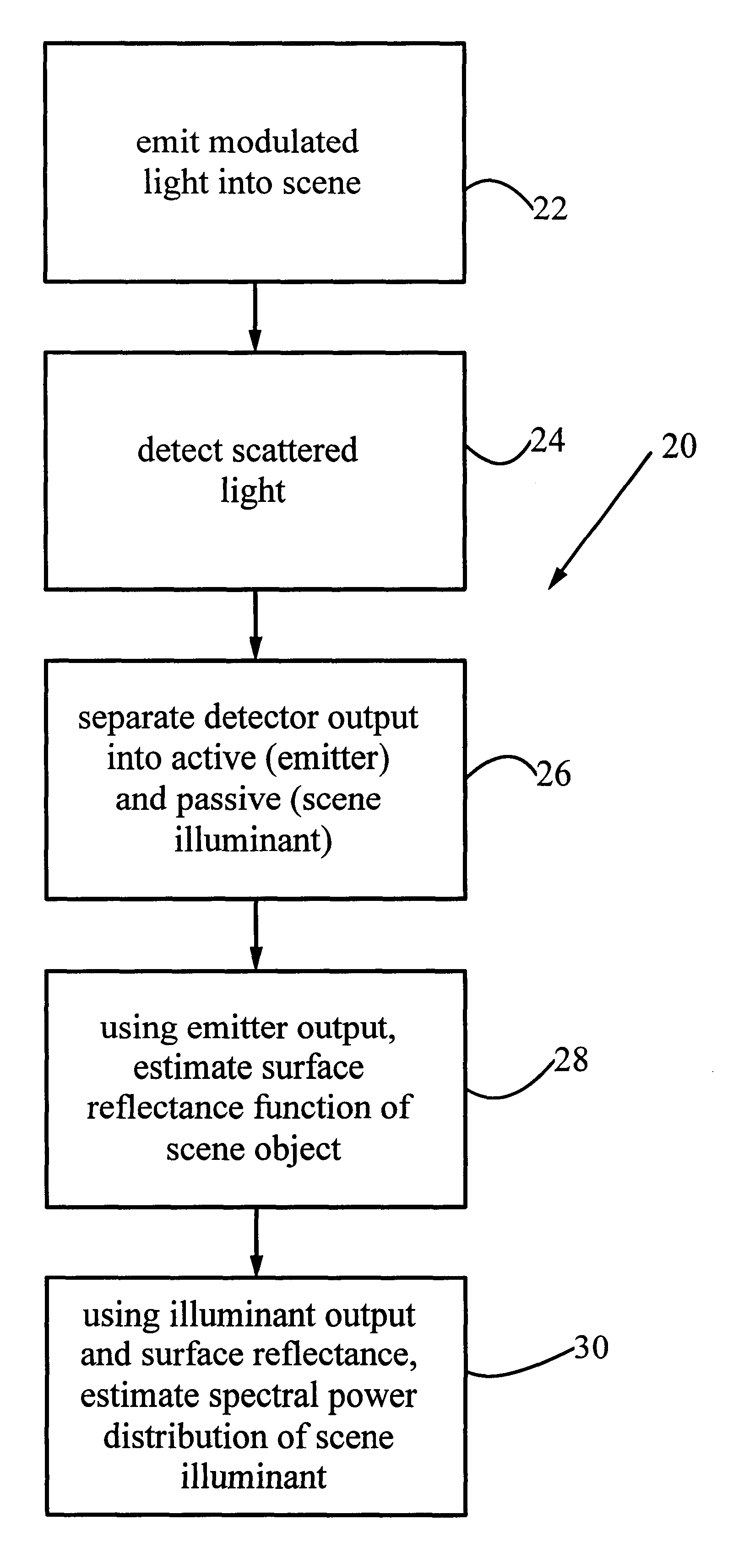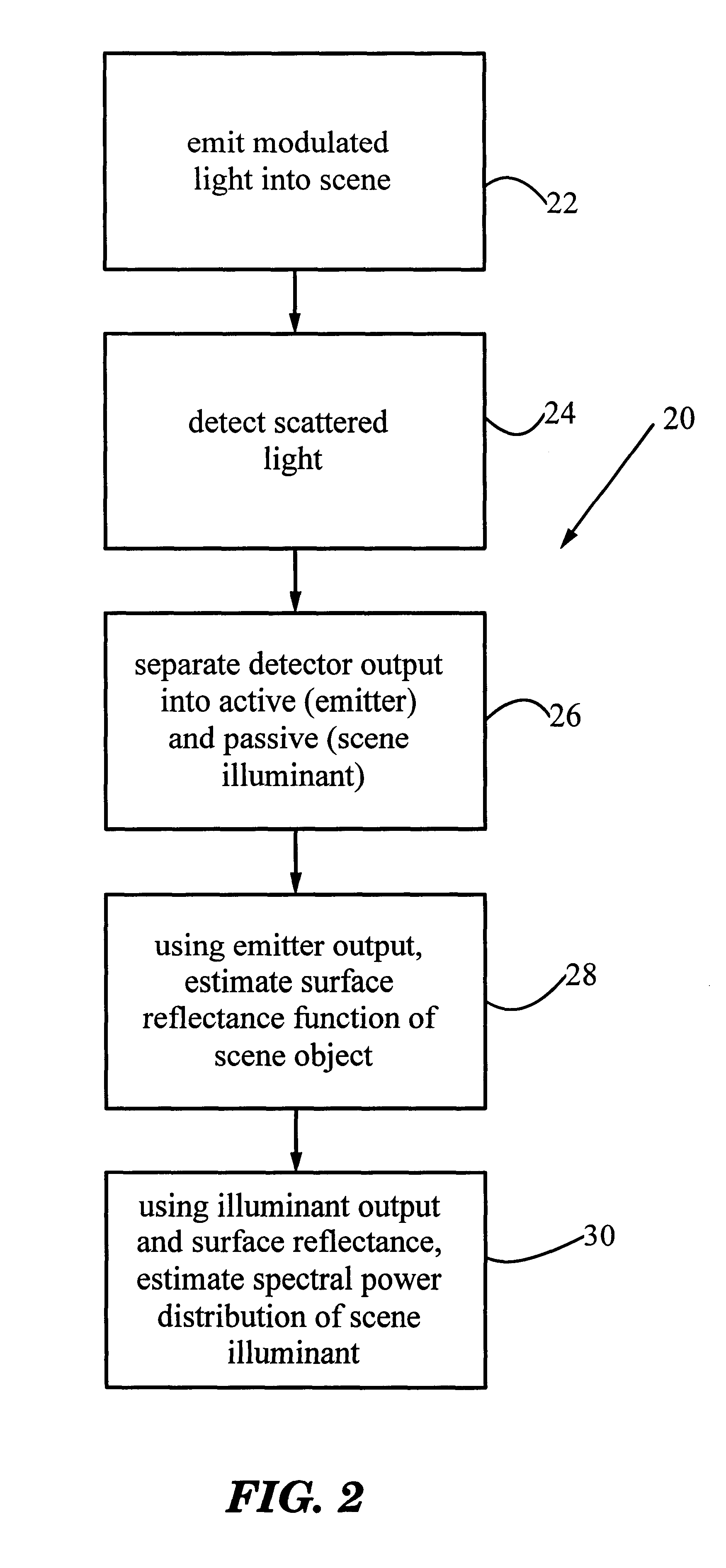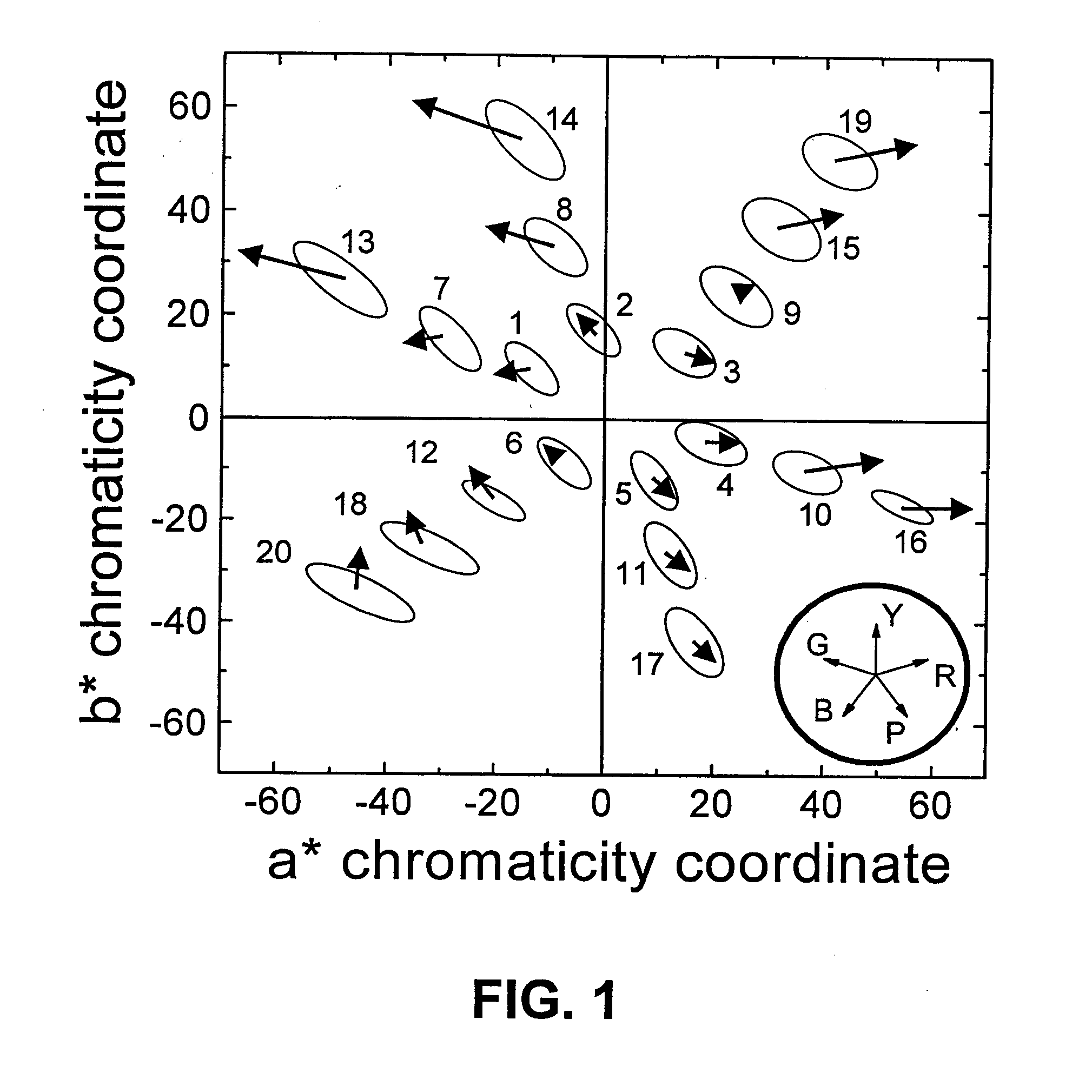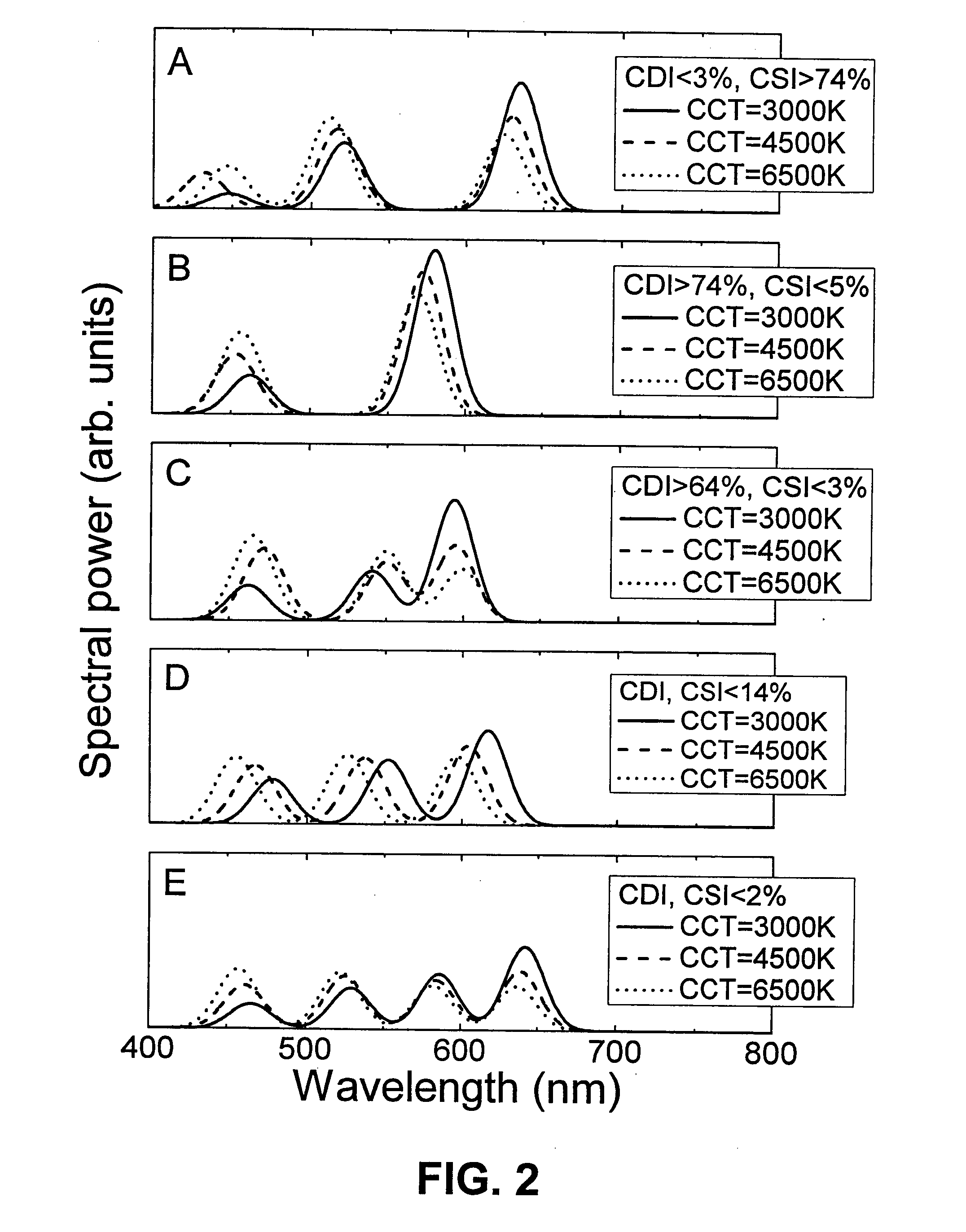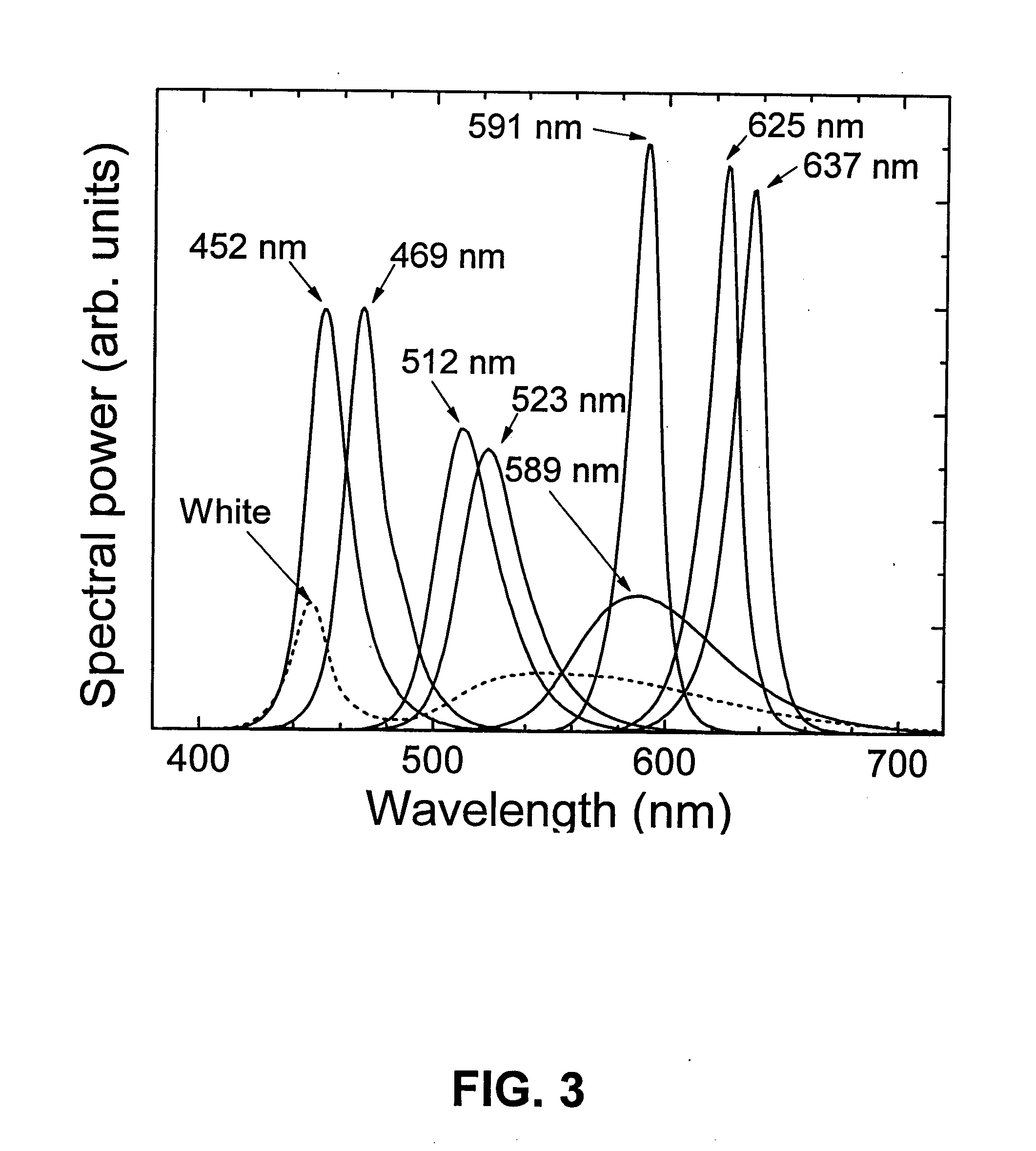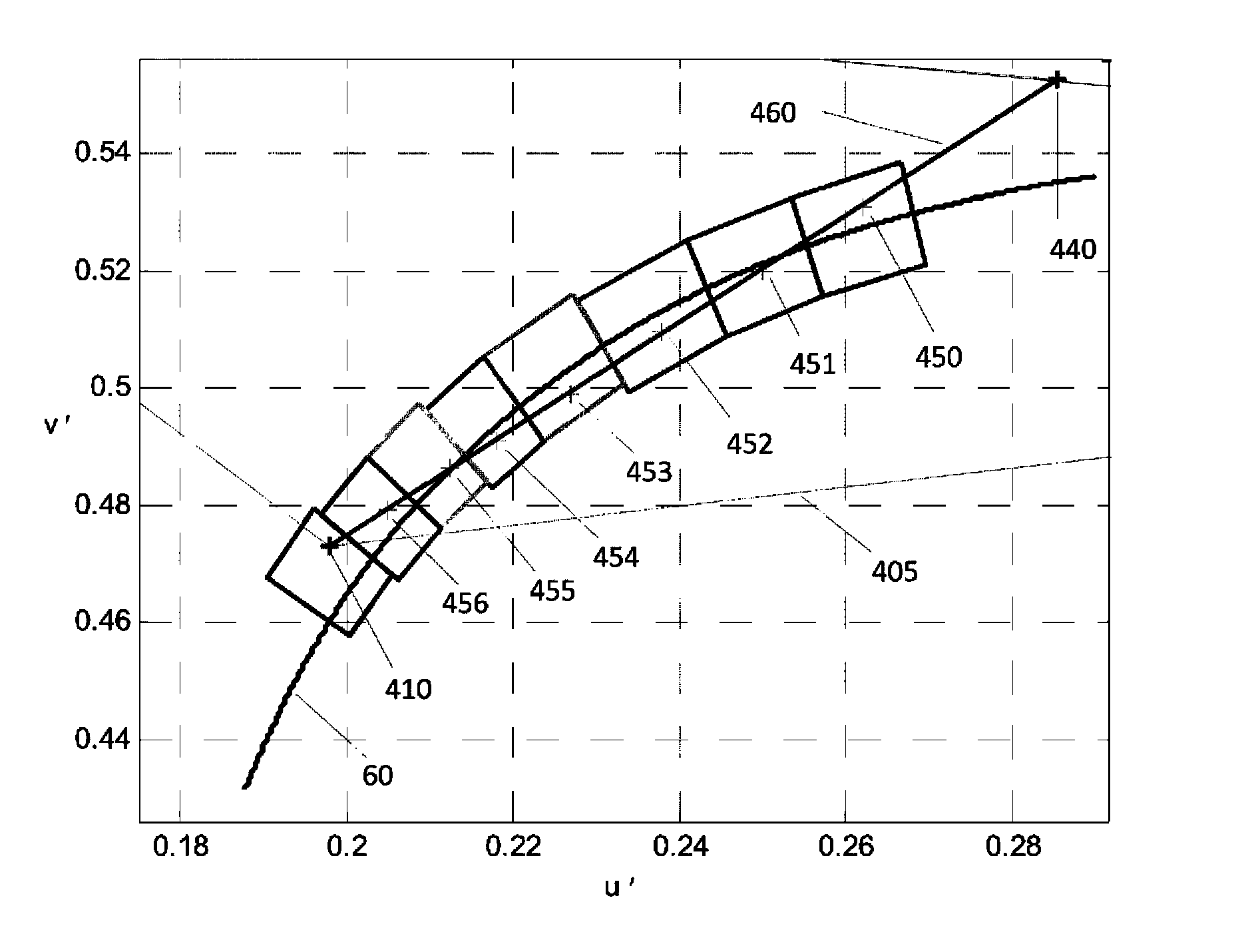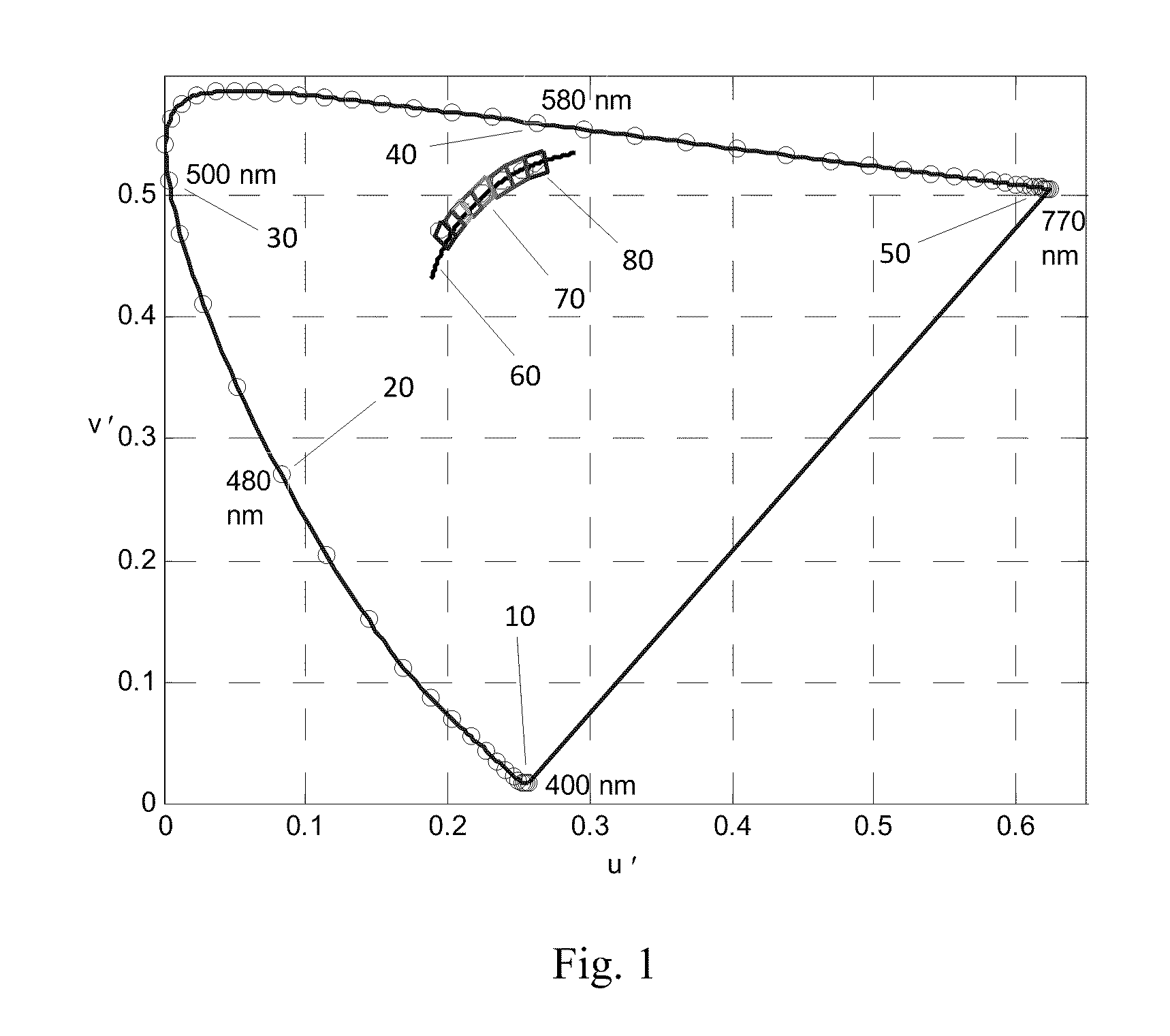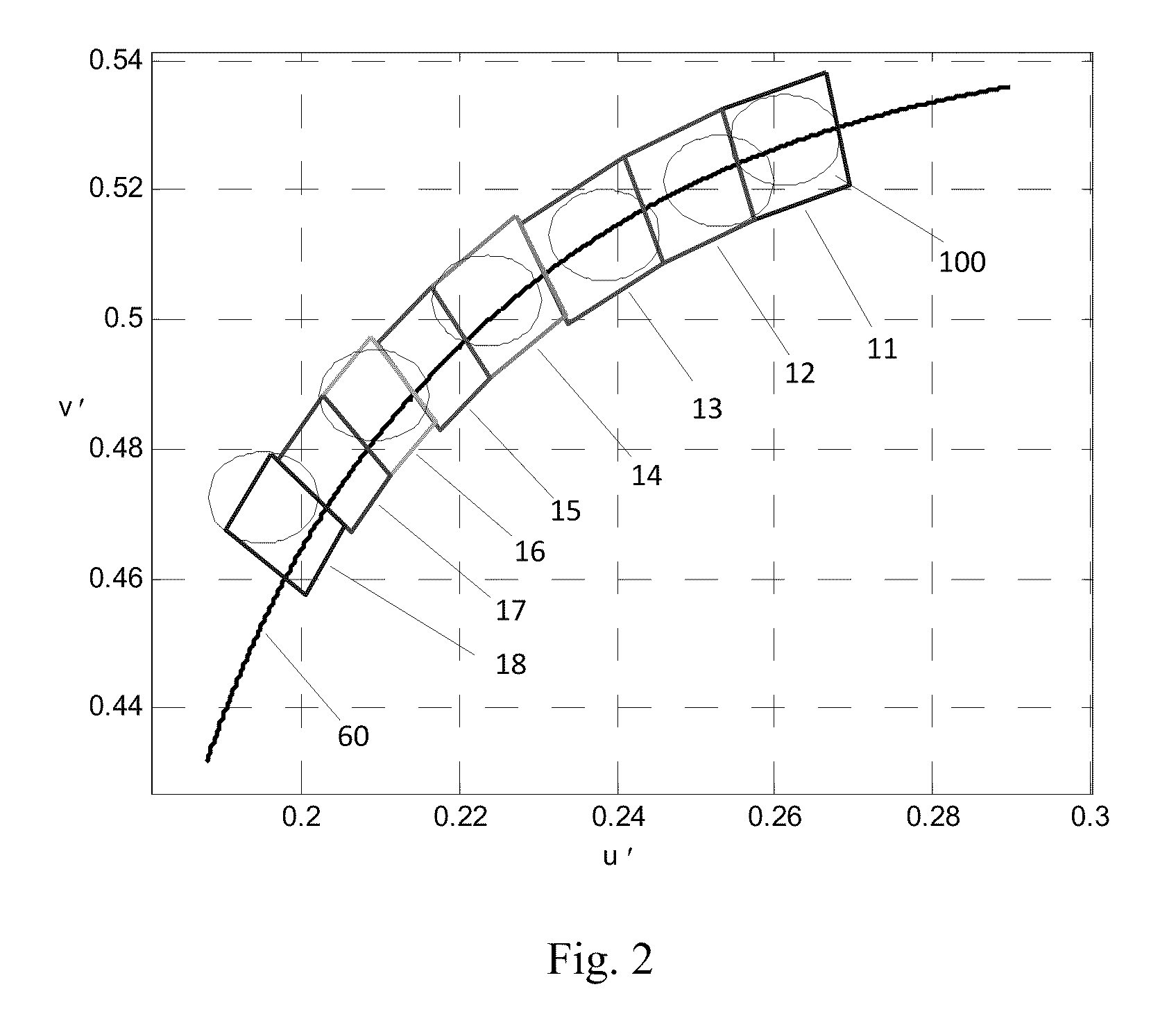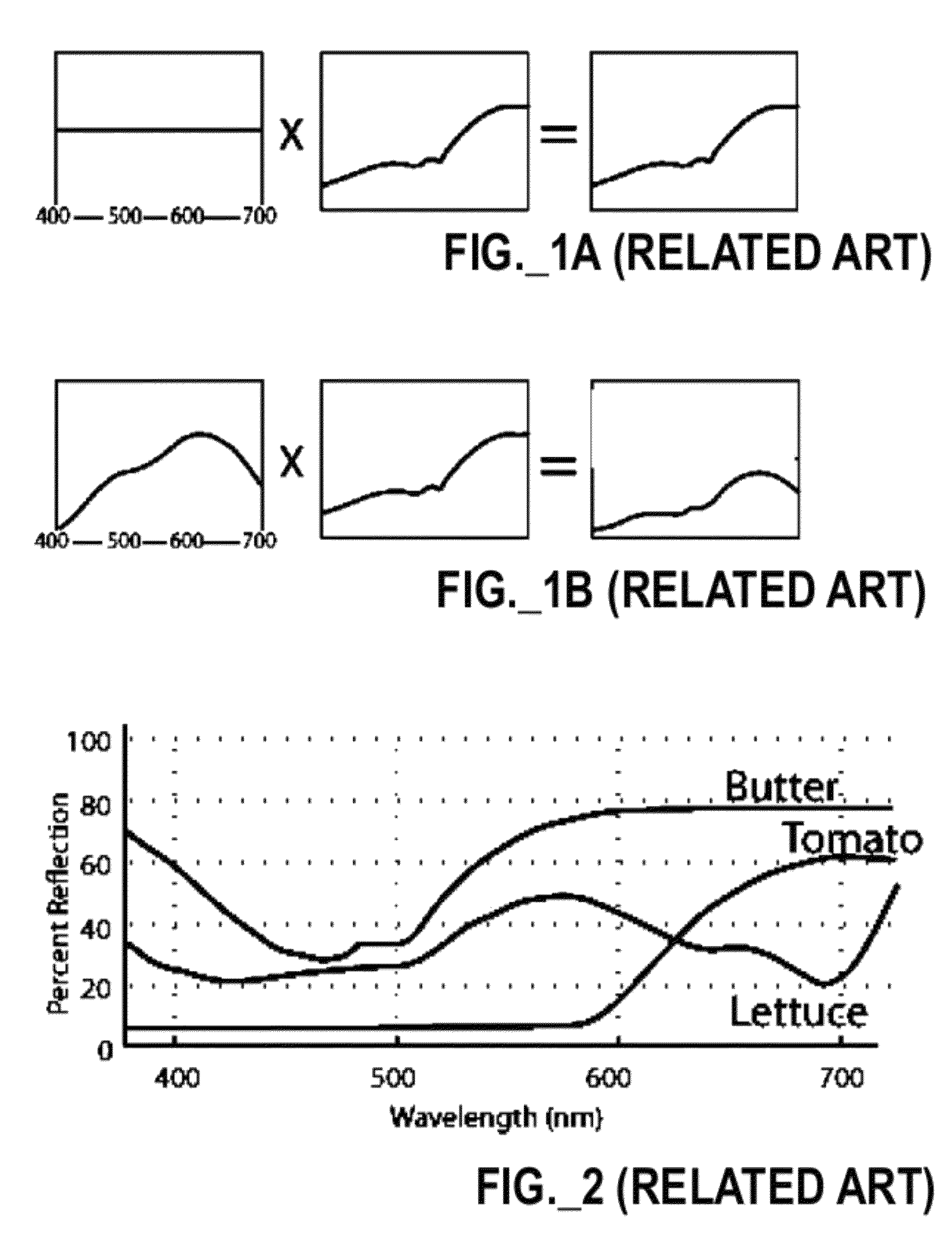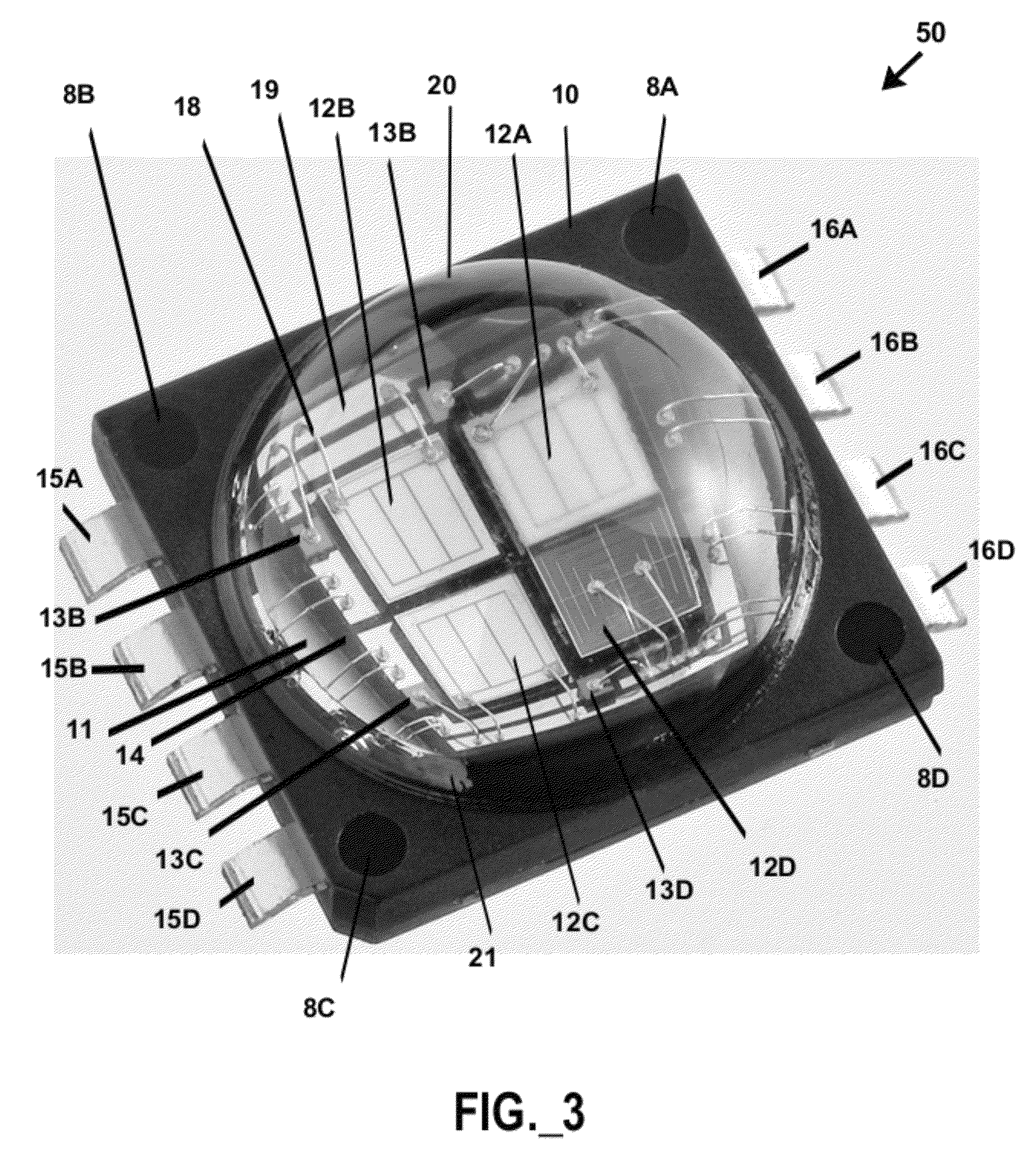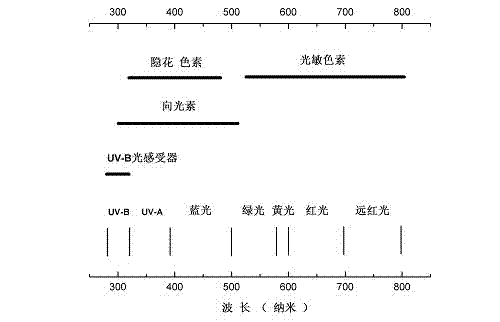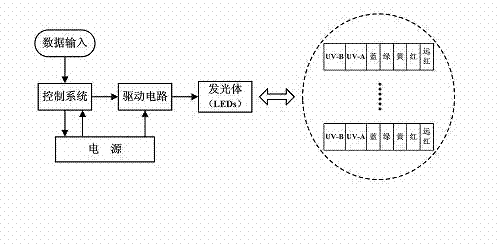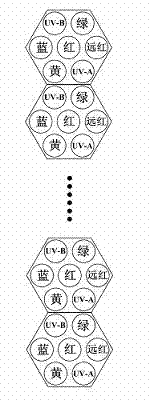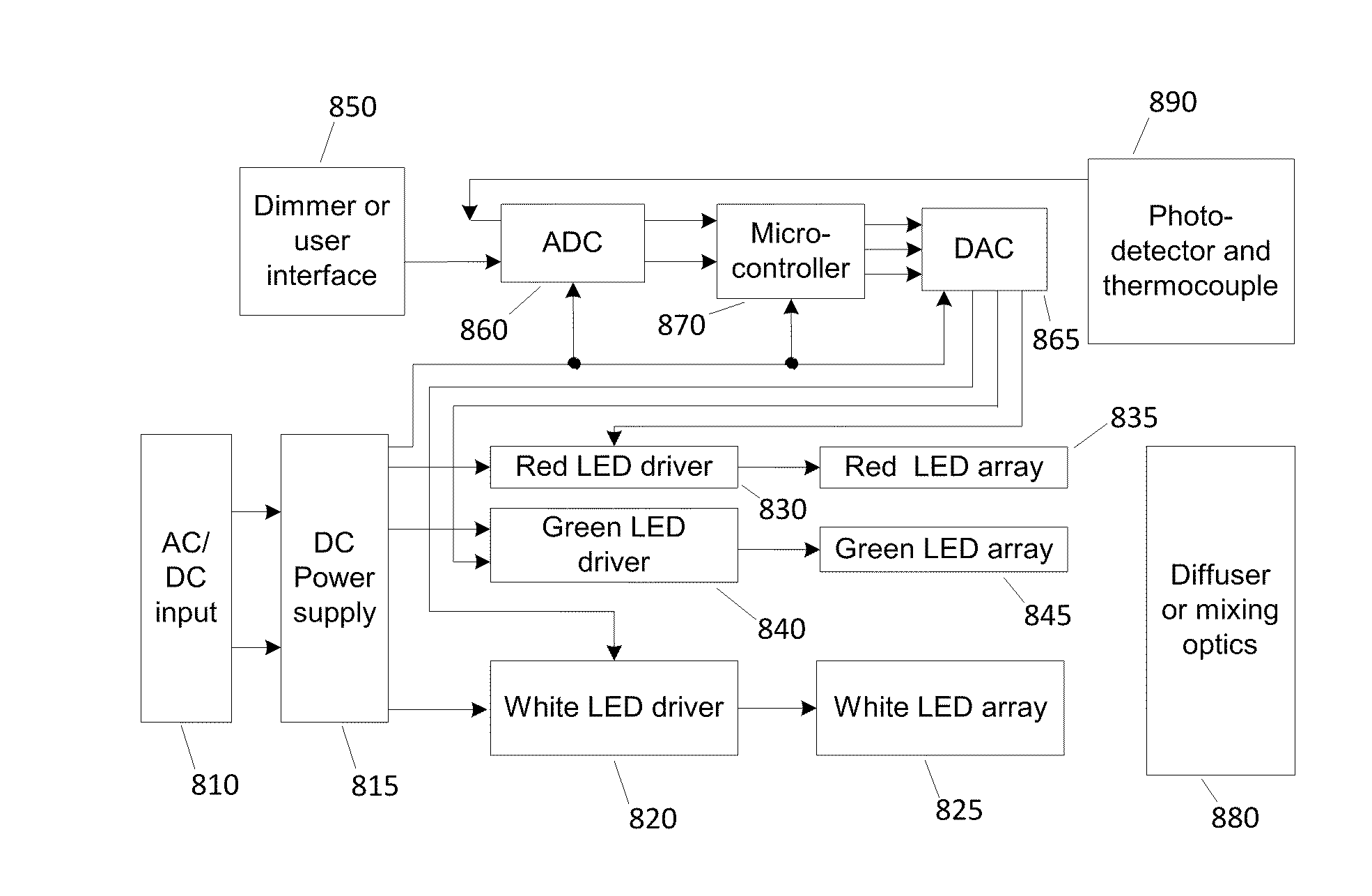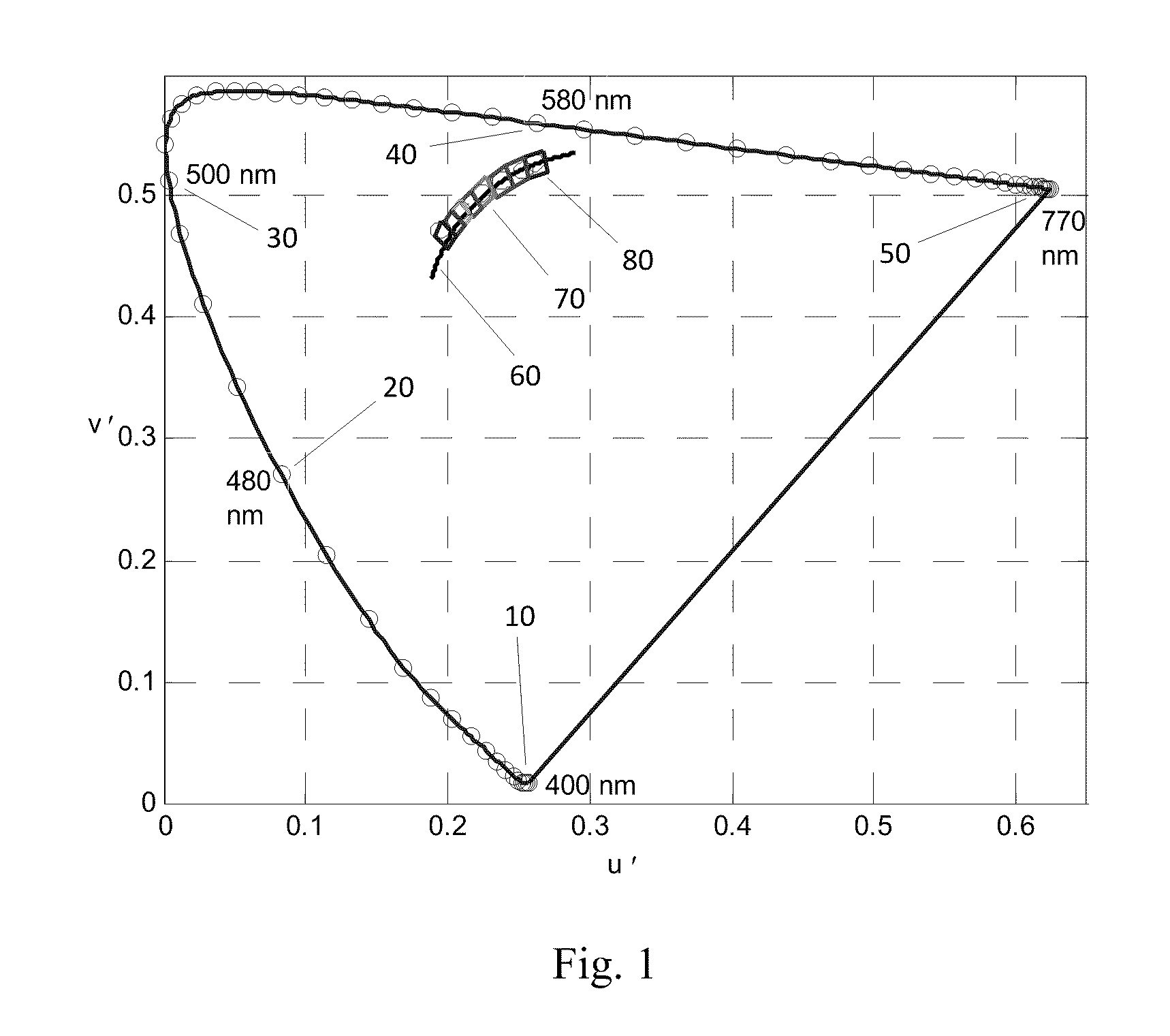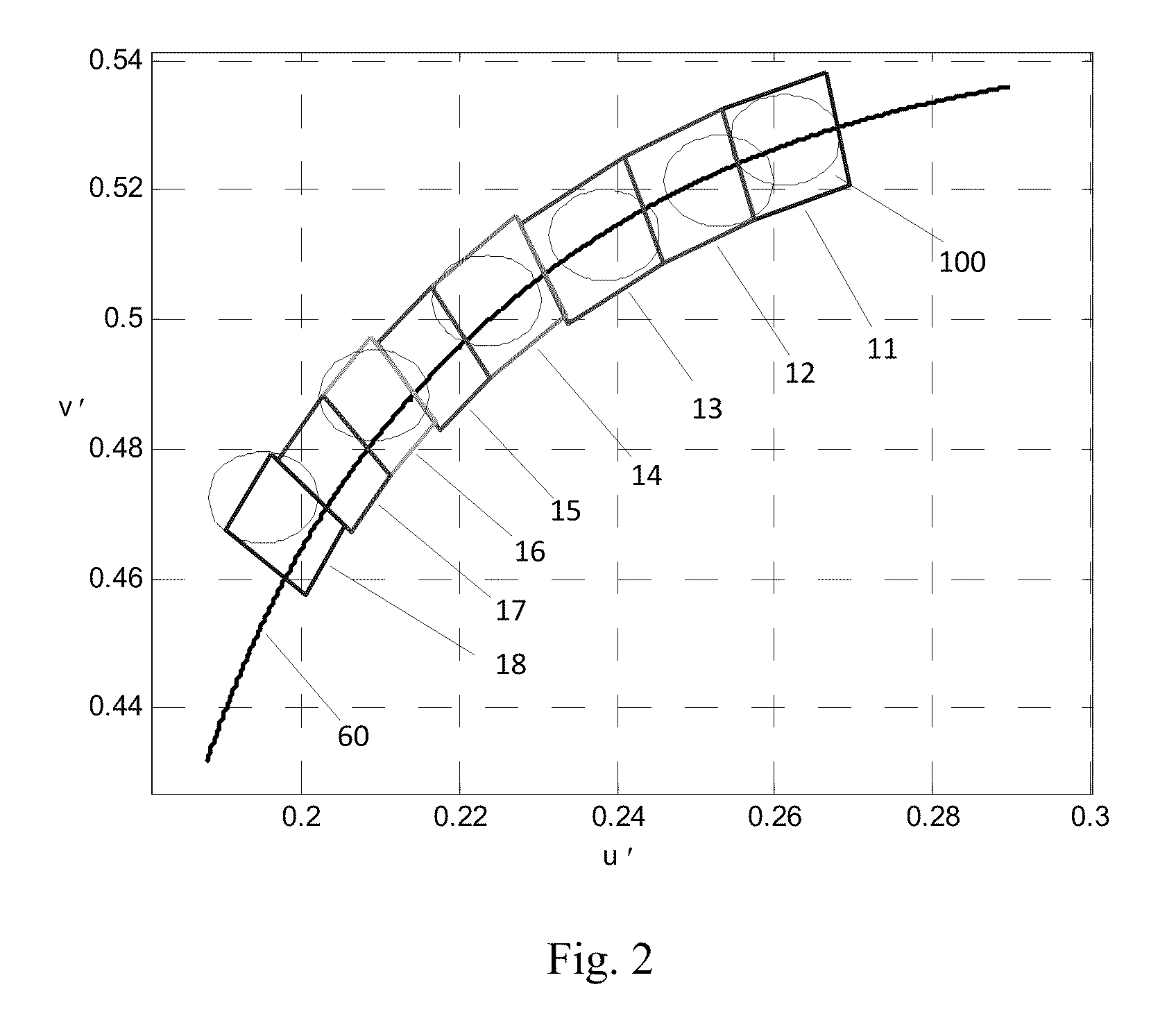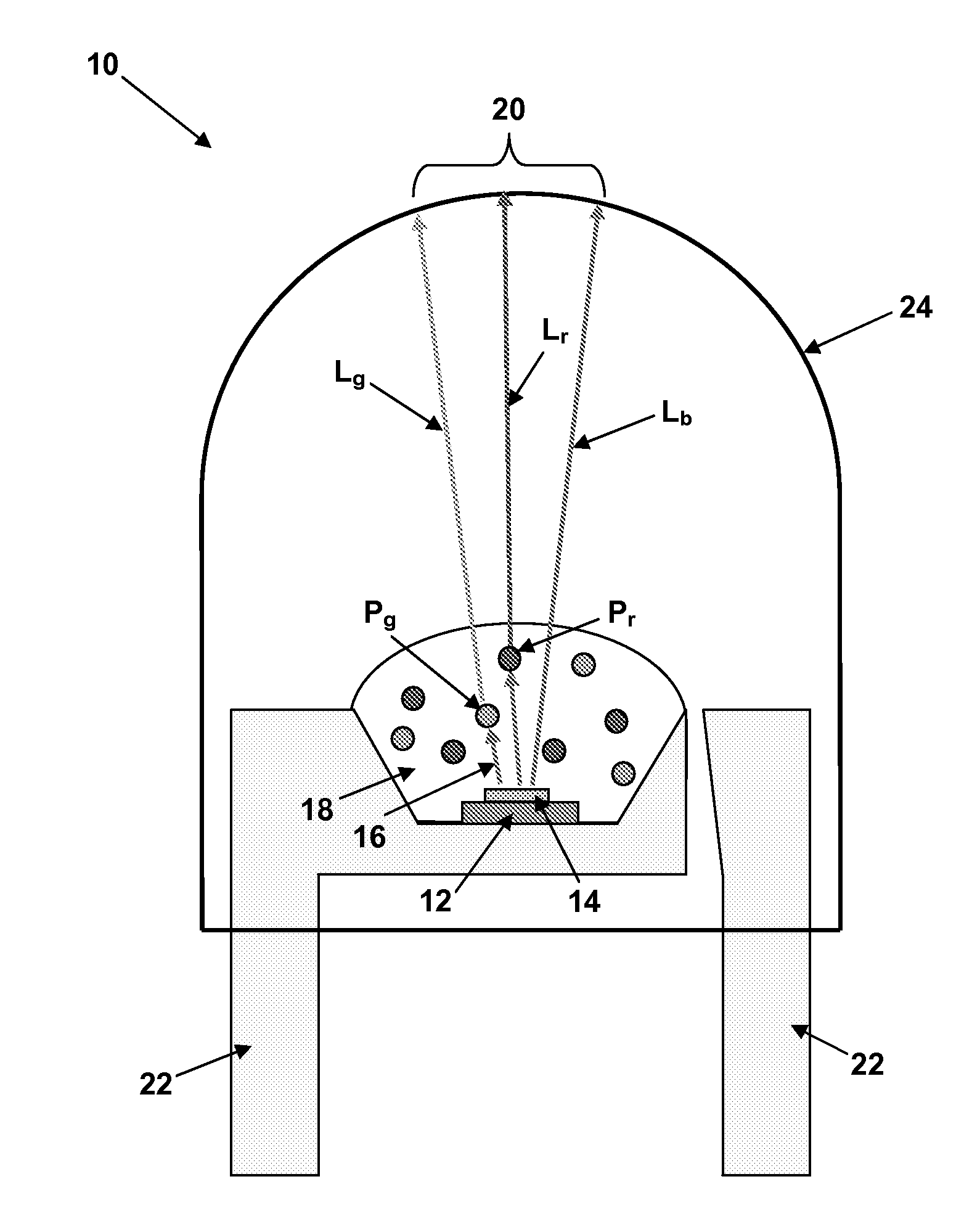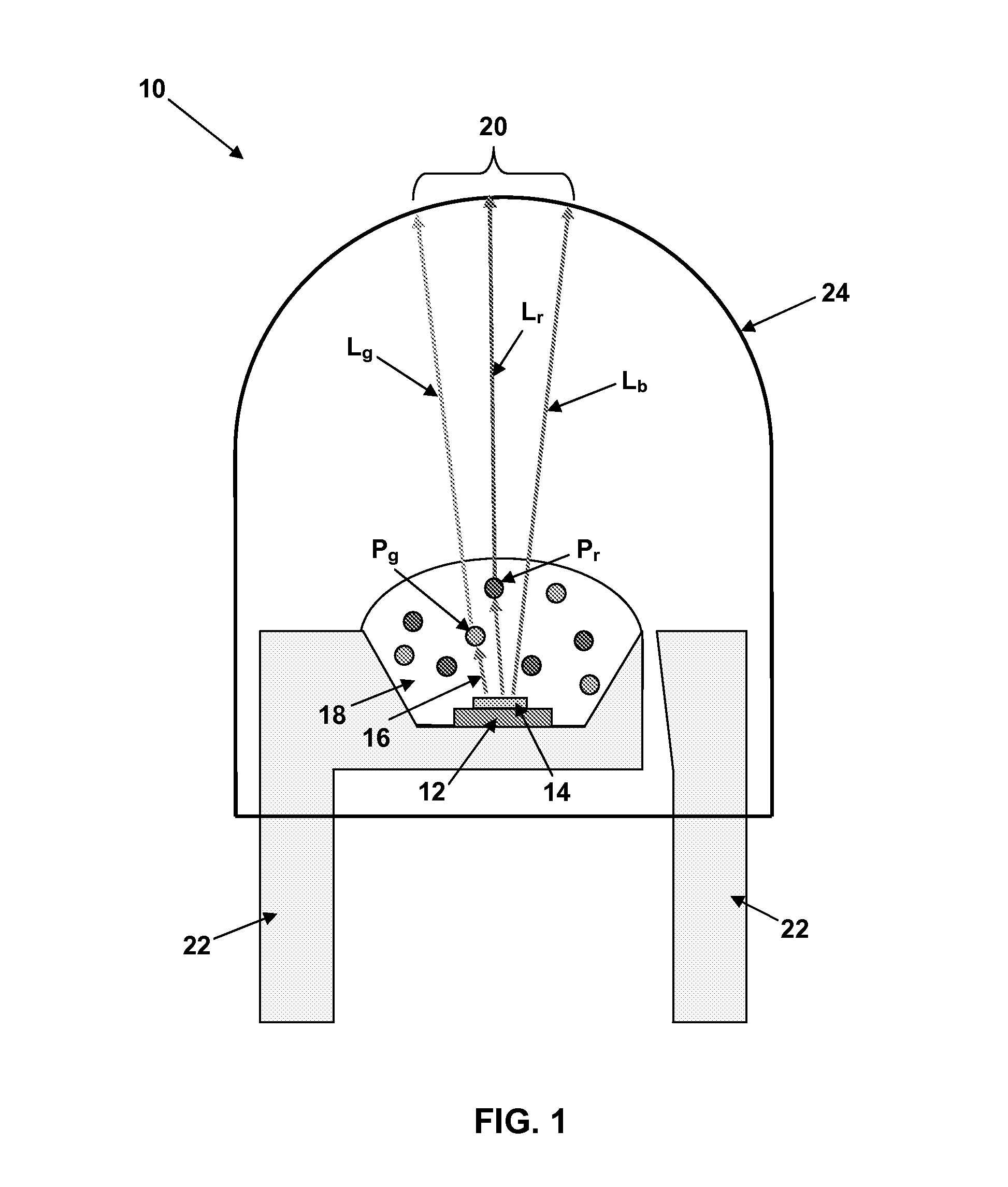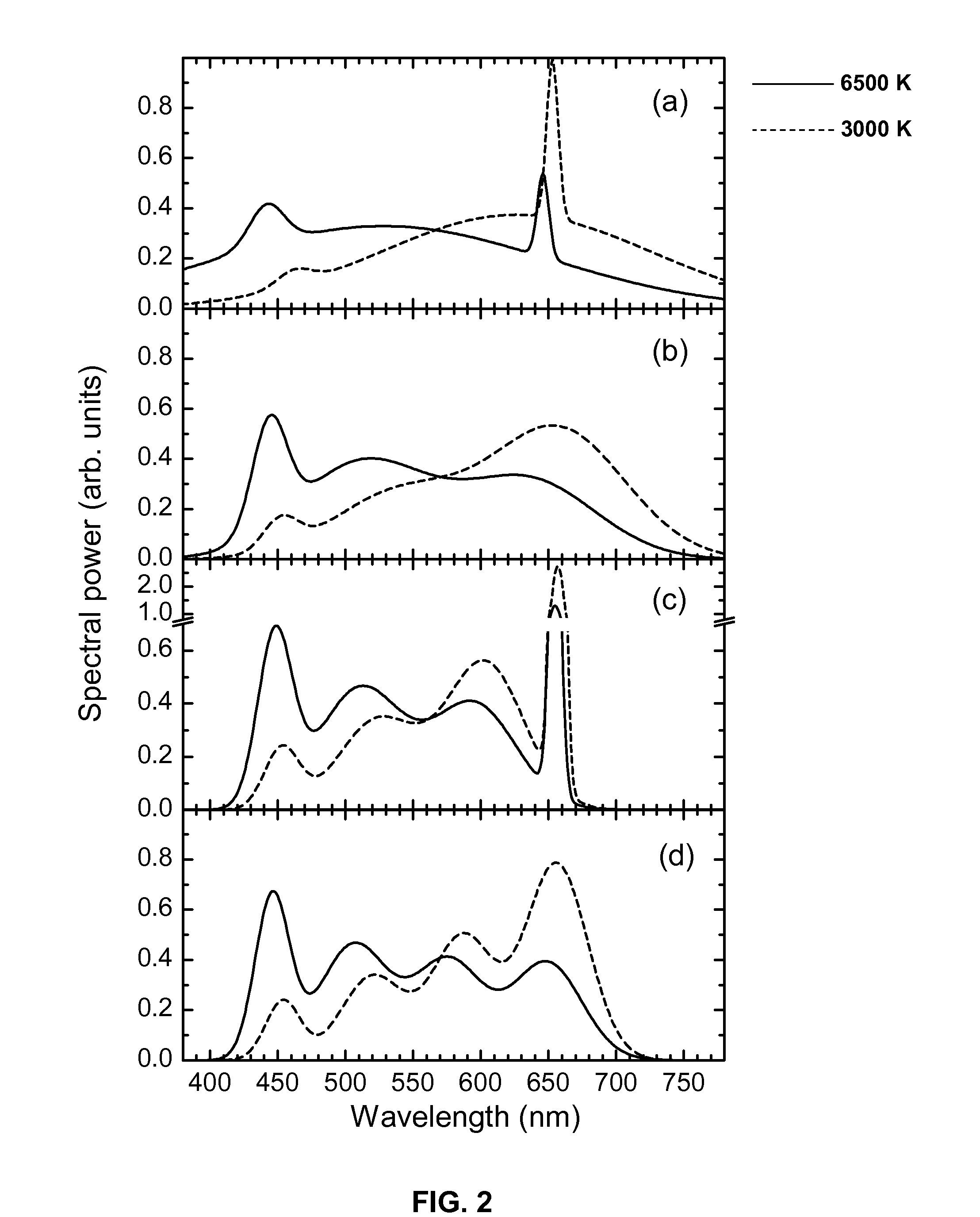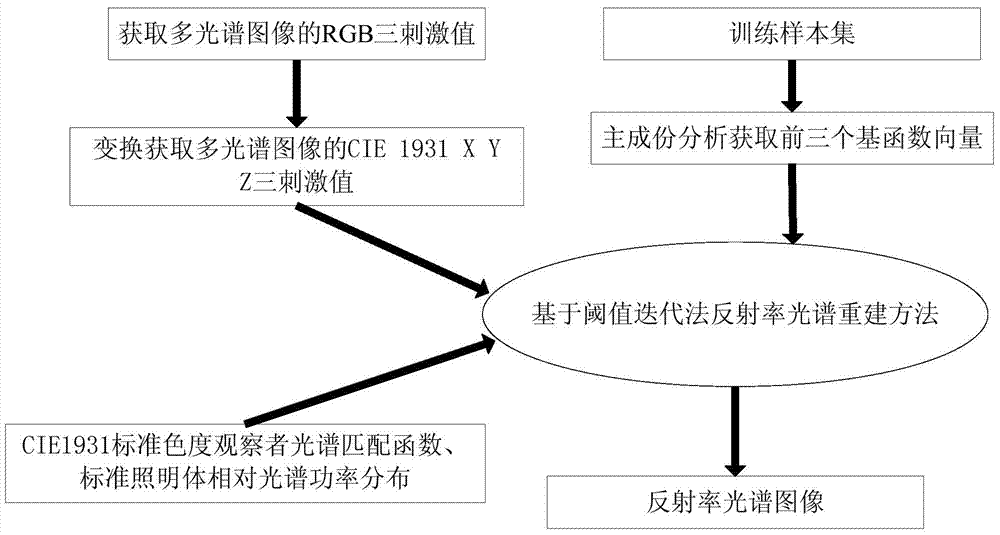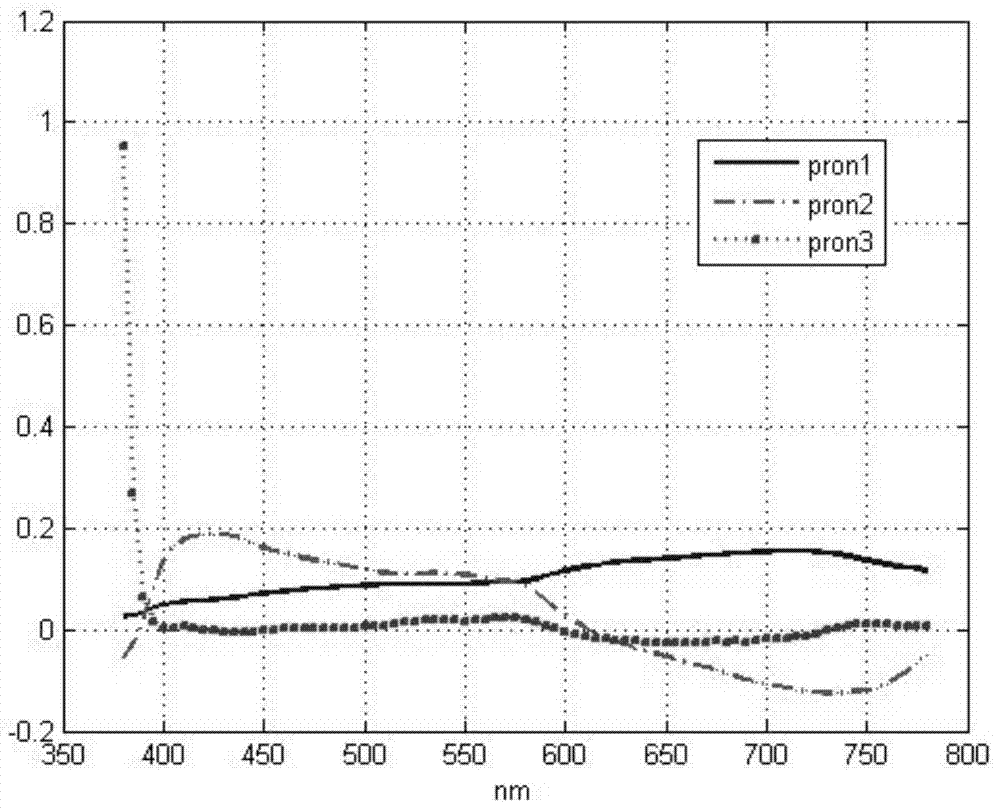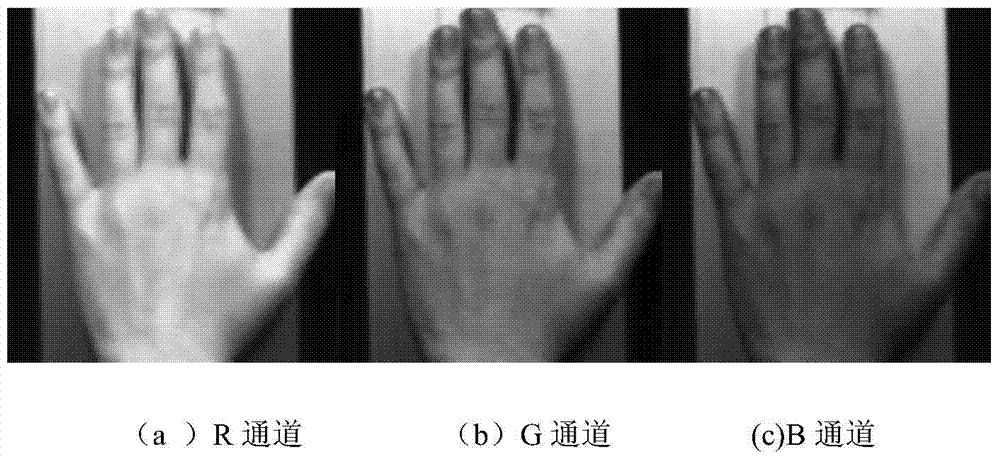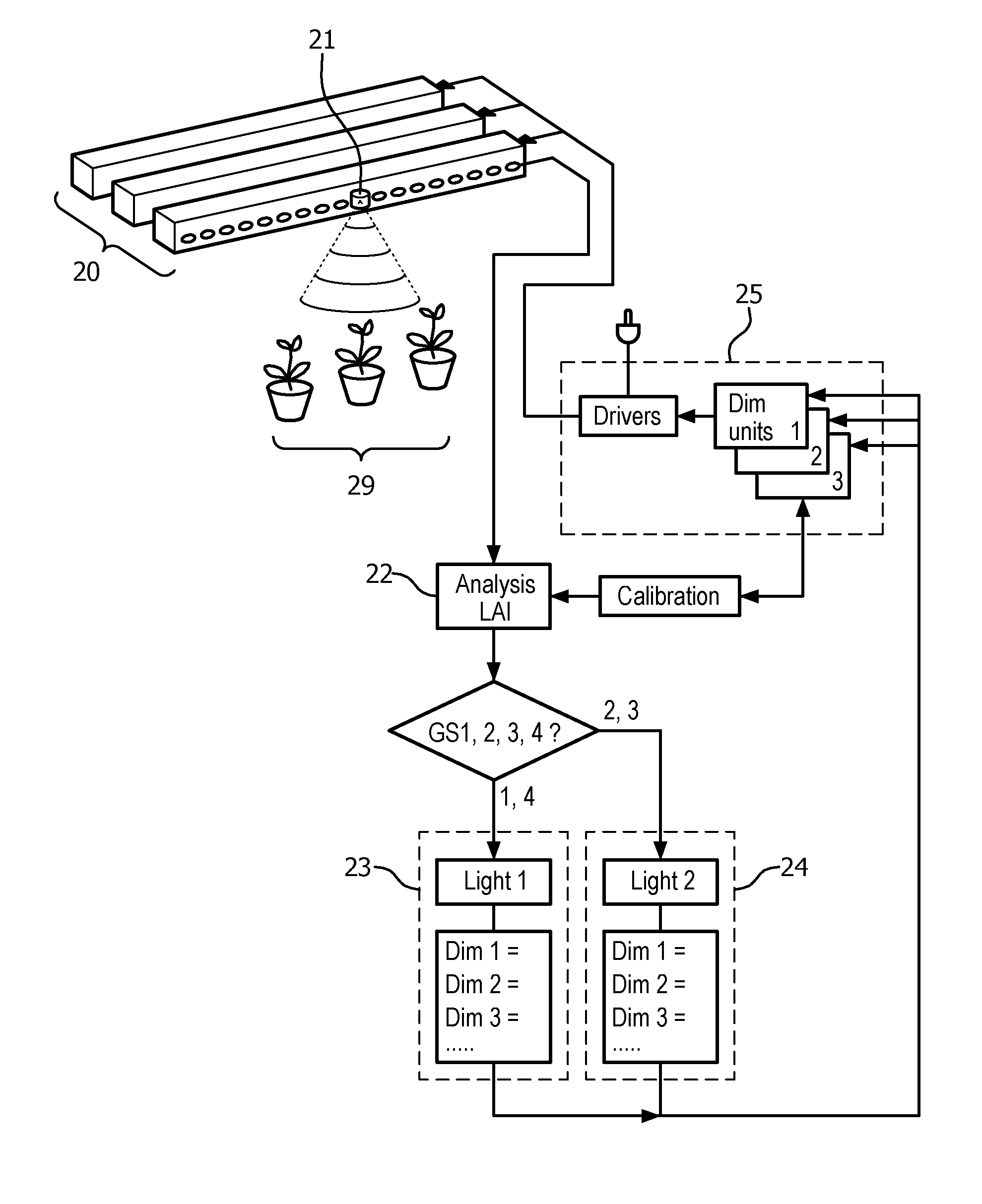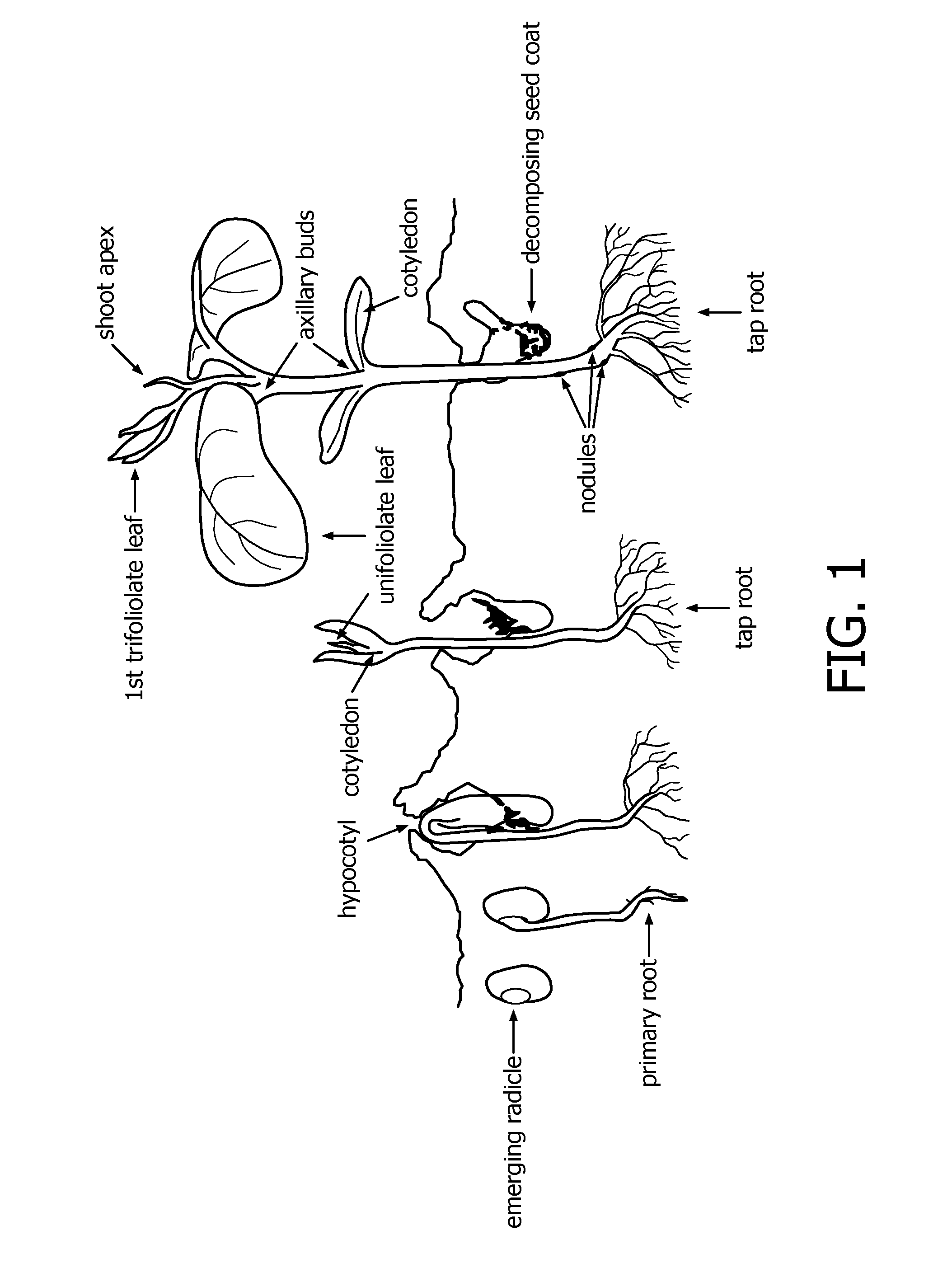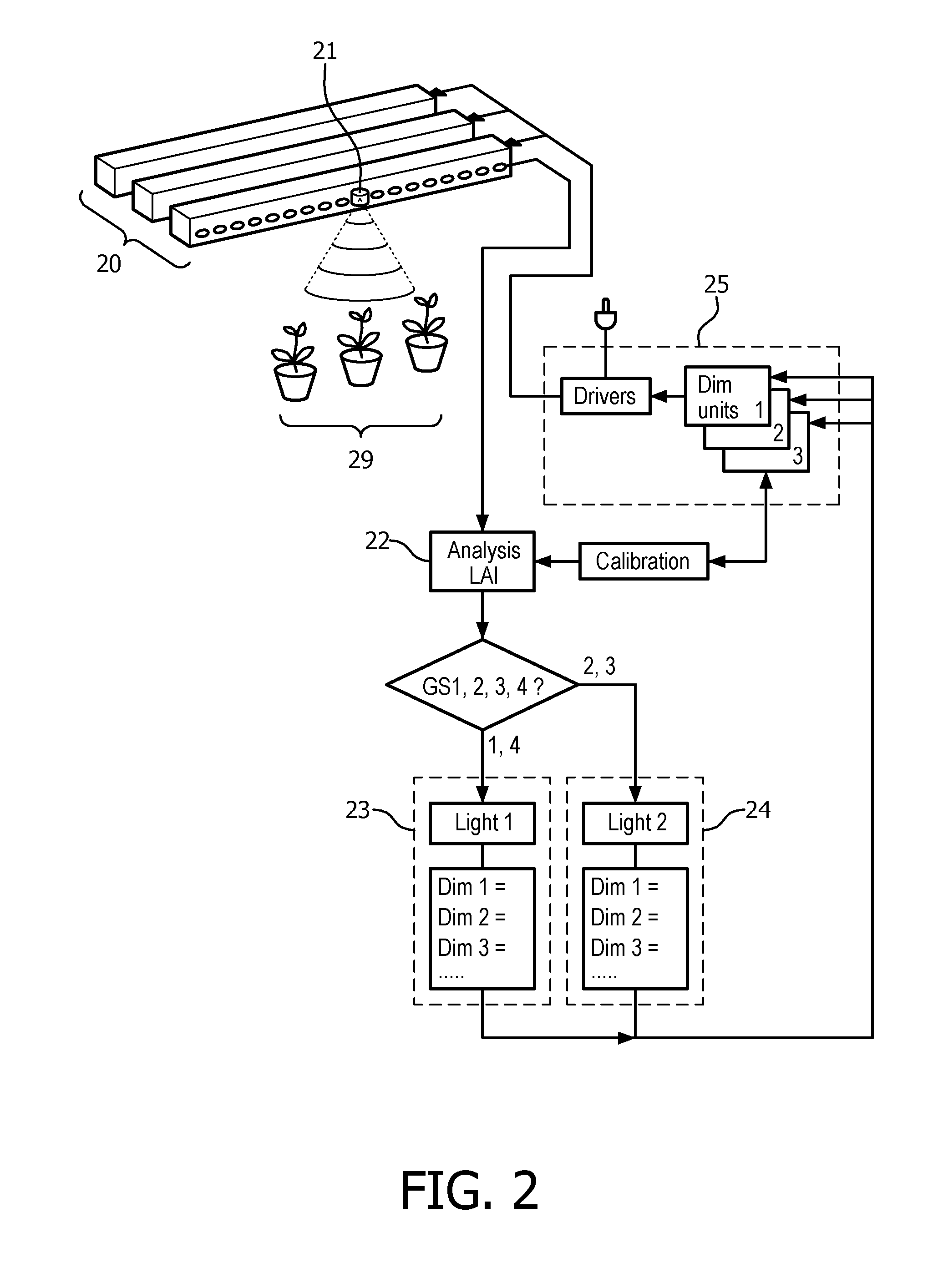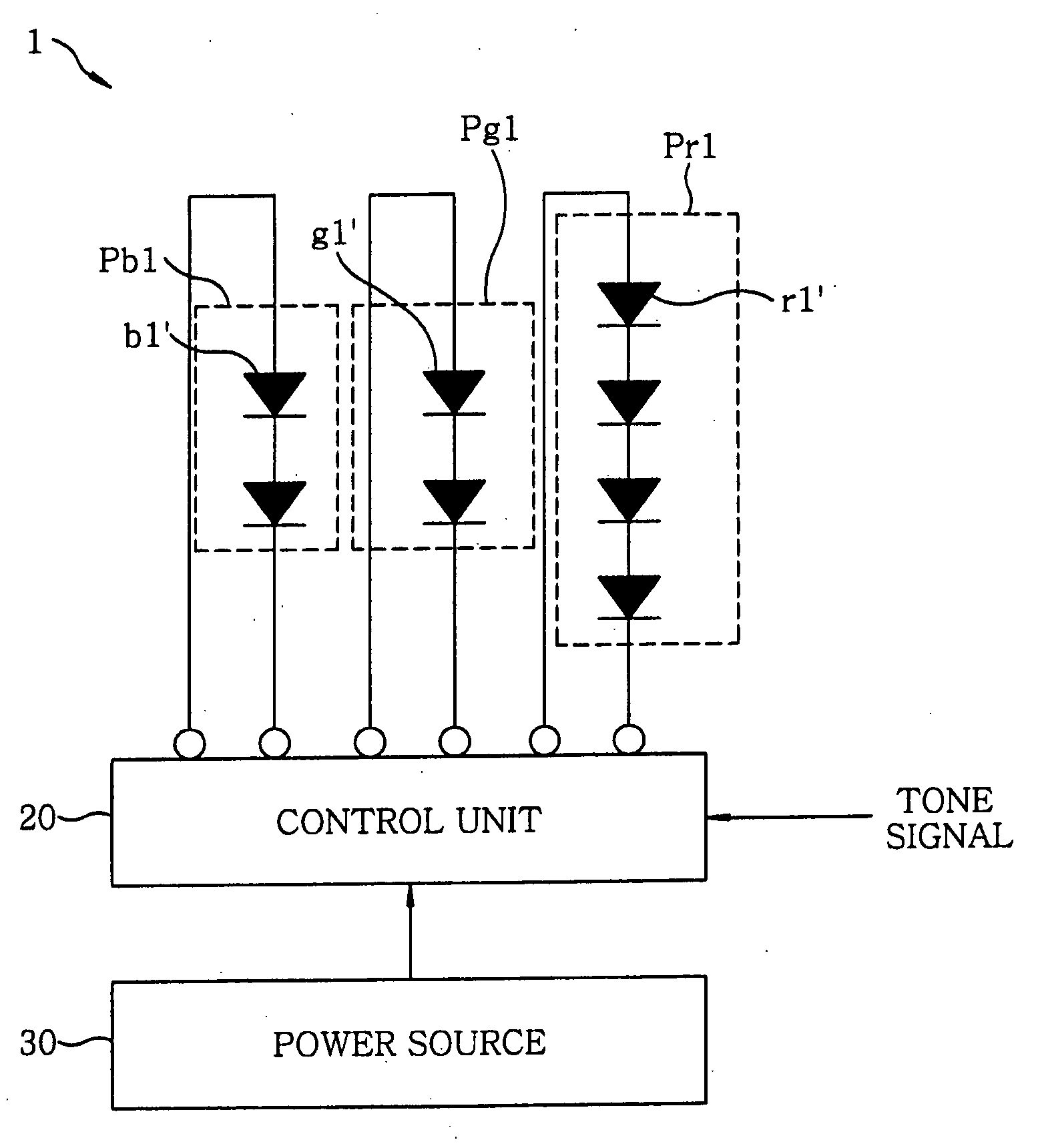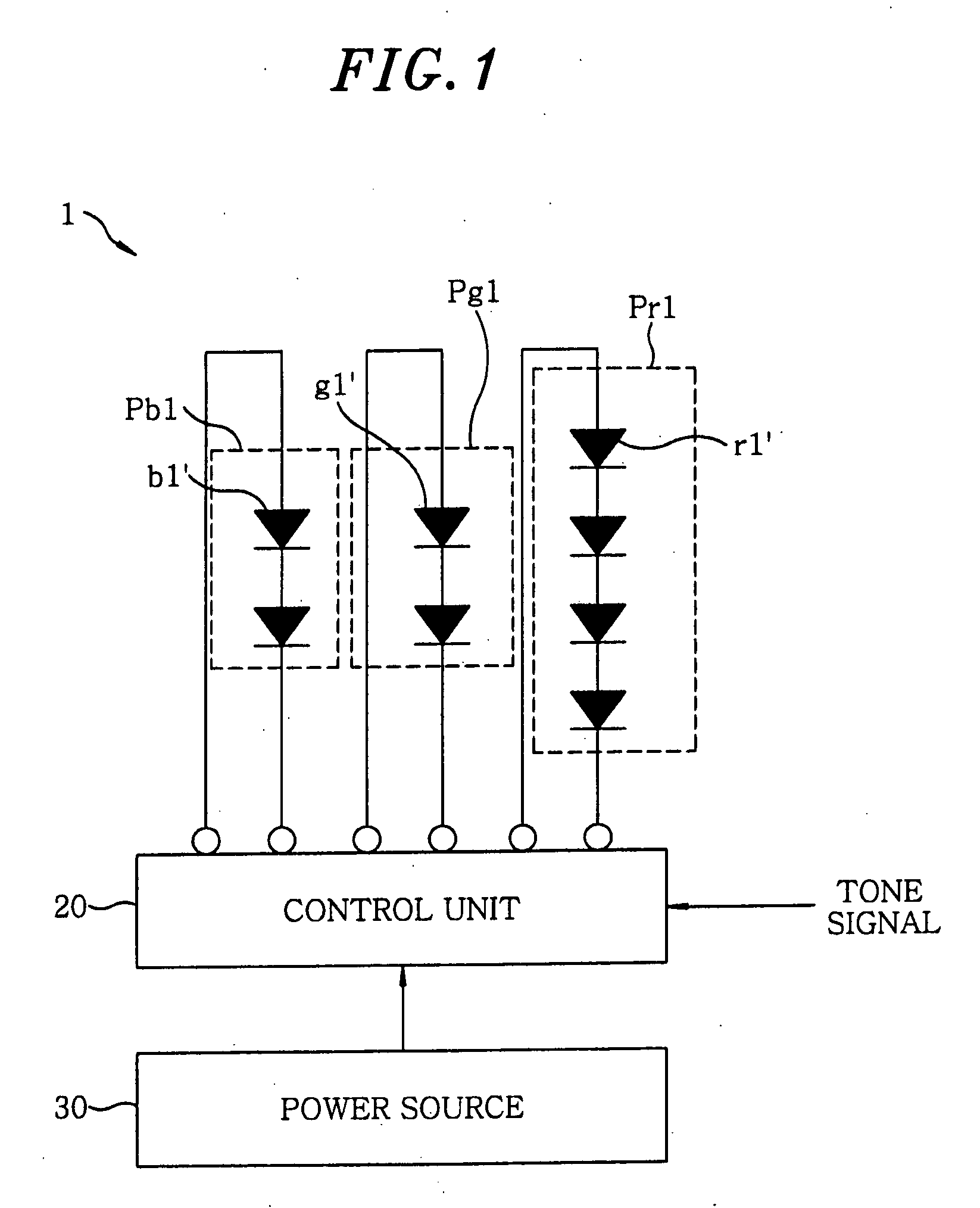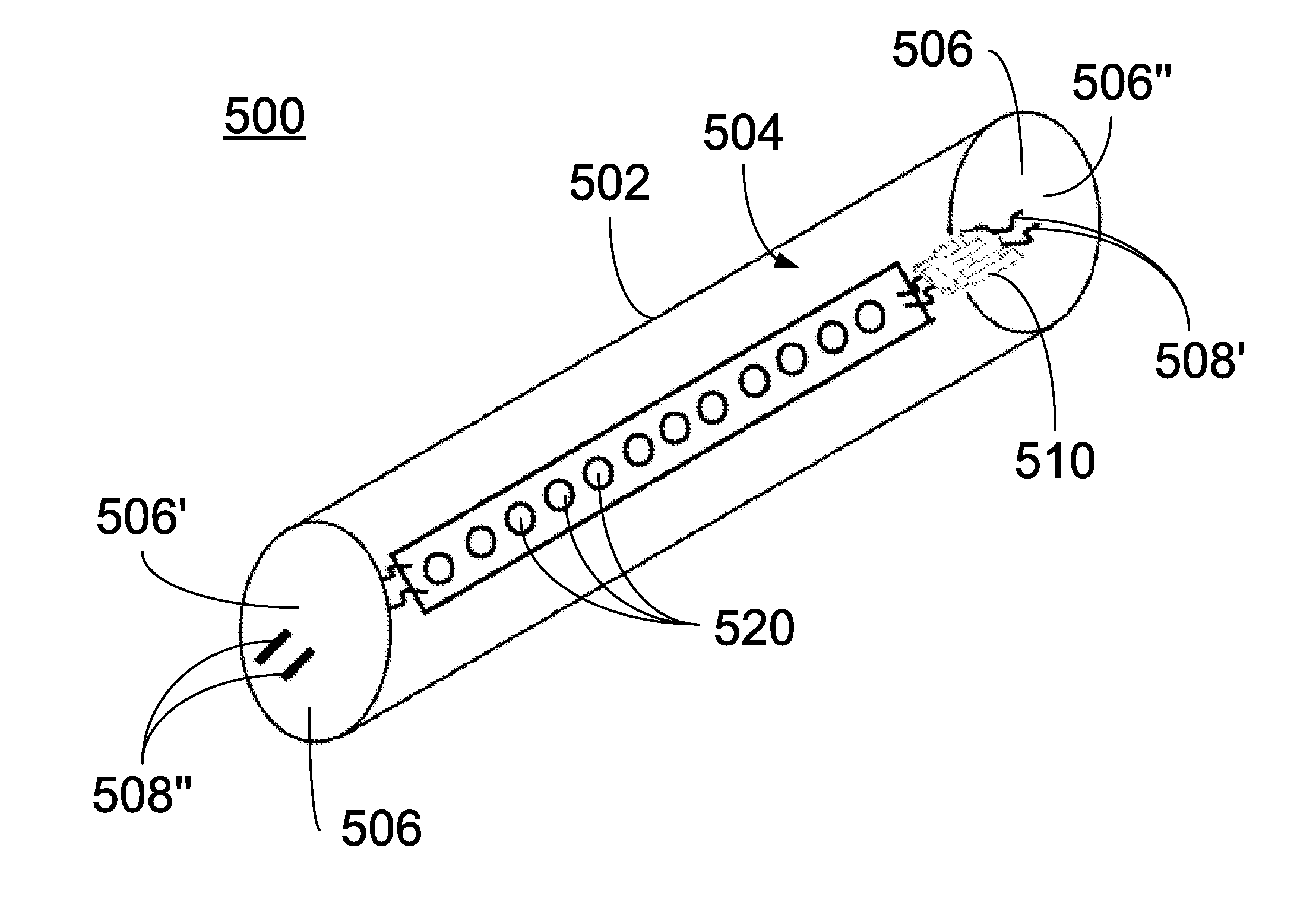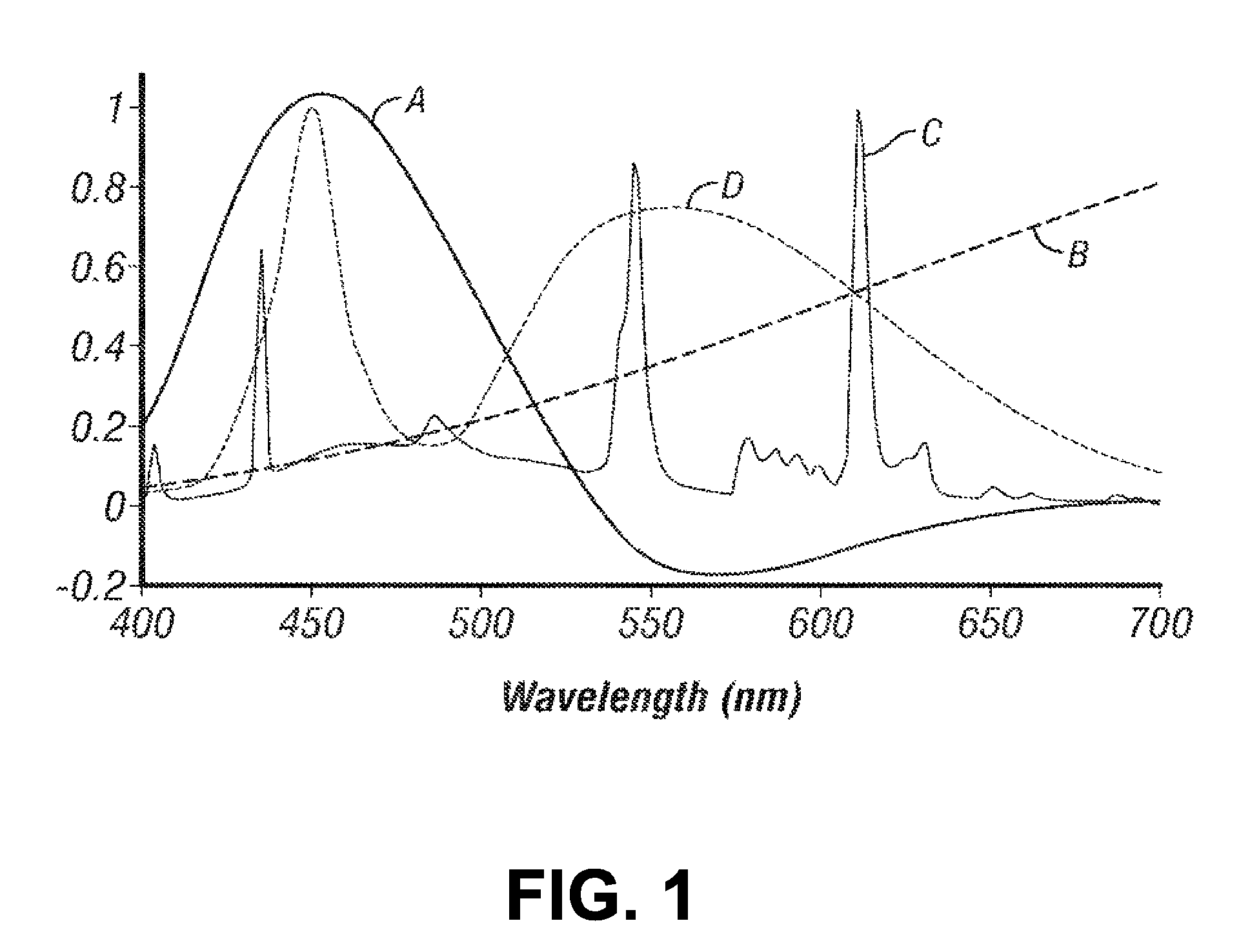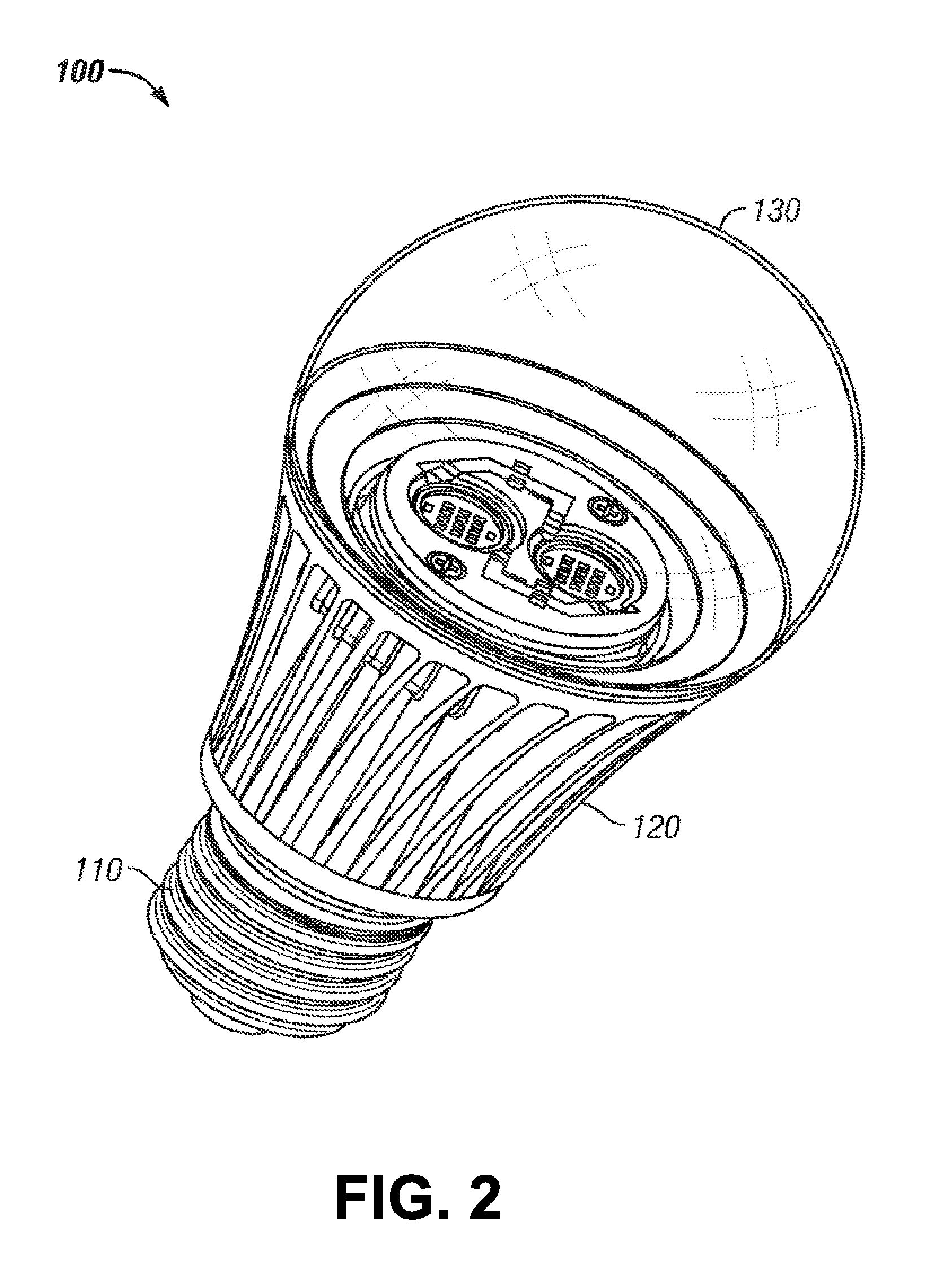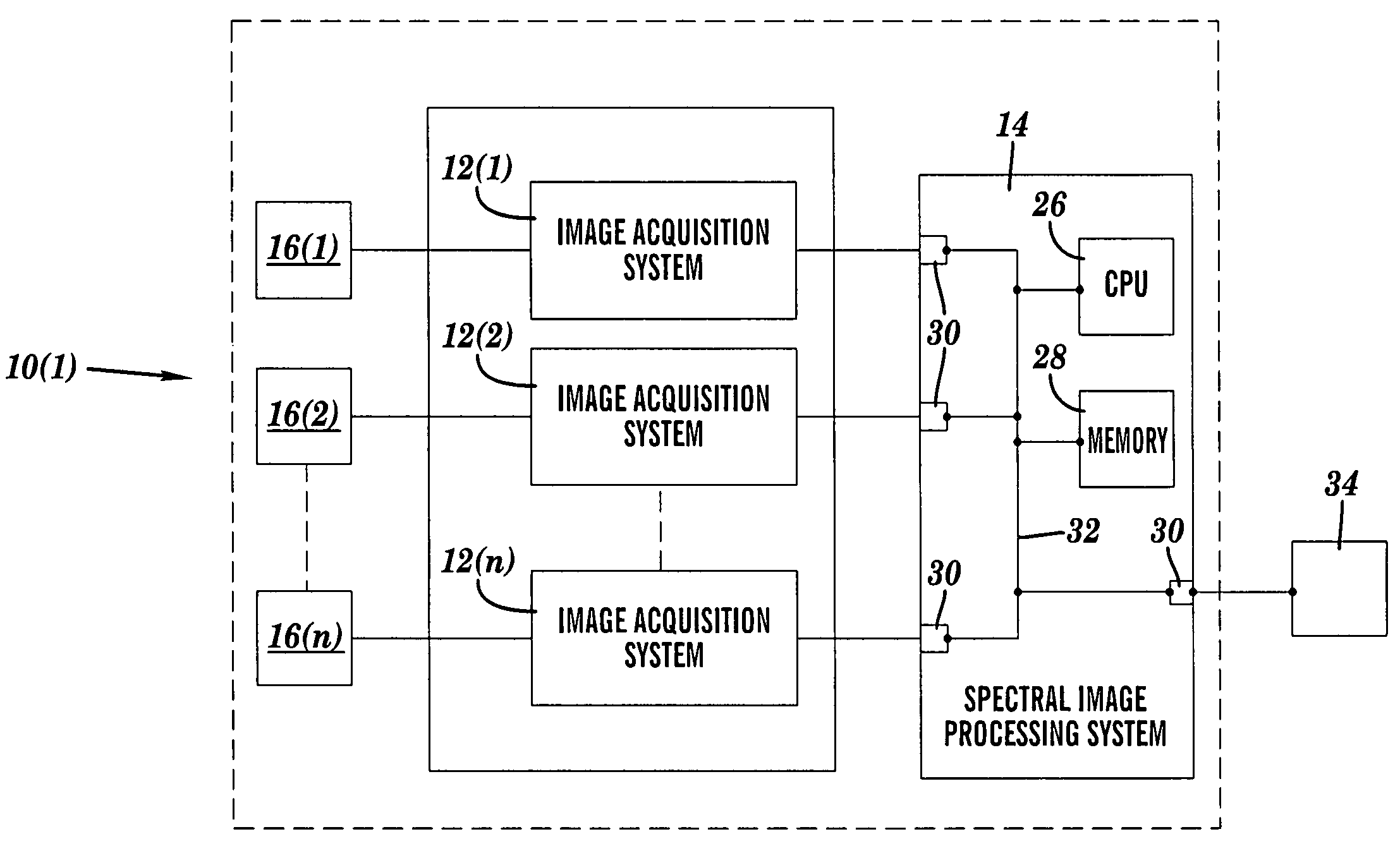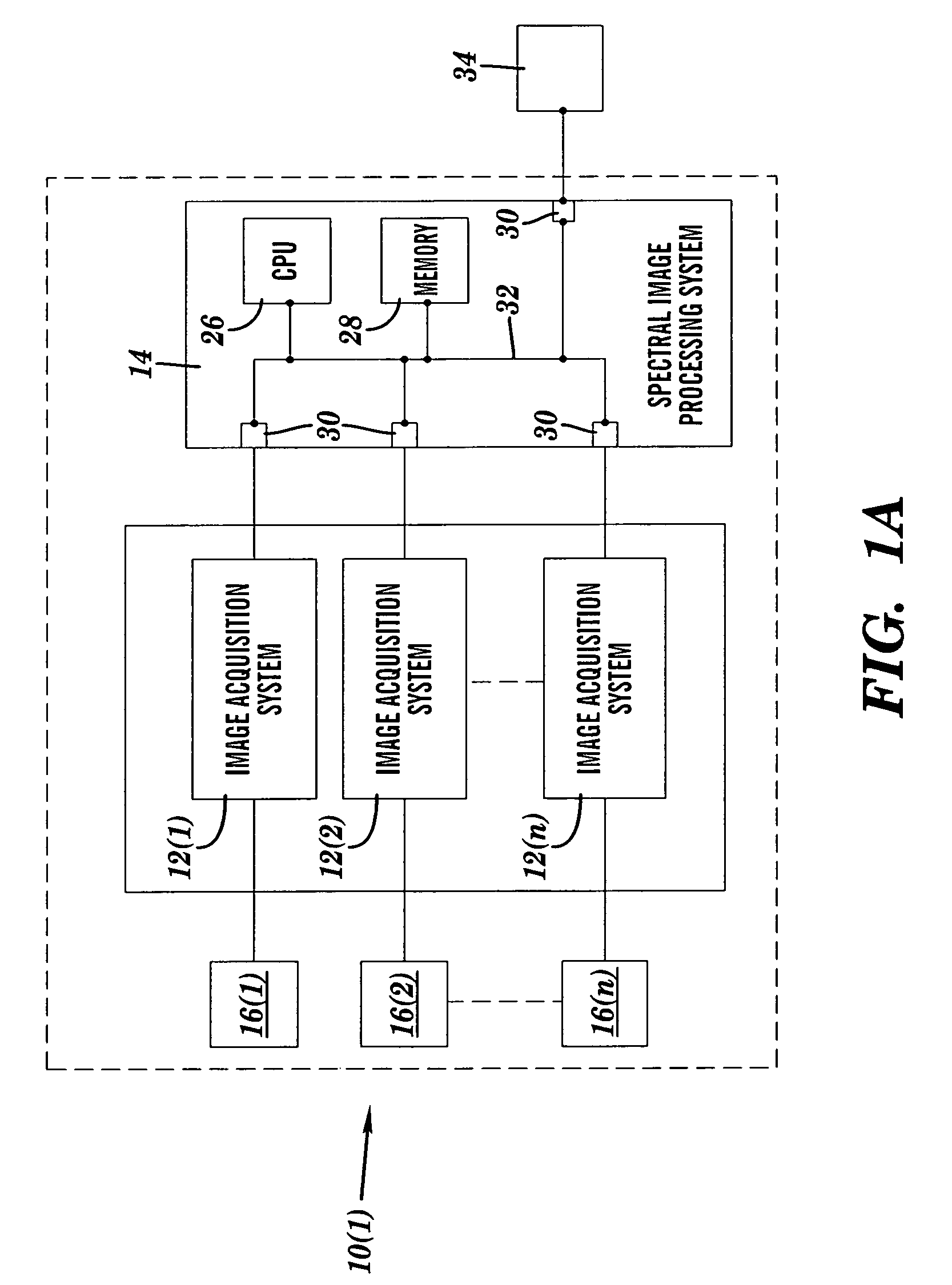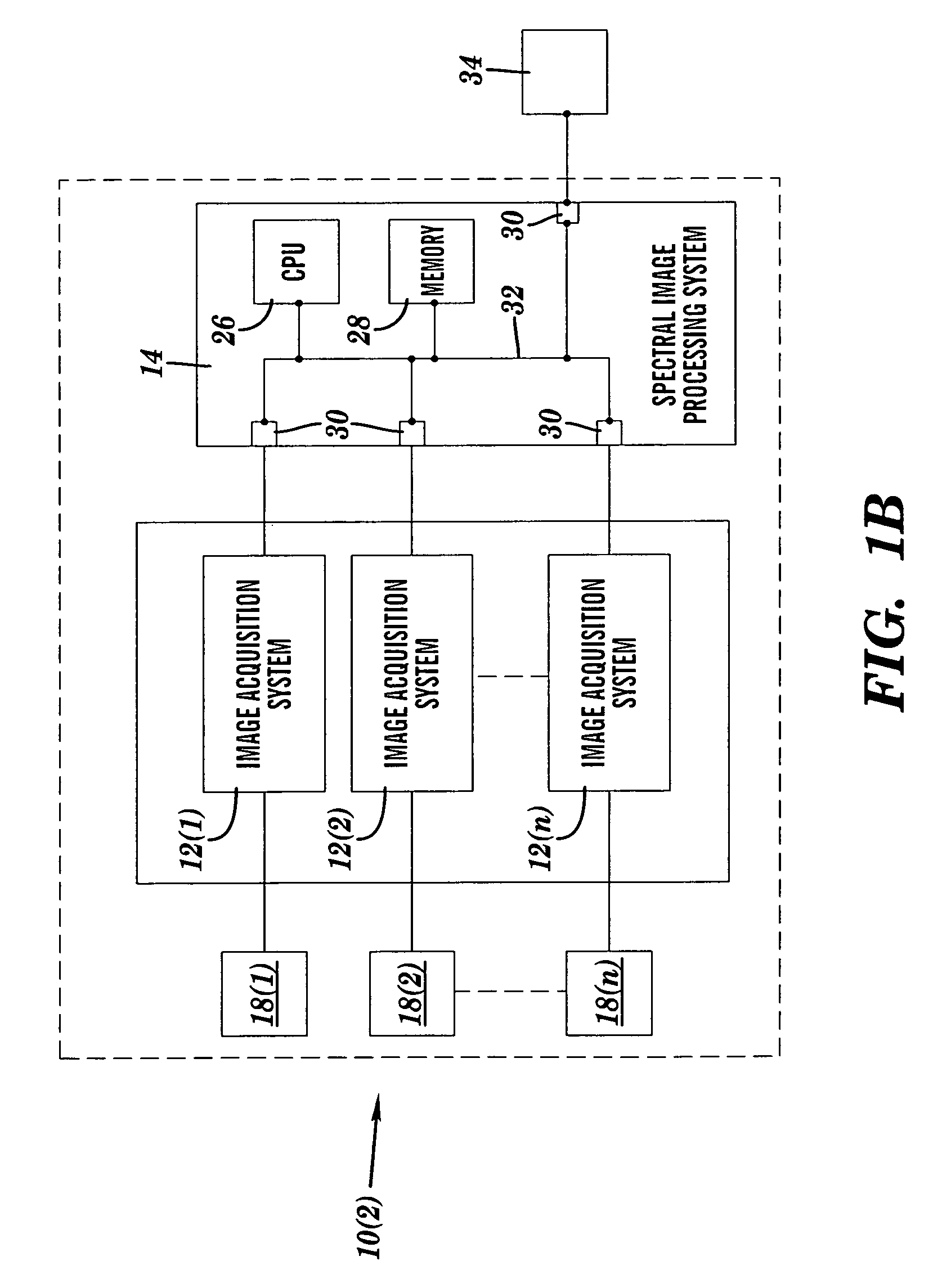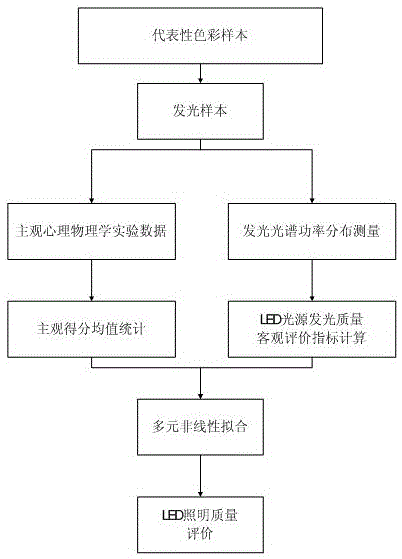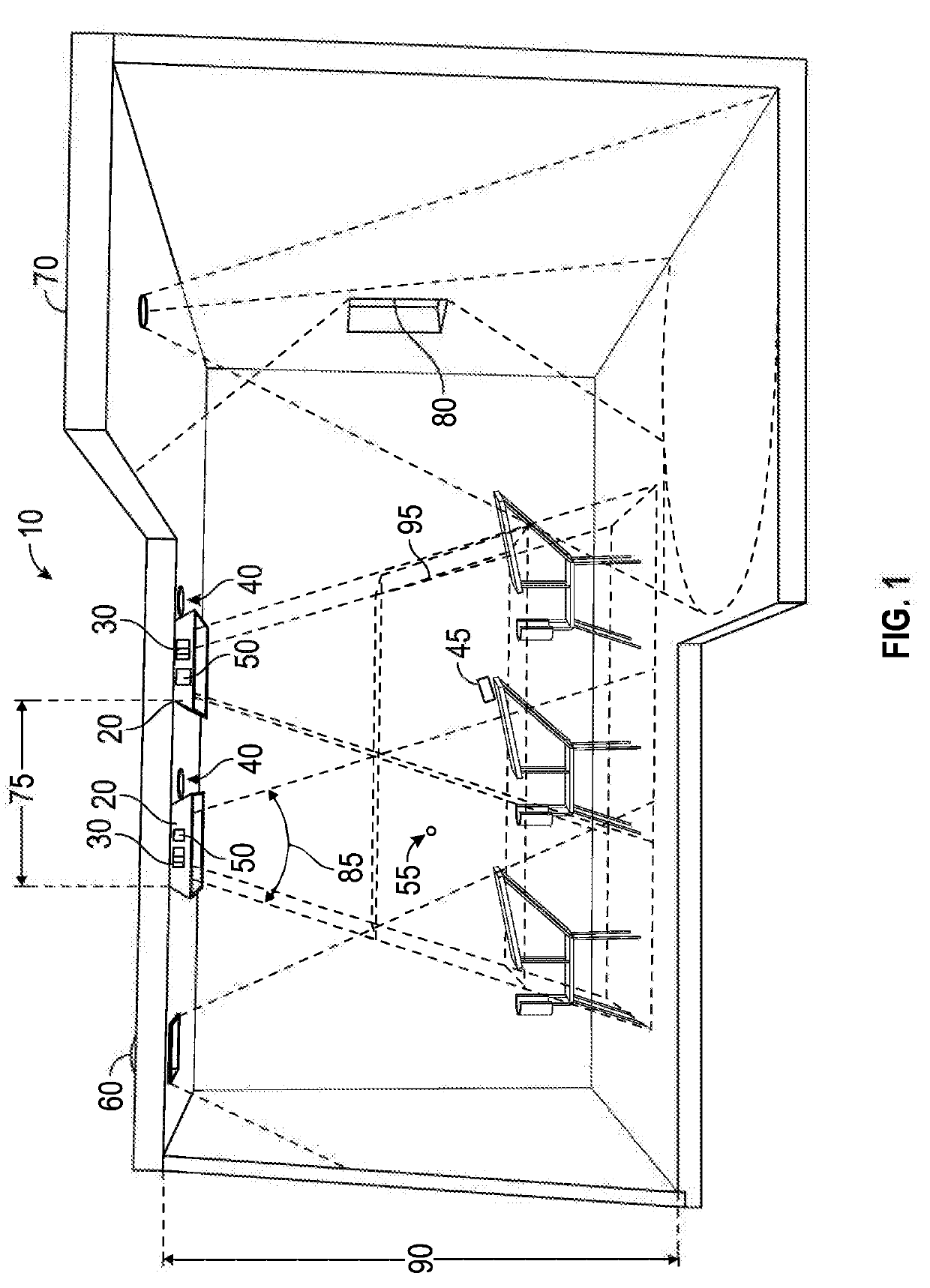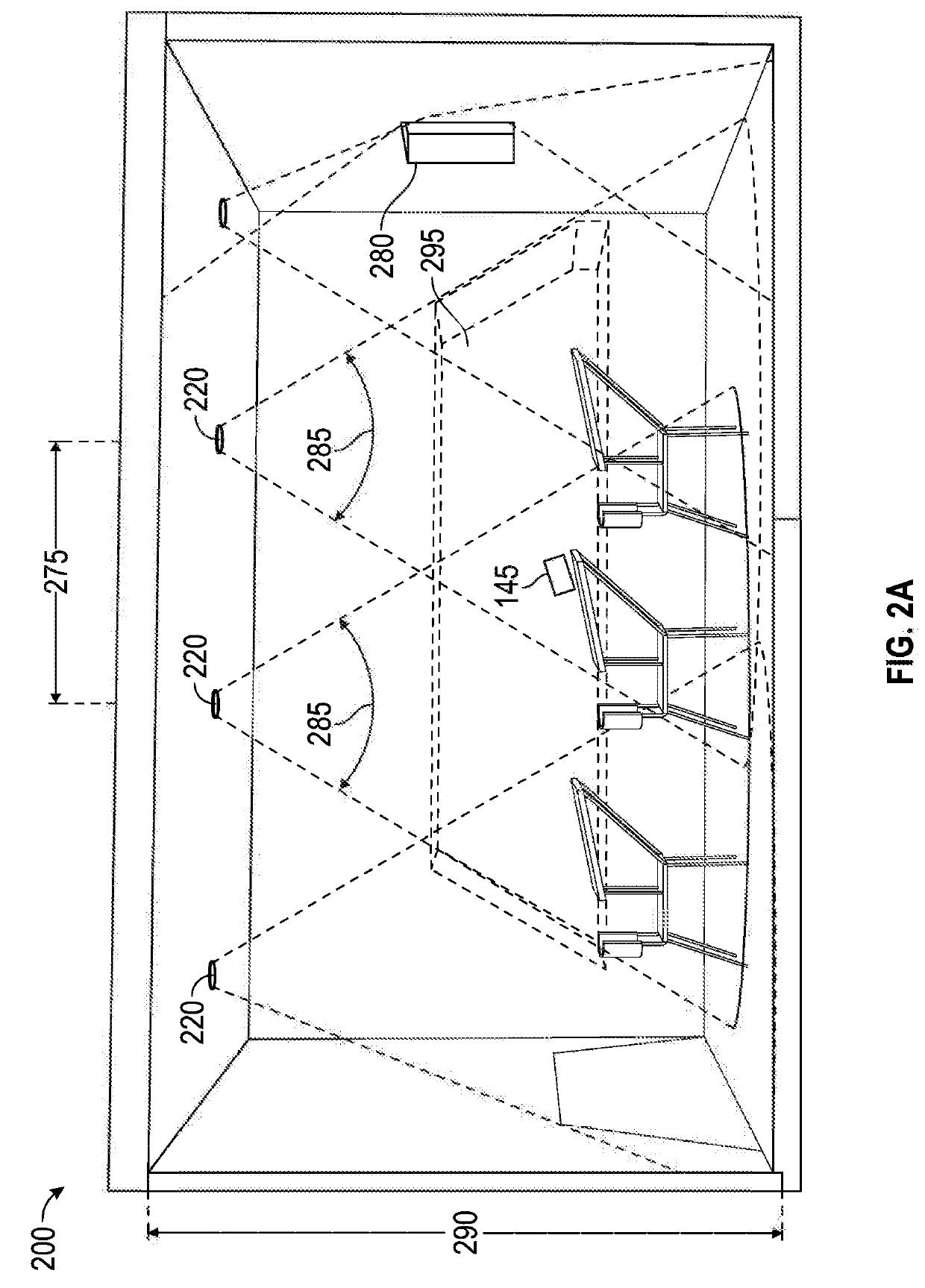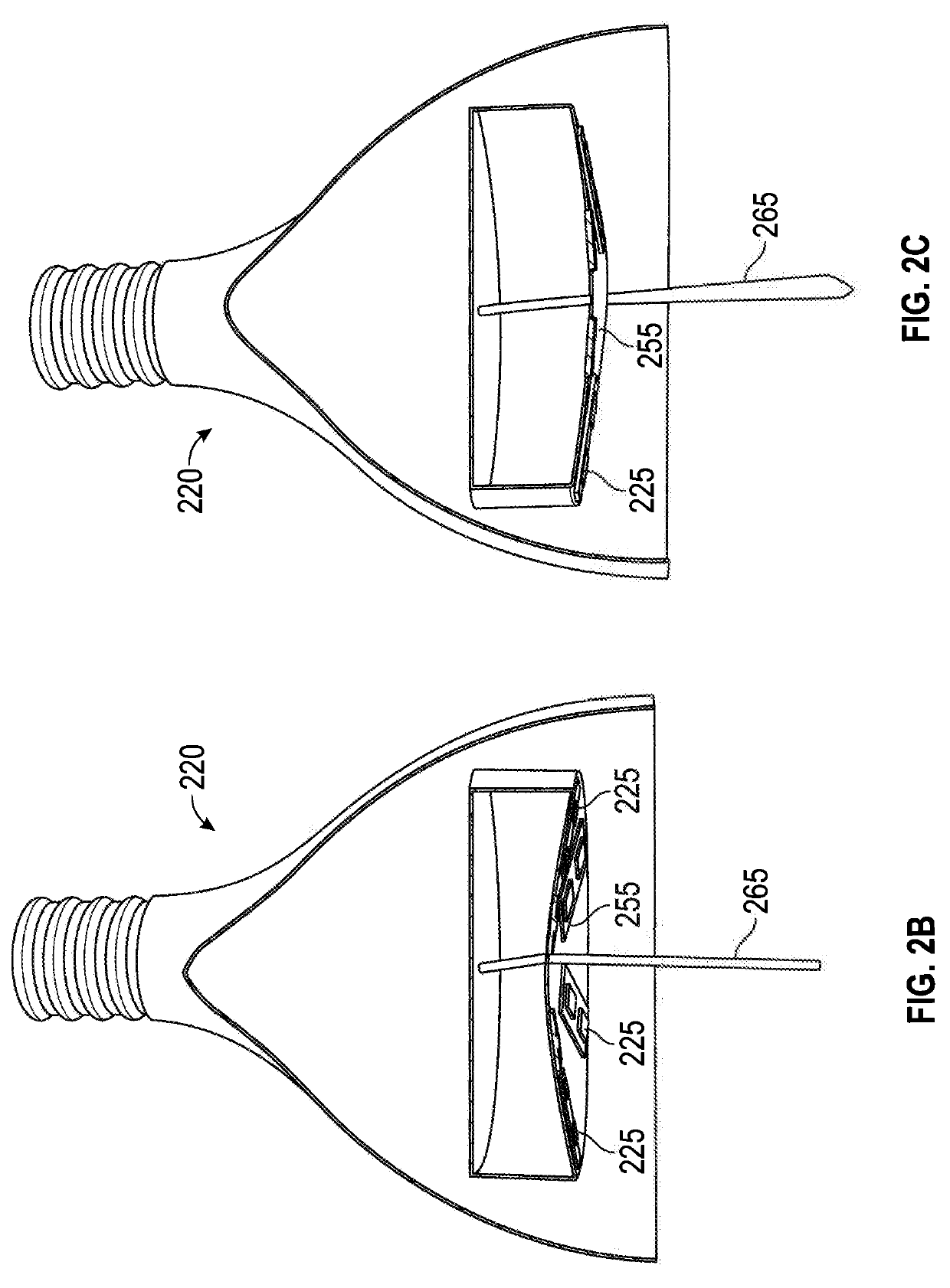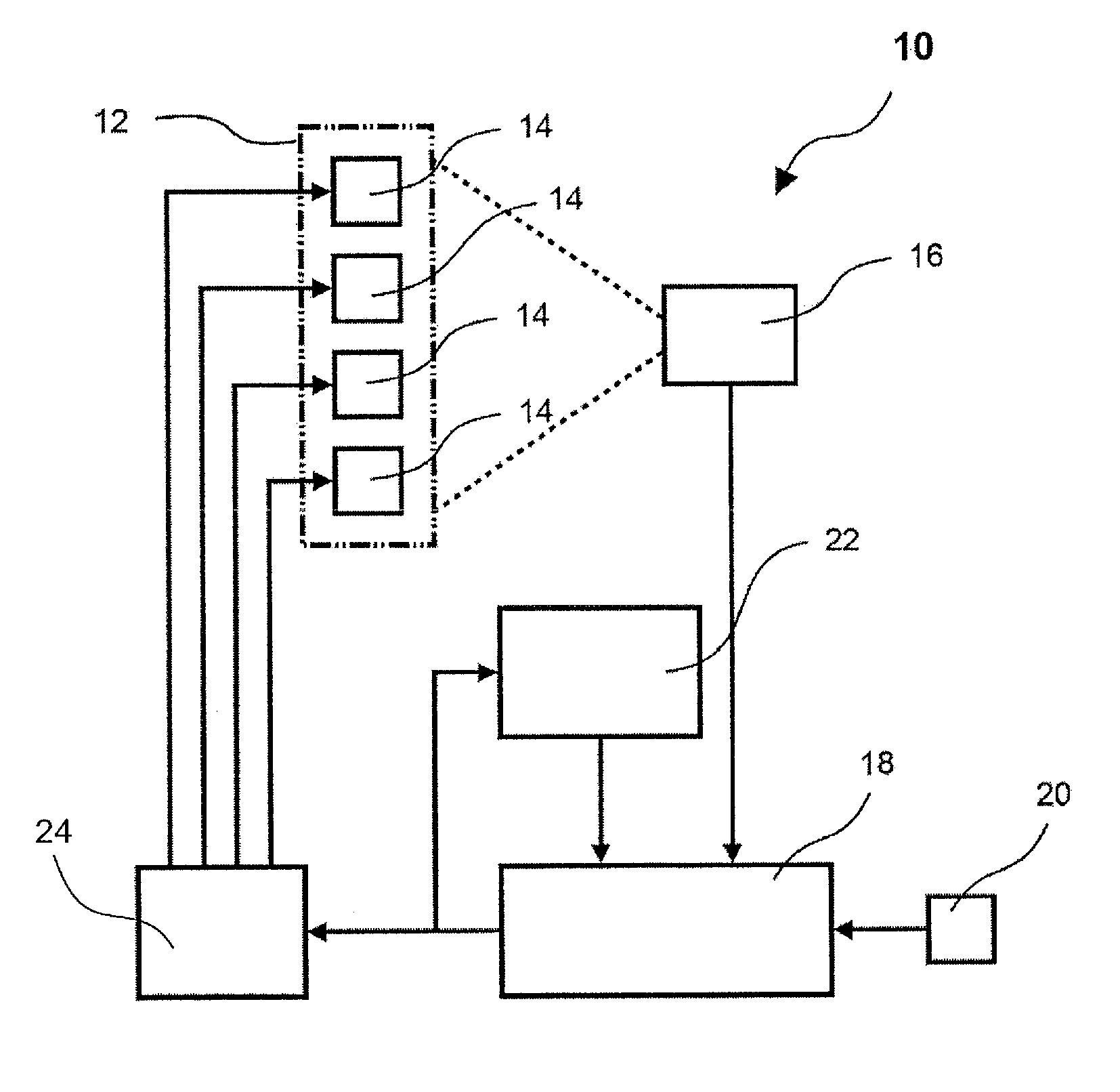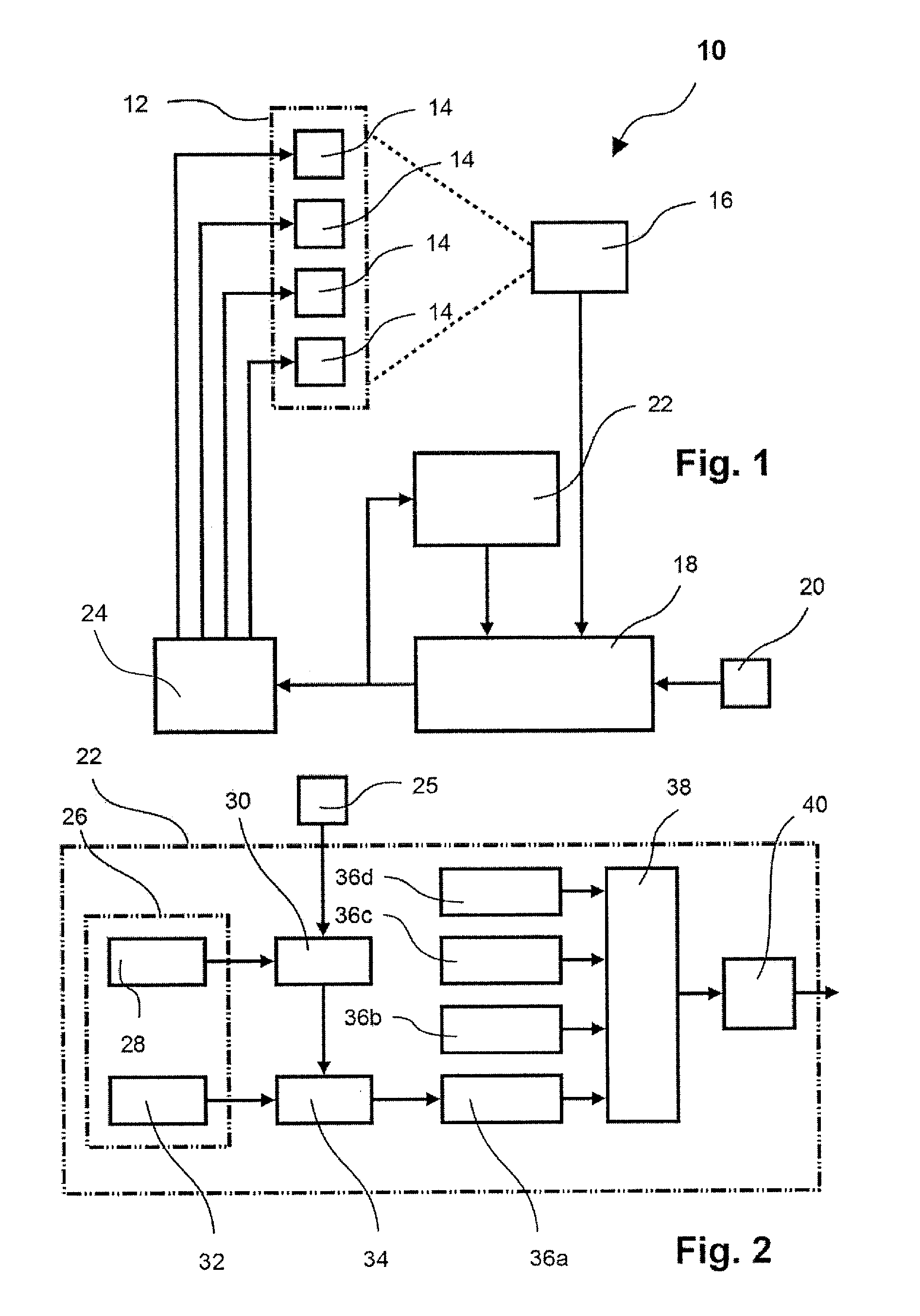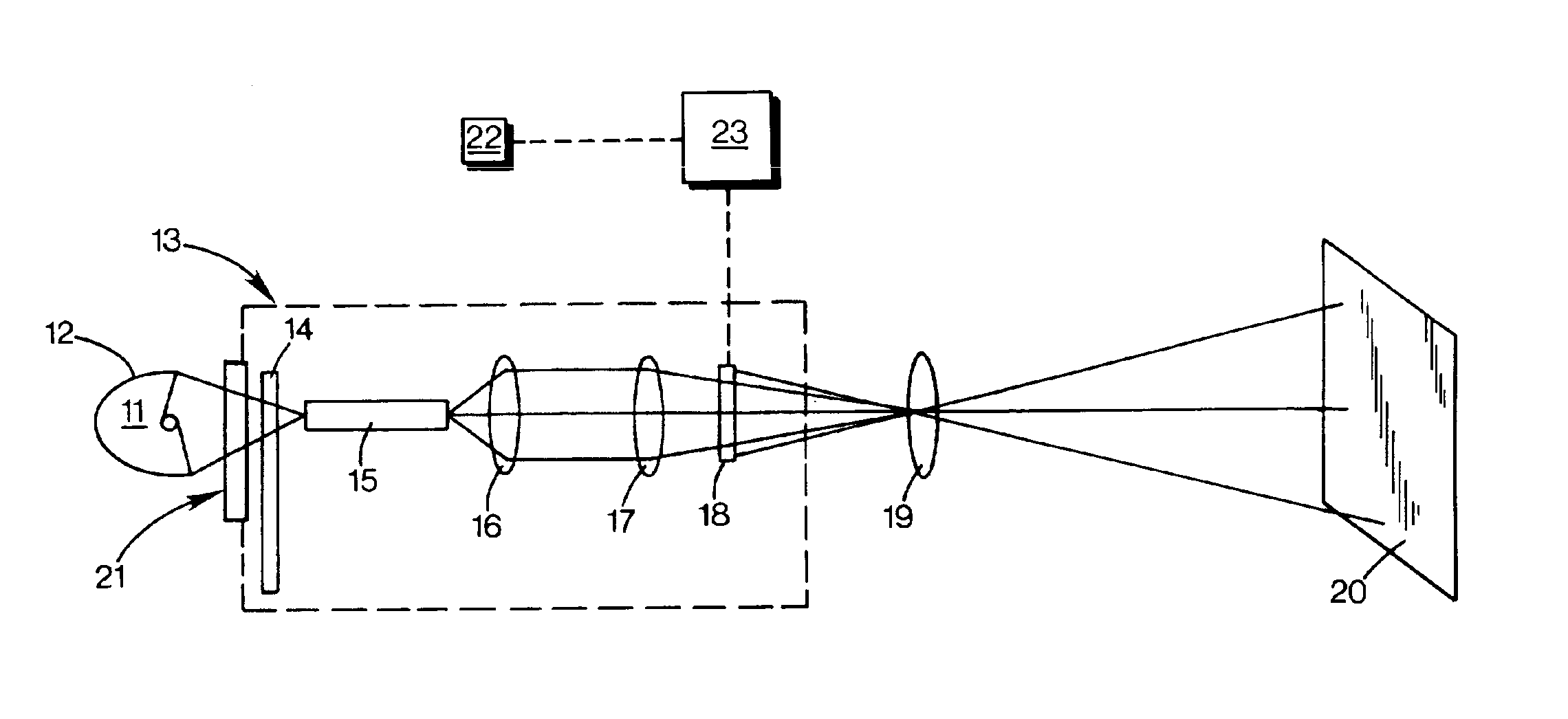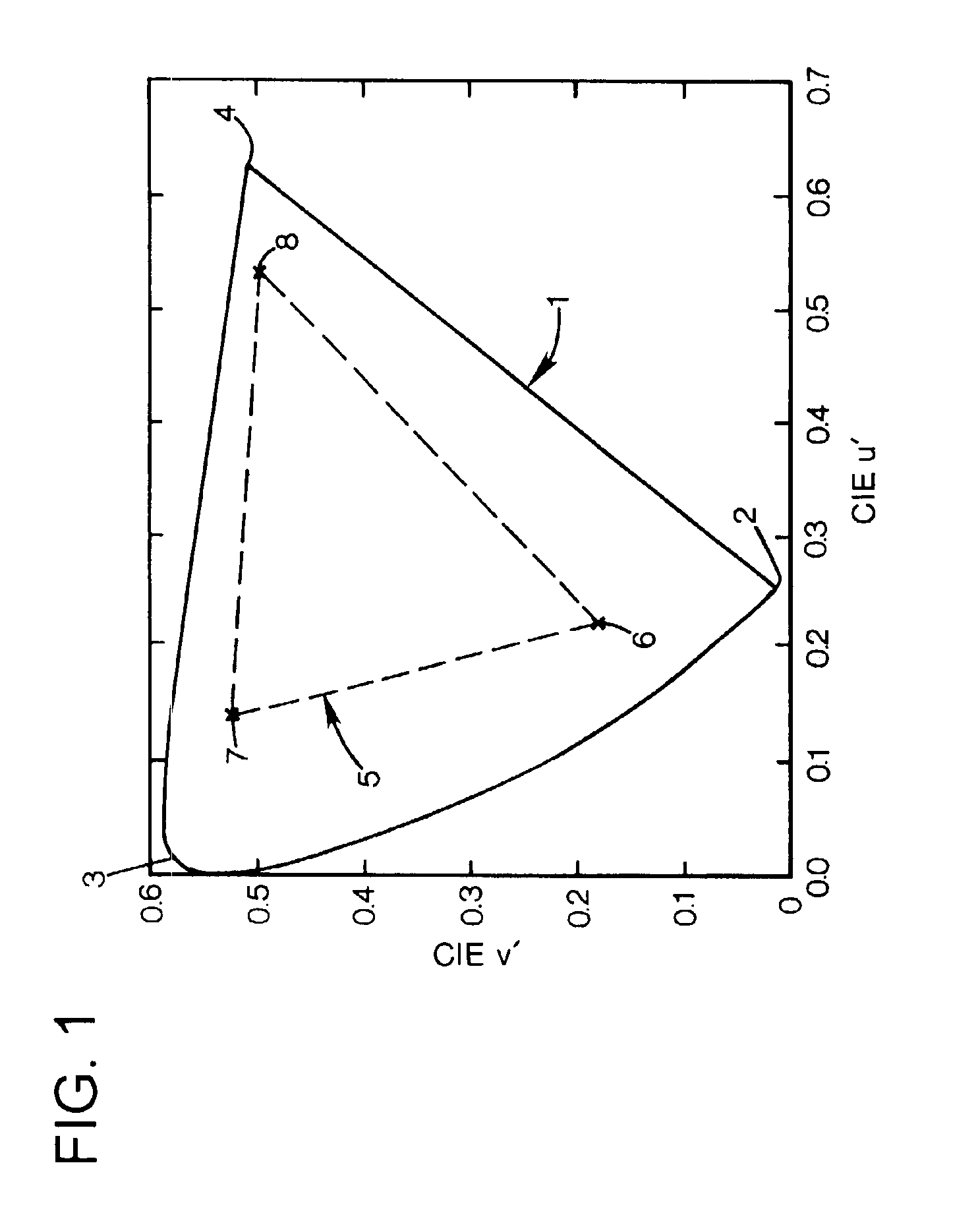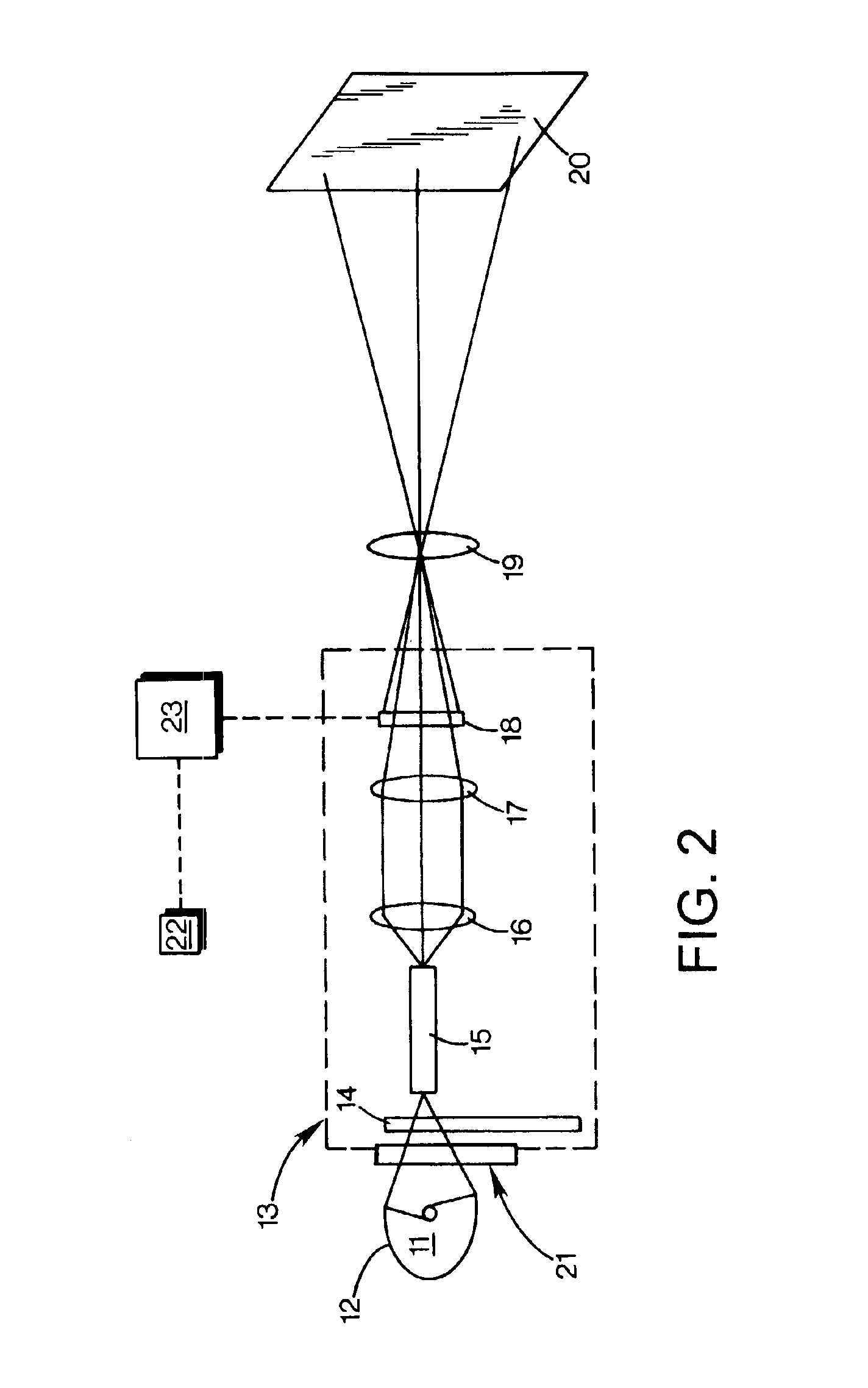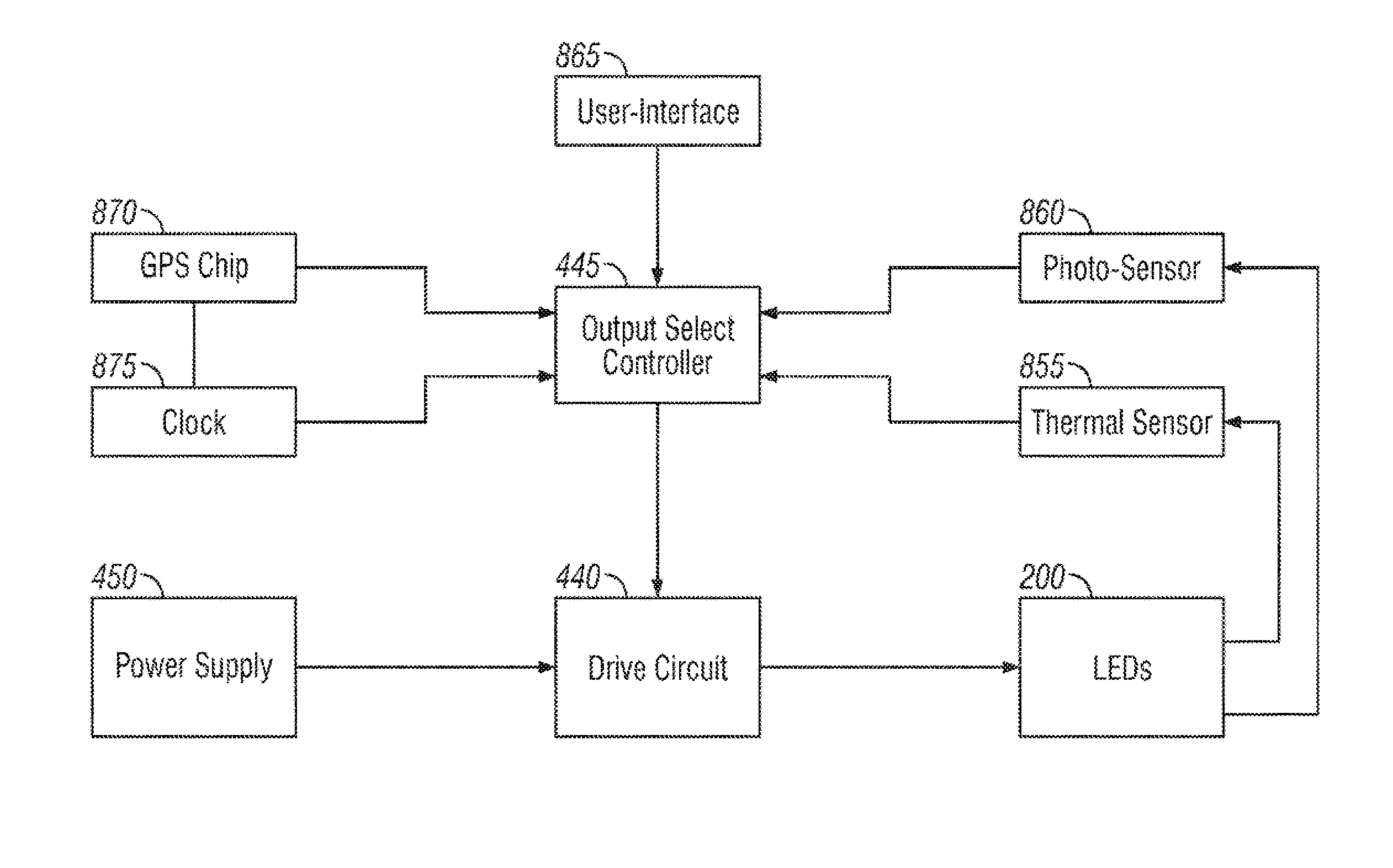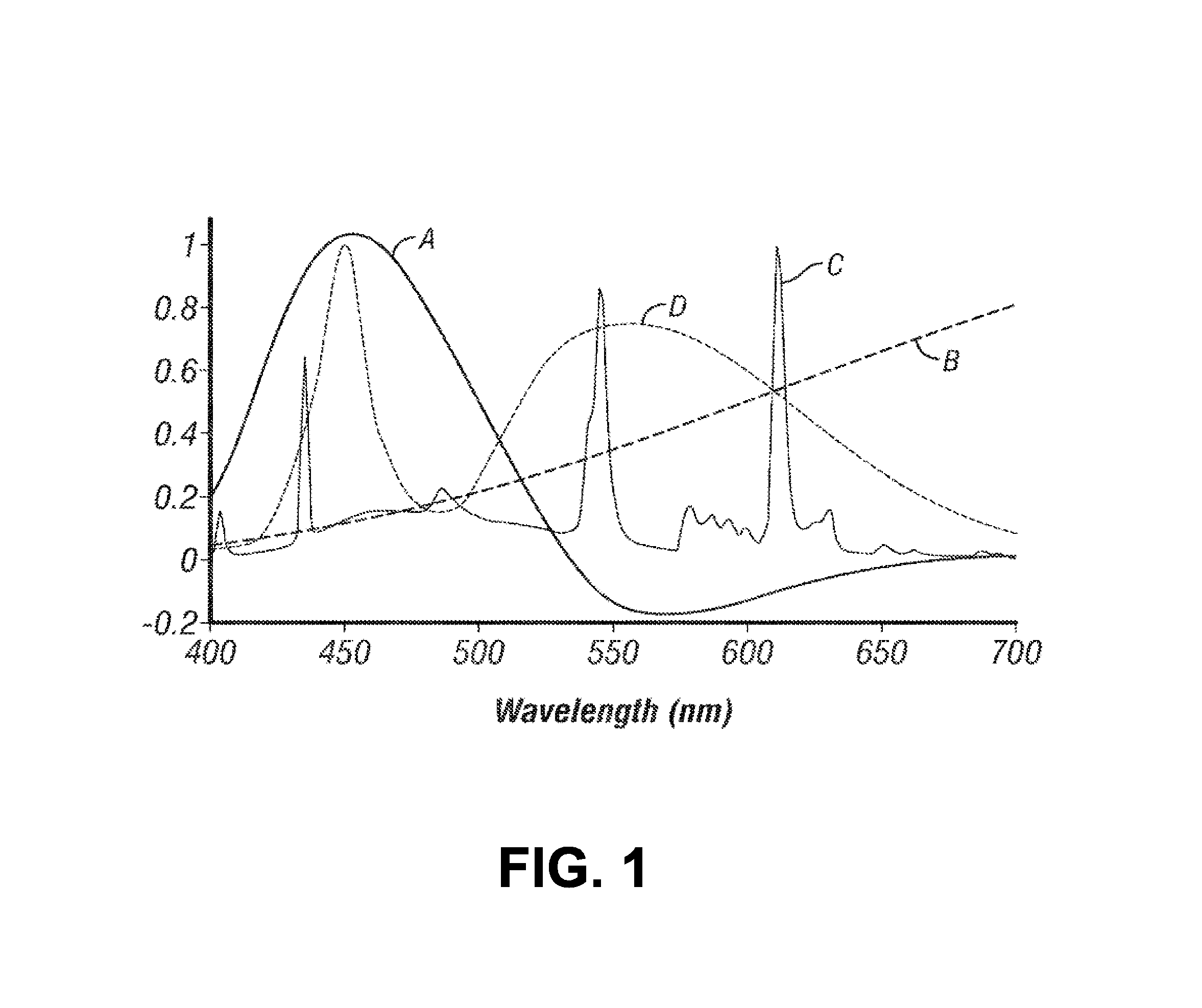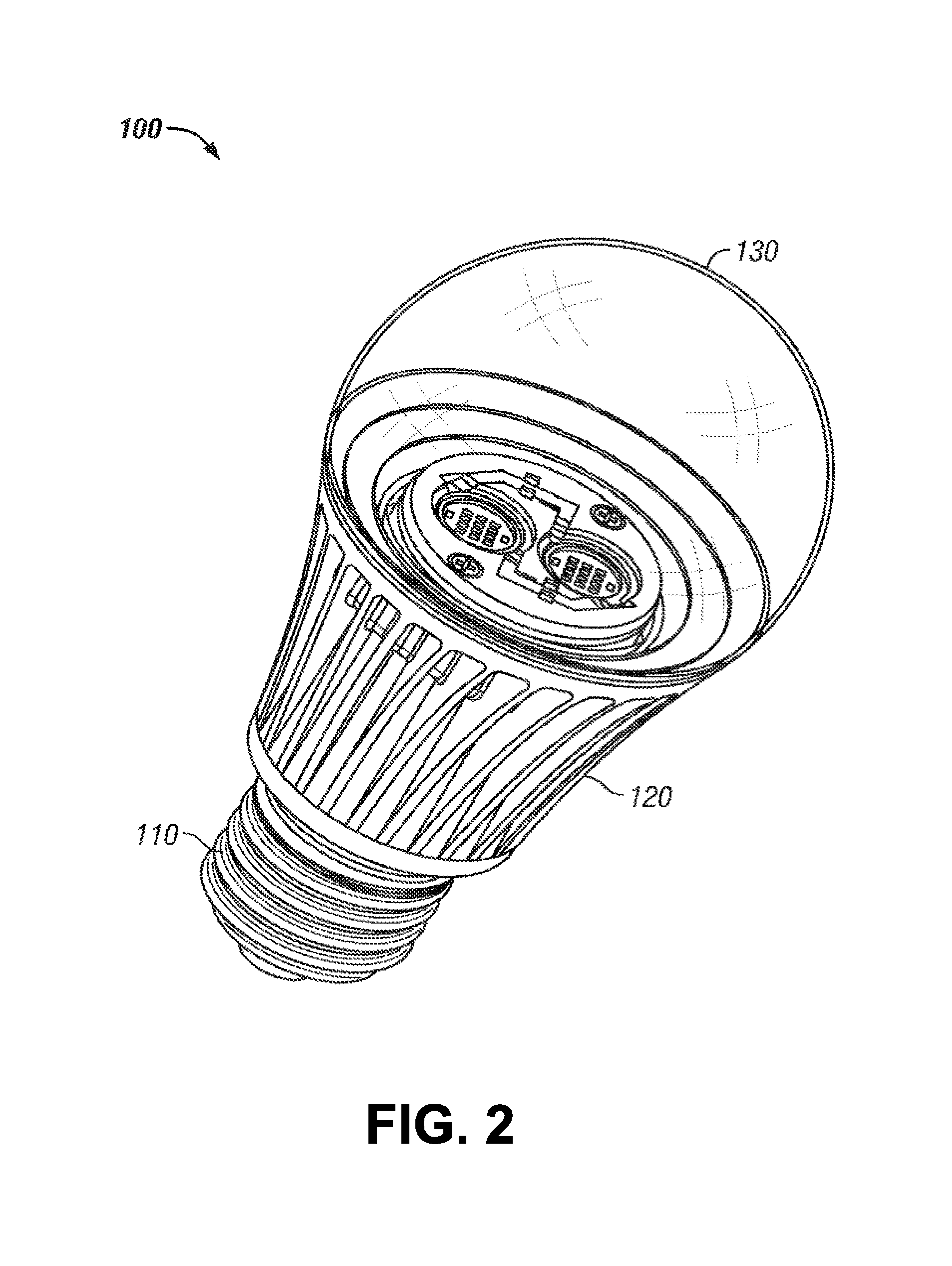Patents
Literature
Hiro is an intelligent assistant for R&D personnel, combined with Patent DNA, to facilitate innovative research.
229 results about "Spectral power distribution" patented technology
Efficacy Topic
Property
Owner
Technical Advancement
Application Domain
Technology Topic
Technology Field Word
Patent Country/Region
Patent Type
Patent Status
Application Year
Inventor
In radiometry, photometry, and color science, a spectral power distribution (SPD) measurement describes the power per unit area per unit wavelength of an illumination (radiant exitance). More generally, the term spectral power distribution can refer to the concentration, as a function of wavelength, of any radiometric or photometric quantity (e.g. radiant energy, radiant flux, radiant intensity, radiance, irradiance, radiant exitance, radiosity, luminance, luminous flux, luminous intensity, illuminance, luminous emittance).
Lighting system including photonic emission and detection using light-emitting elements
The present invention provides a system and method for generating light using light-emitting elements and detecting the intensity and spectral power distribution of light using the same light-emitting elements as spectrally sensitive photodetectors. The light-emitting elements function in two modes, an ON mode and an OFF mode, wherein in the ON mode the light-emitting elements are activated and emit light of a particular frequency or range of frequencies. When in the OFF mode, the light-emitting elements are deactivated, wherein they do not emit light but serve to detect photons incident upon them thus generating an electrical signal representative of the intensity and spectral power distribution of the incident photons. The detected signal from the deactivated light-emitting elements can be used to provide photonic feedback to a lighting system, and thereby may be used to control the brightness and color balance of the lighting system. In addition, the light-emitting elements may be arranged such that no spectrally selective filters or optics are necessary to block or focus light onto the light-emitting elements when in the detection or OFF mode.
Owner:SIGNIFY HLDG BV
Lighting system including photonic emission and detection using light-emitting elements
ActiveUS20060028156A1Electrical apparatusElectroluminescent light sourcesPhoton emissionPhotodetector
The present invention provides a system and method for generating light using light-emitting elements and detecting the intensity and spectral power distribution of light using the same light-emitting elements as spectrally sensitive photodetectors. The light-emitting elements function in two modes, an ON mode and an OFF mode, wherein in the ON mode the light-emitting elements are activated and emit light of a particular frequency or range of frequencies. When in the OFF mode, the light-emitting elements are deactivated, wherein they do not emit light but serve to detect photons incident upon them thus generating an electrical signal representative of the intensity and spectral power distribution of the incident photons. The detected signal from the deactivated light-emitting elements can be used to provide photonic feedback to a lighting system, and thereby may be used to control the brightness and colour balance of the lighting system. In addition, the light-emitting elements may be arranged such that no spectrally selective filters or optics are necessary to block or focus light onto the light-emitting elements when in the detection or OFF mode.
Owner:SIGNIFY HLDG BV
White light LED devices with flat spectra
A light emitting apparatus including a phosphor blend including two or more phosphors to provide an emission spectrum simulating the spectral power distribution of a CIE reference illuminant across at least a certain spectral range. Such an apparatus is particularly suited for color-critical applications.
Owner:GE LIGHTING SOLUTIONS LLC
Solid-state lamps with complete conversion in phosphors for rendering an enhanced number of colors
InactiveUS20090231832A1Quality improvementSpectral modifiersSemiconductor devicesDaylightLight-emitting diode
The invention relates to phosphor-conversion (PC) sources of white light, which are composed of at least two groups of emitters, such as ultraviolet (UV) light-emitting diodes (LEDs) and wide-band (WB) or narrow-band (NB) phosphors that completely absorb and convert the flux generated by the LEDs to other wavelengths, and to improving the color quality of the white light emitted by such light sources. In particular, embodiments of the present invention describe new 2-4 component combinations of peak wavelengths and bandwidths for white PC LEDs with complete conversion. These combinations are used to provide spectral power distributions that enable lighting with a considerable portion of a high number of spectrophotometrically calibrated colors rendered almost indistinguishably from a blackbody radiator or daylight illuminant, and which differ from distributions optimized using standard color-rendering assessment procedures based on a small number of test color samples.
Owner:SENSOR ELECTRONICS TECH
Lamp with adjustable color
ActiveUS20080297027A1Easy to controlDim and brighten lampDischarge tube luminescnet screensElectroluminescent light sourcesDaylightLength wave
A white-light electro-luminescent lamp having an adjustable spectral power distribution, including a first light-emitting element which emits light within each of three wavelength bands, 1) between 440 and 520 nm, 2) between 520 and 600 nm, and 3) between 600 and 680 nm. A second light-emitting element emits light within each of three wavelength bands, 1) between 440 and 520 nm, 2) between 520 and 600 nm, and 3) between 600 and 680 nm. A controller modulates the integrated spectral power of the light produced by the first and the second light-emitting elements such that the spectral power distribution of the light formed by combining the light produced by the modulated first and second light-emitting elements is substantially equal to a CIE standard daylight spectral power distribution for correlated color temperatures between 4000K-9500K.
Owner:GLOBAL OLED TECH
Light source comprising a light-excitable medium
InactiveUS20080106887A1Improve lighting qualityImprove optical qualityLight source combinationsPoint-like light sourceExcitable mediumSpectral power distribution
The present invention provides a light source having an improved output optical quality. In general, the light source comprises one or more light-emitting elements in each of at least a first, a second and a third colour. The combined spectral power distribution of these light-emitting elements generally defines a spectral concavity. The light source further comprises a light-excitable medium configured and disposed to absorb a portion of the light emitted by one or more of the light-emitting elements and emit light defined by a complementary spectral power distribution having a peak located within the concavity. By combining the spectral output of the light-emitting elements with the spectral output of the light-excitable medium, an optical quality of the light source is improved.
Owner:KONINKLIJKE PHILIPS ELECTRONICS NV
Lighting device with defined spectral power distribution
Solid state lighting devices and illumination methods involve use of multiple solid state emitters of different colored outputs (optionally including at least one white or near-white emitter). Operation of the solid state emitters is controlled with at least one circuit element to emphasize and / or deemphasize perception of at least one color of a target surface based upon a reflectance spectral distribution of the target surface. At least one emitter may have an associated passive or active filter; the filterable emitter and / or active filter may be operated to deemphasize perception of at least one color of a target surface. Activation and / or alteration of emphasis or deemphasis of perception of color of a target surface may be selected by a user or automatically controlled.
Owner:IDEAL IND LIGHTING LLC
Spectrum matching
InactiveUS20060018118A1Electrical apparatusElectroluminescent light sourcesFrequency spectrumMeasurement device
Light is generated in accordance with a desired spectral power distribution curve. A spectrum of light is generated with a plurality of different light sources. An optical measurement device measures the spectrum of light generated by the plurality of different light sources. The optical measurement device is able to detect light within the entire spectrum of light generated by the plurality of different light sources. The measured spectrum of light is used as feedback to vary the spectrum of light generated with the plurality of different light sources to approximate the desired spectral power distribution curve.
Owner:AVAGO TECH ECBU IP (SINGAPORE) PTE LTD
Color matching method, color matching apparatus and medium having a machine-readable product
InactiveUS6560358B1Optimum color appearanceReduce the numberImage enhancementDigitally marking record carriersColor imageSelf adaptive
Color matching method in which the color apparatus of a color image is adapted to be coincident between color image devices having significantly different reference whites with a small processing volume. From correlated color temperature of an originating reference white and a target reference white, spectral power distribution characteristics of an originating and a target color space are restored. Tristimulus values of the color in the target color space is obtained from the adaptive surface reflectance of the optional color, spectral power distribution characteristics of the target color space and the human color matching functions.
Owner:NEC CORP
Lamp with adjustable color
ActiveUS7759854B2Easy to controlDim and brighten lampDischarge tube luminescnet screensElectroluminescent light sourcesDaylightLength wave
A white-light electro-luminescent lamp having an adjustable spectral power distribution, including a first light-emitting element which emits light within each of three wavelength bands, 1) between 440 and 520 nm, 2) between 520 and 600 nm, and 3) between 600 and 680 nm. A second light-emitting element emits light within each of three wavelength bands, 1) between 440 and 520 nm, 2) between 520 and 600 nm, and 3) between 600 and 680 nm. A controller modulates the integrated spectral power of the light produced by the first and the second light-emitting elements such that the spectral power distribution of the light formed by combining the light produced by the modulated first and second light-emitting elements is substantially equal to a CIE standard daylight spectral power distribution for correlated color temperatures between 4000K-9500K.
Owner:GLOBAL OLED TECH
Systems and methods for optimizing power and control of a multicolored lighting system
ActiveUS20170019973A1Quick activationLight source combinationsElectrical apparatusElectricityEffect light
Embodiments of the present invention are related to a lighting system comprising a control unit that manages a lighting device with an LED board within an optical chamber. The LED board includes a first string of LEDs and a second string of LEDs. The control unit and the LED board are configured to electrically couple to first and second wires. The first string of LEDs and the second string of LEDs are configured to emit light having different spectral power distributions within the visible spectrum. The first string of LEDs is oriented in an electrically opposite direction than the second string of LEDs. The control unit comprises a switch configured to direct current between the first wire and second wire. The wire to which current is directed is designated active. The designated active wire activates one of the first string of LEDs and second string of LEDs.
Owner:LIGHTING SCI GROUP
Spectral analysis of intracardiac electrograms to predict identification of radiofrequency ablation sites
ActiveUS20100137861A1ElectrocardiographyComputer-aided planning/modellingRf ablationSpectral properties
A method and system for choosing suitable sites for catheter delivery ablative energy is provided that includes a catheter / ablation structure that is positioned on a potential ablation site on a heart. The catheter / ablation structure produces one or more electrograms recorded at the potential ablation site. A signal processing unit receives from the catheter / ablation structure the recorded one or more intercardiac electrograms from the potential ablation site and performing Fast Fourier Transform (FFT) on the recorded one or more intercardiac electrograms as so to produce one or more spectral power distributions of the potential ablation site. A display unit displays the one or more spectral power distributions so as to determine whether the potential RF ablation site exhibit necessary spectral properties for the delivery of the ablative energy. A ablative energy generator unit provides the ablative energy to the potential ablation site using the catheter / ablation structure.
Owner:SOROFF DANIEL +1
System and method for estimating physical properties of objects and illuminants in a scene using modulated light emission
InactiveUS6839088B2Improve performanceImage enhancementTelevision system detailsReflectance functionLight emission
Owner:THE BOARD OF TRUSTEES OF THE LELAND STANFORD JUNIOR UNIV
Polychromatic solid-state light sources for the control of colour saturation of illuminated surfaces
InactiveUS20140167646A1Electrical apparatusElectroluminescent light sourcesLuminophoreLight-emitting diode
Polychromatic light sources of white light are composed of at least two different coloured emitters, such as groups of light-emitting diodes (LEDs). Disclosed are the spectral power distributions and relative partial radiant fluxes of the coloured emitters that allow controlling the colour saturating ability of the generated light, namely, the ability to render colours with increased saturation and the ability to render colours with decreased saturation. Also disclosed is a method for dynamical tailoring the colour saturating ability of the generated light.
Owner:VILNIUS UNIV
Solid-state lighting of a white light with tunable color temperatures
ActiveUS8358089B2Reduce dependenceImprove distributionLight source combinationsPoint-like light sourceSmart lightingPlanckian locus
Owner:ALEDDRA INC
Lighting device with defined spectral power distribution
Solid state lighting devices and illumination methods involve use of multiple solid state emitters of different colored outputs (optionally including at least one white or near-white emitter). Operation of the solid state emitters is controlled with at least one circuit element to emphasize and / or deemphasize perception of at least one color of a target surface based upon a reflectance spectral distribution of the target surface. At least one emitter may have an associated passive or active filter; the filterable emitter and / or active filter may be operated to deemphasize perception of at least one color of a target surface. Activation and / or alteration of emphasis or deemphasis of perception of color of a target surface may be selected by a user or automatically controlled.
Owner:IDEAL IND LIGHTING LLC
Adjustable full spectrum LED (light-emitting diode) light source device for plant growth
InactiveCN102630511AGrowth intelligencePromote growthPoint-like light sourceElectric circuit arrangementsEngineeringGreen-light
The invention discloses an adjustable full spectrum LED (light-emitting diode) light source device for the plant growth, and relates to a semiconductor solid state lighting source. A power supply of the invention supplies power for a control system and a drive circuit, and is controlled by the control system; the control system provides intelligent control for data input, data output, operation processing, storage and clock, provides data for light adjusting for the drive circuit, and input the basis data for adjusting the spectral power distribution of the light source, the photon flux intensity and the photoperiod from exterior into a storage inside the control system; the drive circuit provides steady direct current or pulse width modulation power supply for an illuminant; the basic unit of the illuminant is composed of a plurality of UV (ultraviolet) -B, UV-A, blue light, green light, yellow light, red light and far-red light LEDs. The adjustable full spectrum LED light source device has the full spectrum lighting condition required by the plant growth, also the spectral power distribution, the photon flux intensity and the photoperiod can be adjusted according to different requirements on light source of different plants in different growth phases, so that the best lighting condition is provided for the plant growth.
Owner:TONGFANG OPTO ELECTRONICS
Solid-state lighting of a white light with tunable color temperatures
ActiveUS20110273107A1Alleviates thermal dependenceBroaden spectral power distributionLight source combinationsPoint-like light sourceSmart lightingPlanckian locus
A light-emitting diode (LED)-based solid-state device comprises a color mixing mechanism to dynamically change the correlated color temperature (CCT) of a white light. With different lumen proportions for white phosphor-coated LEDs and integrated red and green LEDs, the light mixtures can be located in any one of eight CCT quadrangles. In practice, CCTs of a white-light can be tuned in a continuous manner. Because all the possible light mixtures on the chromaticity diagram correspond to a line segment that overlays the Planckian locus within the eight CCT tolerance quadrangles, the effect of LED intensity fluctuations that may put the mixture out of white light region is reduced. Also, because the two additional LEDs that mix with the white phosphor-coated LEDs contribute to the overall spectral power distribution (SPD) that substantially matches the SPD of standard illuminants, a CRI of 80 can be reached.
Owner:ALEDDRA INC
Solid-state lamps with partial conversion in phosphors for rendering an enhanced number of colors
ActiveUS20090261710A1Quality improvementDischarge tube luminescnet screensLamp detailsDaylightPeak value
The invention relates to phosphor-conversion (PC) sources of white light, which are composed of at least two groups of emitters, such as blue electroluminescent light-emitting diodes (LEDs) and wide-band (WB) or narrow-band (NB) phosphors that partially absorb and convert the flux generated by the LEDs to other wavelengths, and to improving the quality of the white light emitted by such light sources. In particular, embodiments of the present invention describe new 3-4 component combinations of peak wavelengths and bandwidths for white PC LEDs with partial conversion. These combinations are used to provide spectral power distributions that enable lighting with a considerable portion of a high number of spectrophotometrically calibrated colors rendered almost indistinguishably from a blackbody radiator or daylight illuminant, and which differ from distributions optimized using standard color-rendering assessment procedures based on a small number of test samples.
Owner:SENSOR ELECTRONICS TECH
Reflectance spectrum reconstruction method based on iterative threshold method
InactiveCN103528968AImprove rebuild efficiencyImprove reconstruction accuracyColor/spectral properties measurementsPrincipal component analysisReconstruction method
A reflectance spectrum reconstruction method based on an iterative threshold method includes the following steps that principal component analysis is carried out on a training sample set to obtain primary function vectors of the training sample set, and first three primary function vectors are chosen according to the contribution rate to serve as reconstruction primary function vectors; a standard illuminant and a common RGB camera are adopted to obtain RGB tri-stimulus values of a multi-spectral test image, and by means of a conversion matrix, CIE1931 standard colorimetric observer spectral tri-stimulus values are obtained; according to the obtained primary function vectors of the training sample set, CIE1931XYZ tri-stimulus values of the multi-spectral test image, a CIE1931 standard colorimetric observer color matching function and relative spectral power distribution of the standard illuminant, a reflectivity spectral image of the multi-spectral test image is reconstructed by the adoption of the iterative threshold method.
Owner:UNIV OF SHANGHAI FOR SCI & TECH
Dynamic light recipe for horticulture
InactiveUS20160088802A1Improve controlImprove fine tune morphologyRoot feedersElectrical apparatusDaylightGrow light
A lighting system and method for the growing of a plant seedling is disclosed, including at least one light source (30) for illuminating the plant seedling (39) with grow light during growth stages of the plant seedling growth process, and a controller for the controlling the spectral power distribution of the grow light emitted from the light source (30) such that the grow light in at least some growth stages of the plant seedling growth process comprises more energy in the blue wavelength range than in other growth stages of the plant seedling growth process. In use cases where the grow light is supplementing available daylight, an additional sensor (33) may be used to measure the amount and spectral composition of daylight and control the grow light such that spectral power distribution of total light received by the plant seedling is controlled accordingly.
Owner:SIGNIFY HLDG BV
Light source apparatus
ActiveUS20100157573A1Prevent suppression of melatoninGood color propertiesLight source combinationsDischarge tube luminescnet screensLength wavePeak intensity
A light source apparatus includes a first light emitter, a second light emitter, and a third light emitter. The first light emitter has a peak wavelength within the range from 600 nm to 660 nm and a wavelength range at half peak intensity wider than the range from 600 nm to 660 nm, the second light emitter has a peak wavelength within the range from 530 nm to 570 nm and a wavelength range at half peak intensity wider than the range from 530 nm to 570 nm, and the third light emitter which a peak wavelength is 420 nm-470 nm in a spectral power distribution thereof.
Owner:PANASONIC CORP
Tunable LED lamp for producing biologically-adjusted light
Owner:HEALTHE INC
System and method for scene image acquisition and spectral estimation using a wide-band multi-channel image capture
InactiveUS7554586B1Accurate spectral estimationGood colorTelevision system detailsSpectrum investigationSpectral transmittanceMultispectral image
A system and method for multi-spectral image capture of a first scene includes acquiring a first series of images of the first scene with one or more image acquisition systems and filtering each of the first series of images of the scene with a different non-interference filter, illuminating each image of the first series of images with a different illuminant, or acquiring each of the images of the first series of images with a different image acquisition system. Each of the image acquisition systems has at least one color channel, each of the non-interference filters has a different spectral transmittance, and each of the illuminants has a different spectral power distribution.
Owner:ROCHESTER INSTITUTE OF TECHNOLOGY
LED lighting quality evaluation method based on objective and subjective experiment data and system
InactiveCN105136432AGuaranteed to be scientificGuarantee the accuracy of evaluationTesting optical propertiesSpectroradiometerEffect light
The invention provides an LED lighting quality evaluation method based on objective and subjective experiment data and a system. The method comprises the steps that subjective experiment data acquired from a preset LED lighting evaluation angle for light emitting samples are input; the subjective score mean of each group of light emitting sample is counted; for each group of light emitting sample, a spectroradiometer is used to measure spectral power distribution; data in a visible wavelength range are intercepted; objective evaluation indicators are calculated; a multiple nonlinear fitting method is used to construct an association model between the subjective score mean and a corresponding objective evaluation indicator under different light emitting sample conditions; for a light emitting sample to be evaluated, the spectroradiometer is used to measure the spectral power distribution; the data in the visible wavelength range are intercepted; the objective evaluation indicator is calculated; a corresponding score estimation value is acquired based on the association model; and the lighting quality of a light source is characterized. The LED lighting quality evaluation method provided by the invention has the advantages of flexible and targeted use, accurate evaluation and easy implementation.
Owner:WUHAN UNIV
Four-color LED light mixing method based on visible light communication
ActiveCN104053278ASpectrum richColor temperature adjustablePoint-like light sourceElectric lightingColor rendering indexSpectrograph
The invention discloses a four-color LED light mixing method based on visible light communication. The method comprises the steps that spectral power distribution of all monochromatic light is obtained through a spectrograph, and the tristimulus value of each corresponding monochromatic light is calculated; the target color temperature of mixed light is determined, and a corresponding reference light source is selected and used for obtaining the tristimulus value of a mixed color; according to the color addition principle, the sum of the tristimulus values of all the monochromatic light should be equal to the tristimulus value of the mixed color, and a color mixing equation set is obtained; the spectral power distribution of the mixed light can be obtained according to the light mixing coefficient of all the monochromatic light in the color mixing equation set, and the color rendering index Ra of the mixed light is calculated according to the spectral power distribution of the mixed light, wherein Ra is larger than or equal to epsilon; the range of the channel capacity C of the mixed light is calculated, and the maximum capacity Cmax is solved within the range; the ratio of all the colored light with the maximum capacity is output.
Owner:SOUTHEAST UNIV
Protective lighting method
PendingUS20190247675A1Electrical apparatusElectroluminescent light sourcesRefractive errorIlluminance
The present application is directed to a method for the regulation of the development of ocular refractive errors, comprising: controlling at least one light source using a processor, the at least one light source emitting an electromagnetic radiation variable with respect to one or more of a direction, an illuminance, a retinal area, an amplitude, a wavelength, and a spectral output; and regulating the at least one light source and producing a spectral power distribution at a plane of an eye.
Owner:MYOLITE
Device and Method for Generating Light of a Predetermined Spectrum with at Least Four Differently Colored Light Sources
ActiveUS20140055038A1Simple designMaximizes a calculated weighting criterionElectrical apparatusElectroluminescent light sourcesLimit valueColored light
A lighting device and method with a lighting unit which includes several light sources having different color spectra, with a sensor for determining the spectral power distribution emitted by the lighting unit, with a control unit which, as a function of a predetermined spectral power distribution as well as of the spectral power distribution measured by the sensor, acts on a drive unit which individually energizes the light sources of the lighting unit, so that the emitted light has predetermined spectral power distribution, wherein the lighting unit includes at least four light sources, and the control unit uses an optimization algorithm which, as an optimization goal, maximizes a coefficient of weighted sensor values, the coefficient being calculable from individual drive data of the light sources. A secondary condition is met when error between the predetermined spectral power distribution and the measured spectral power distribution is smaller than a limit value.
Owner:AIRBUS DEFENCE & SPACE
Projector with spectral filter
A projector projects pixels to form an image in accordance with image data. The projector includes a modulator which modulates light from a light source and outputs projected pixels in a plurality of color spectral bands. The projector has a light source with a non-uniform spectral power distribution with spectral energy within each of the plurality of color spectral bands. A first notch filter removes spectral energy from a first spectral range within a first color spectral band to improve gamut.
Owner:HEWLETT PACKARD DEV CO LP
Tunable LED lamp for producing biologically-adjusted light
A tunable LED lamp for producing biologically-adjusted light having a housing, a power circuit, a driver circuit disposed within the housing and electrically coupled with the power circuit, and a plurality of LED dies electrically coupled to and driven by the driver circuit. The driver circuit may drive the plurality of LED dies to emit a phase-shift light having a first spectral power distribution, a general illuminating light having a second spectral power distribution, and a pre-sleep light having a third spectral power distribution. The phase-shift light may be configured to affect a first biological effect in an observer, and the pre-sleep light may be configured to affect a second biological effect in an observer. The LED lamp may include an intermediate base to couple the lamp to an Edison screw base. The LED lamp may be configured to operate responsive to a three-way switch.
Owner:HEALTHE INC
Features
- R&D
- Intellectual Property
- Life Sciences
- Materials
- Tech Scout
Why Patsnap Eureka
- Unparalleled Data Quality
- Higher Quality Content
- 60% Fewer Hallucinations
Social media
Patsnap Eureka Blog
Learn More Browse by: Latest US Patents, China's latest patents, Technical Efficacy Thesaurus, Application Domain, Technology Topic, Popular Technical Reports.
© 2025 PatSnap. All rights reserved.Legal|Privacy policy|Modern Slavery Act Transparency Statement|Sitemap|About US| Contact US: help@patsnap.com
